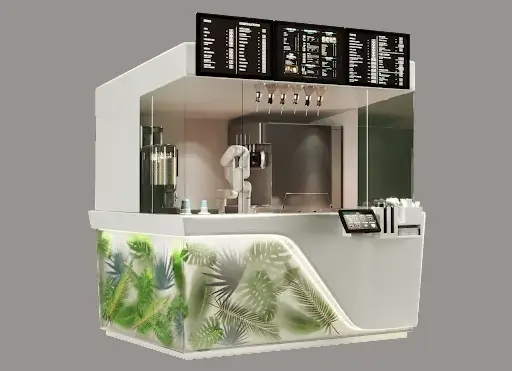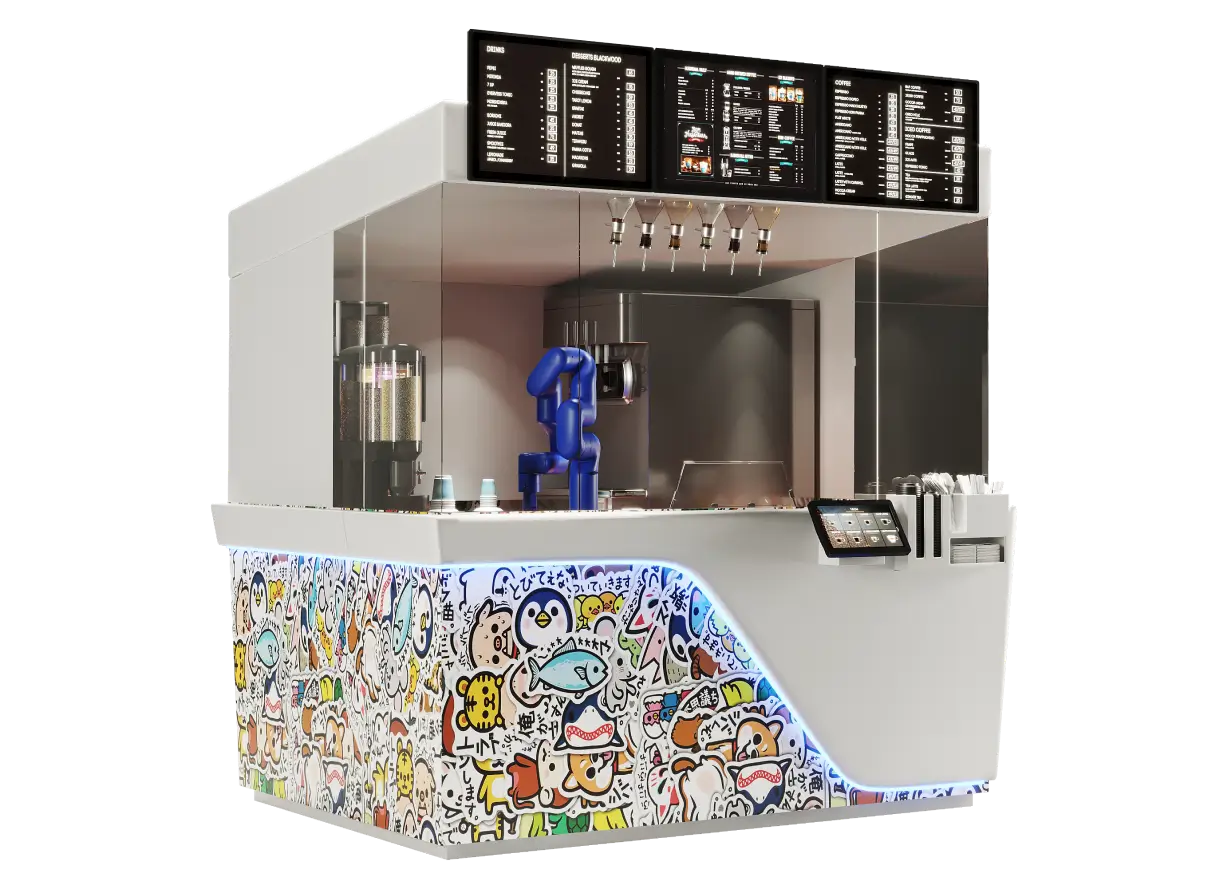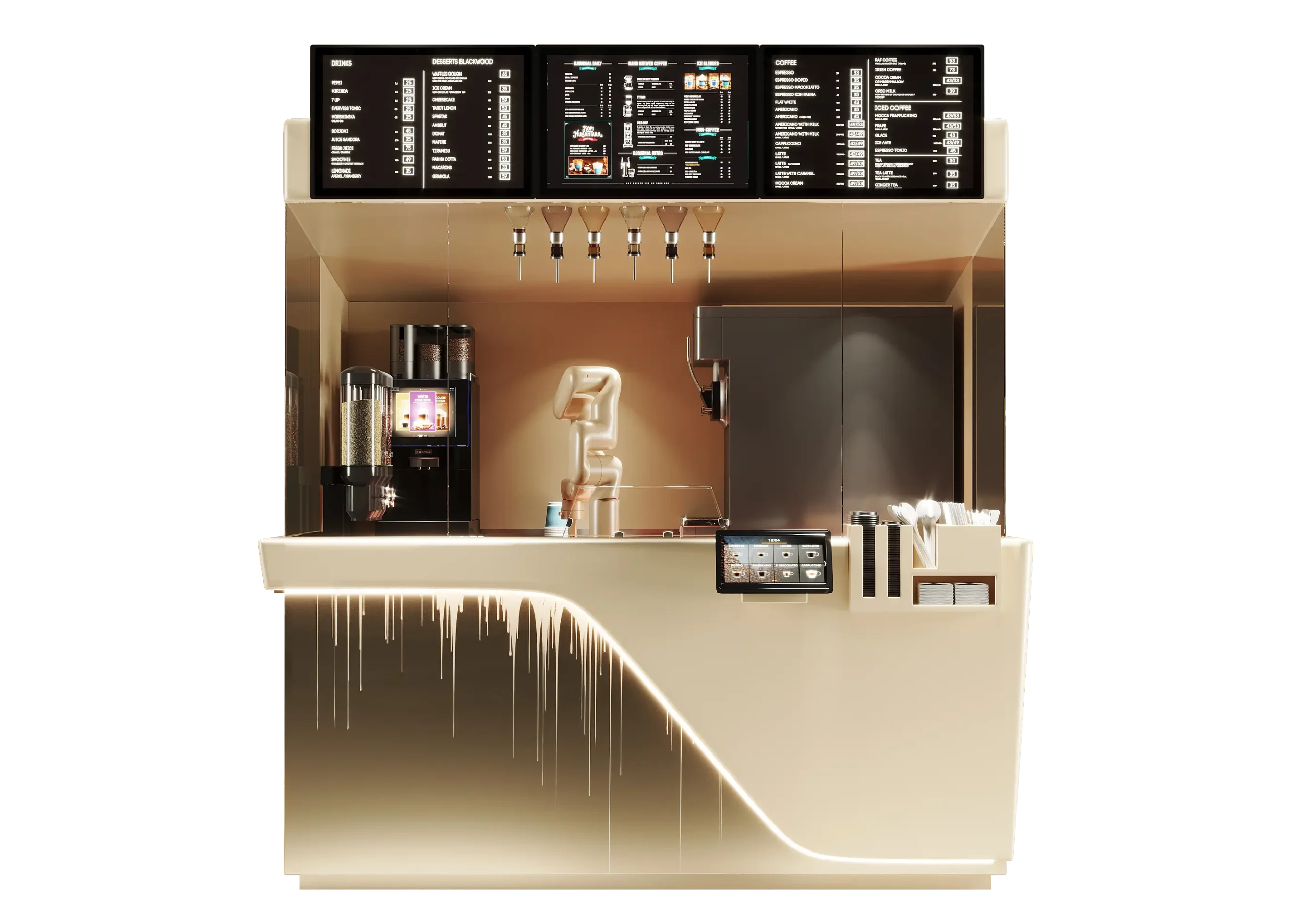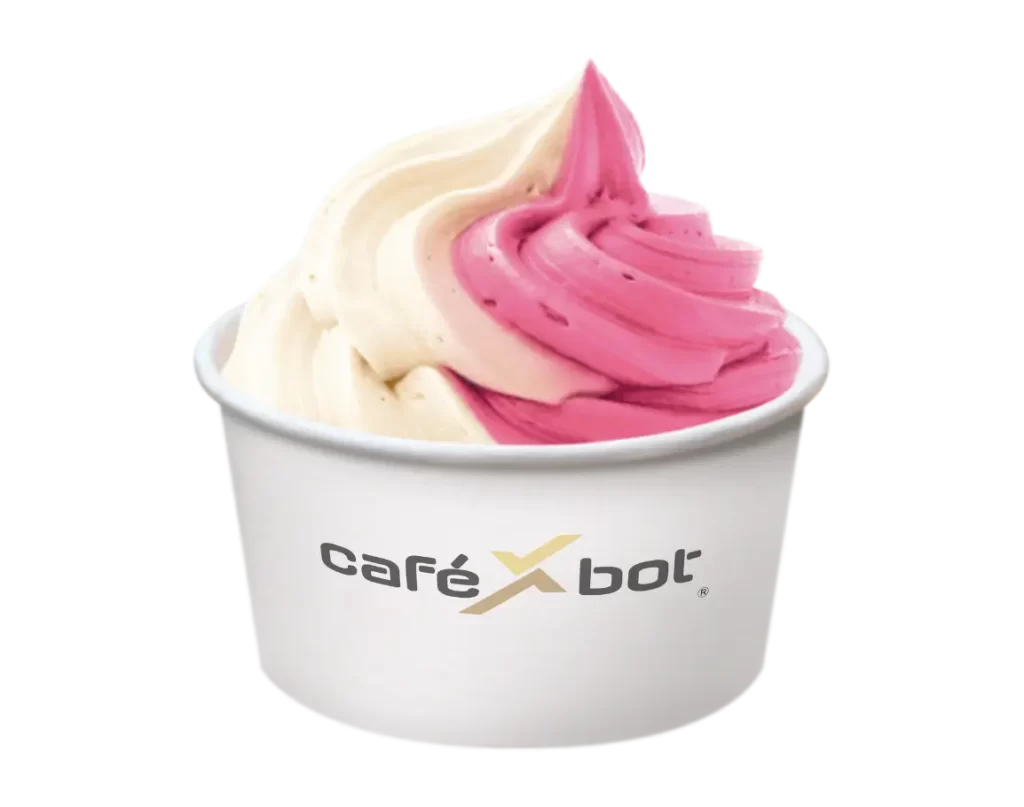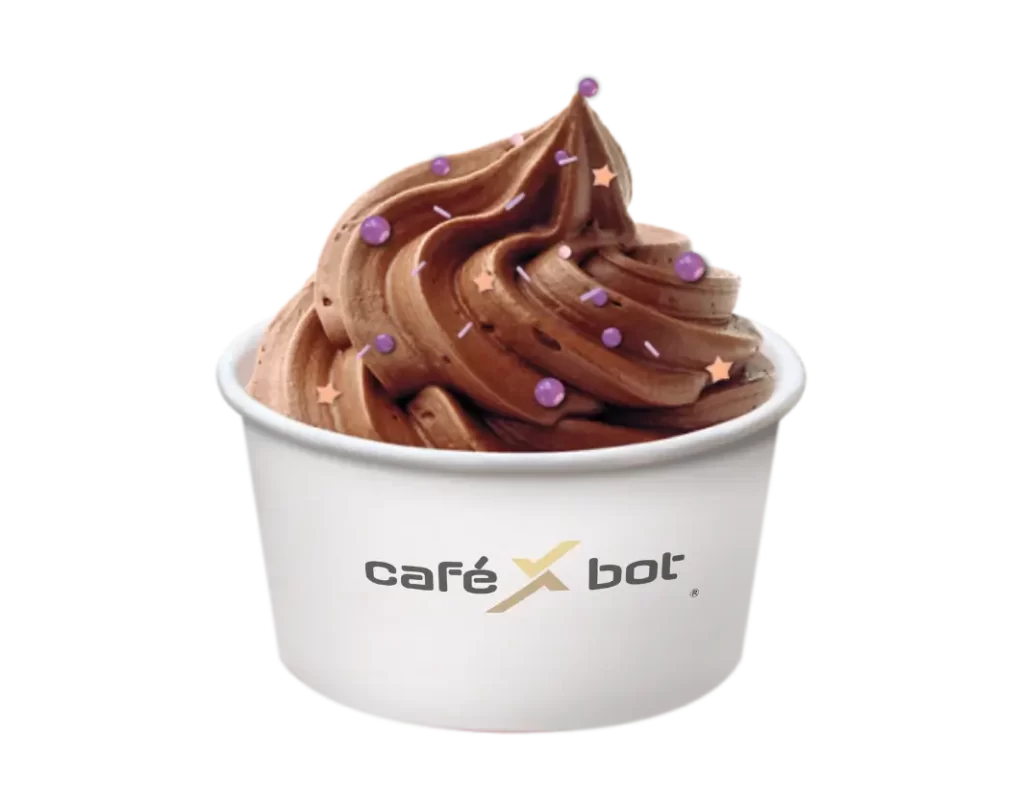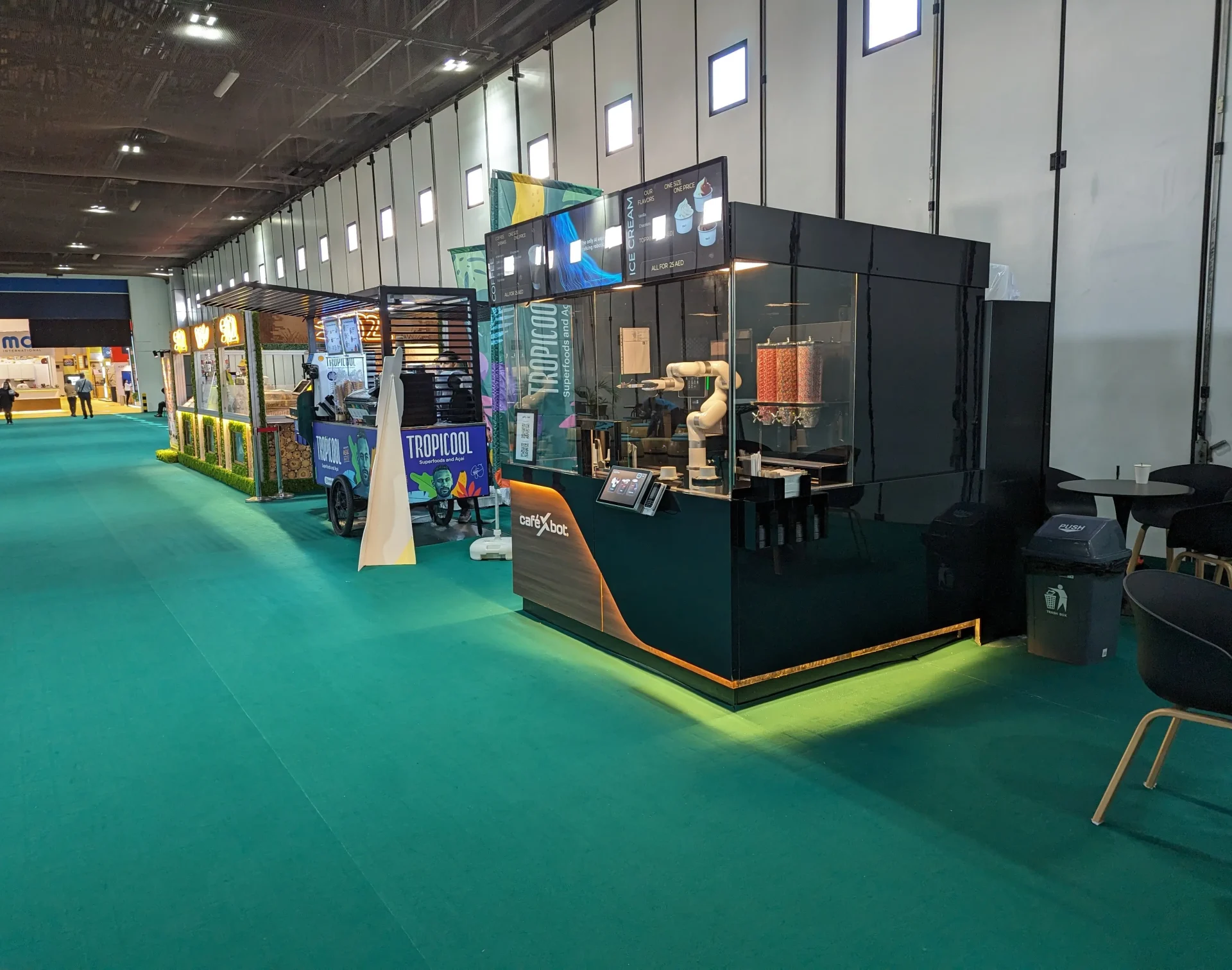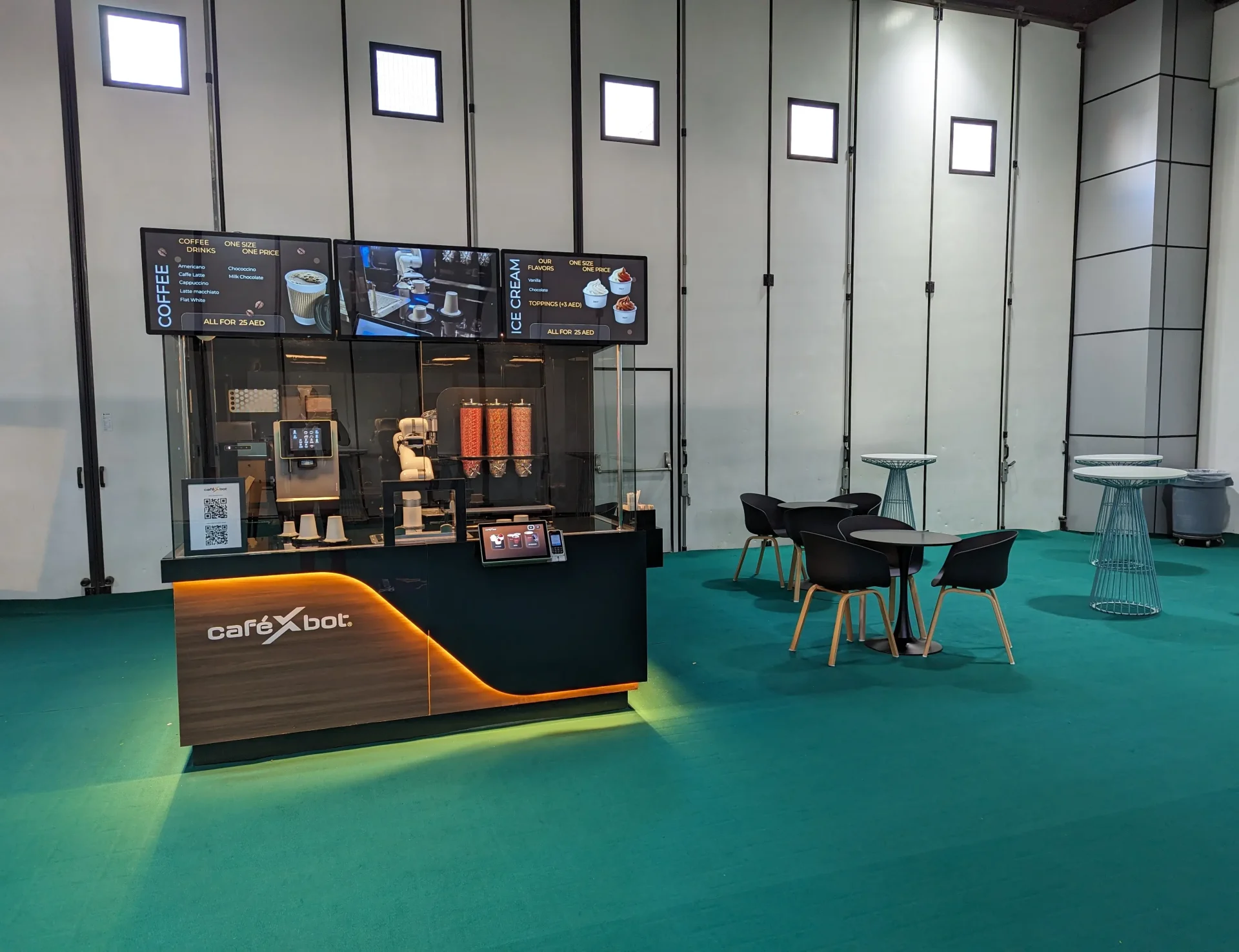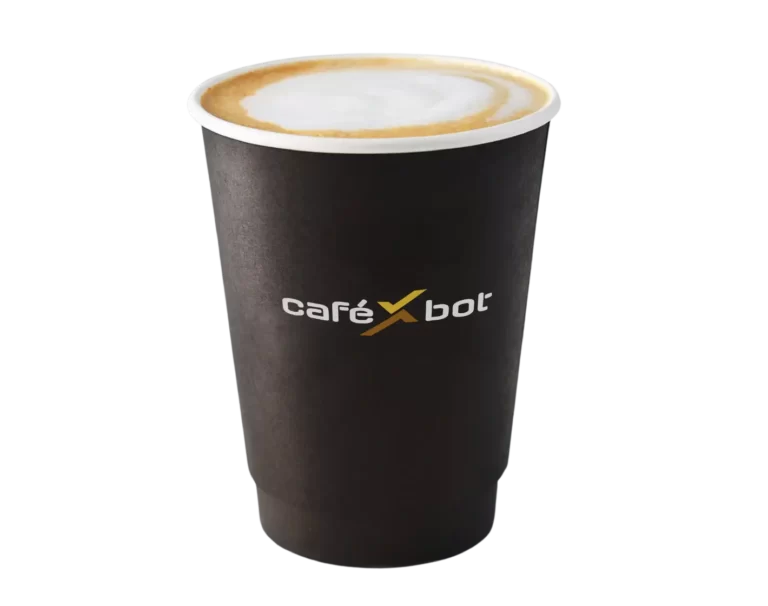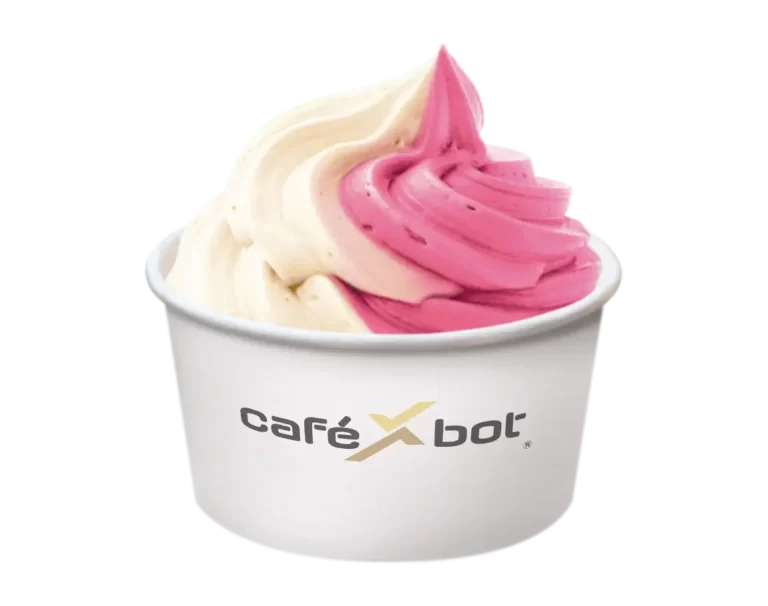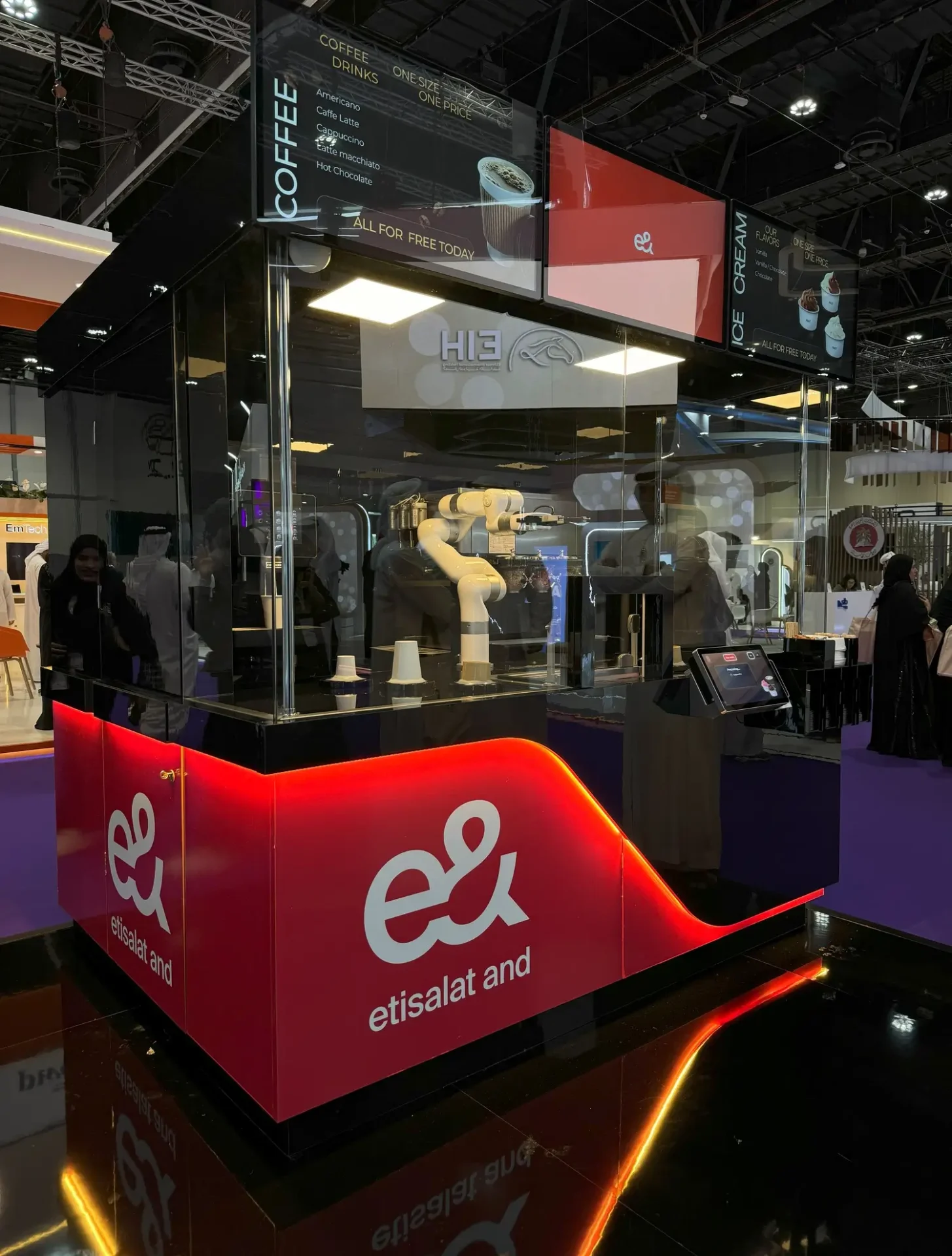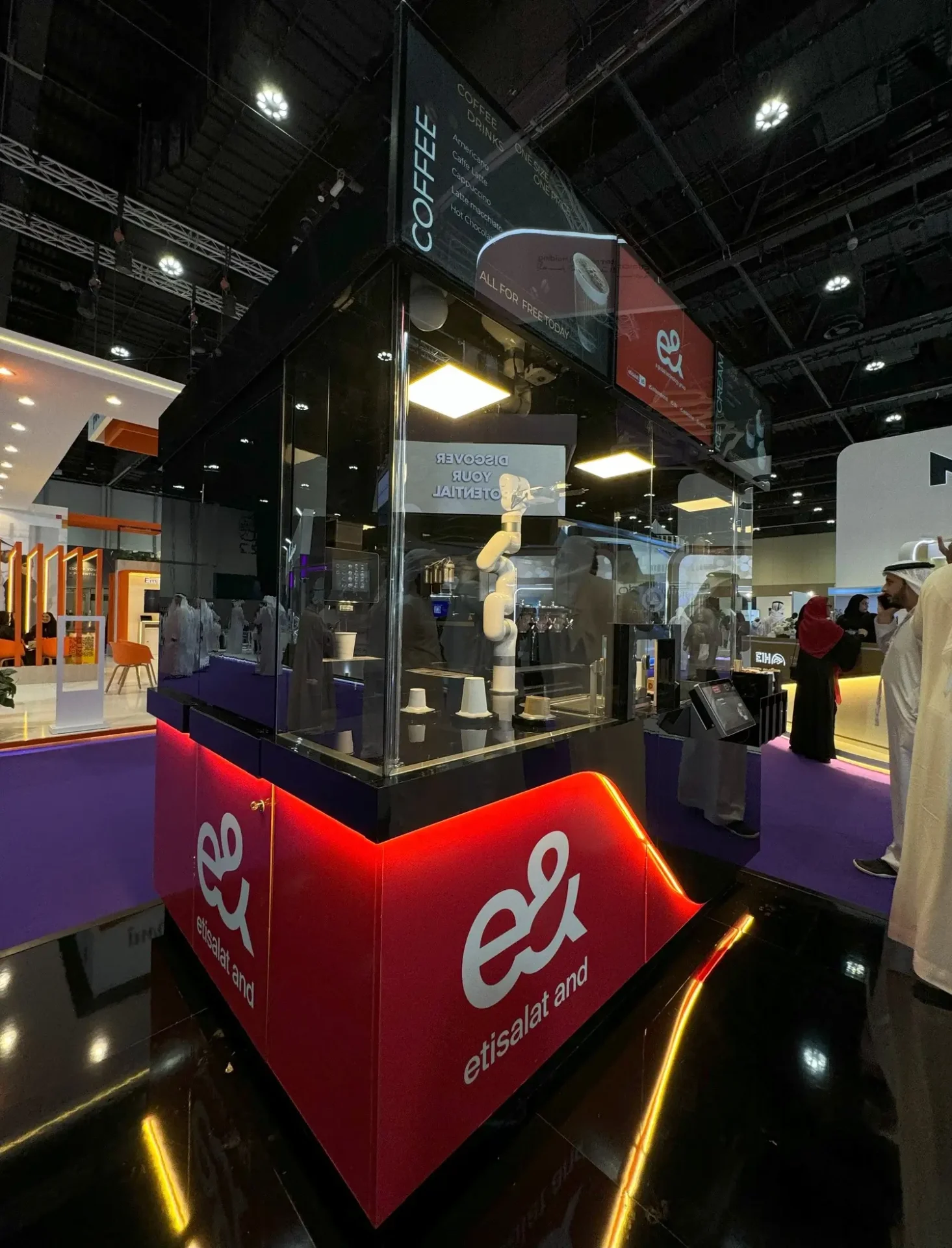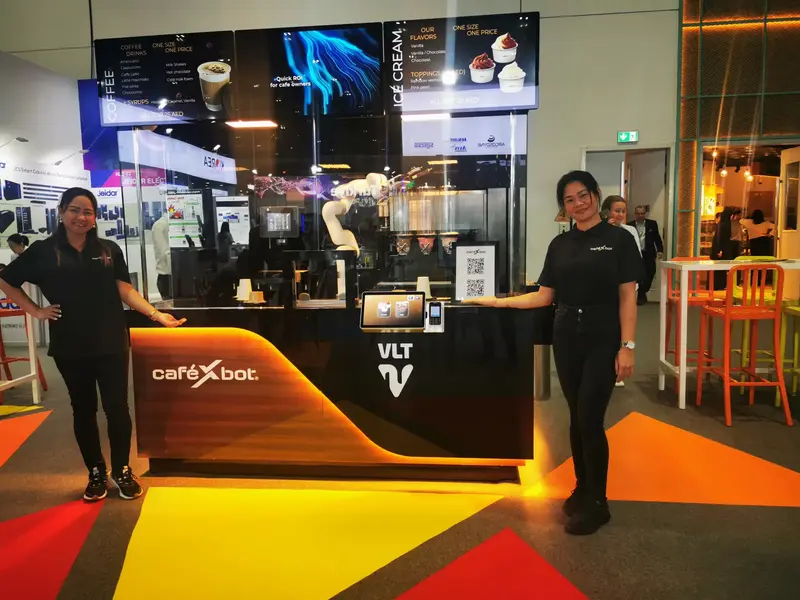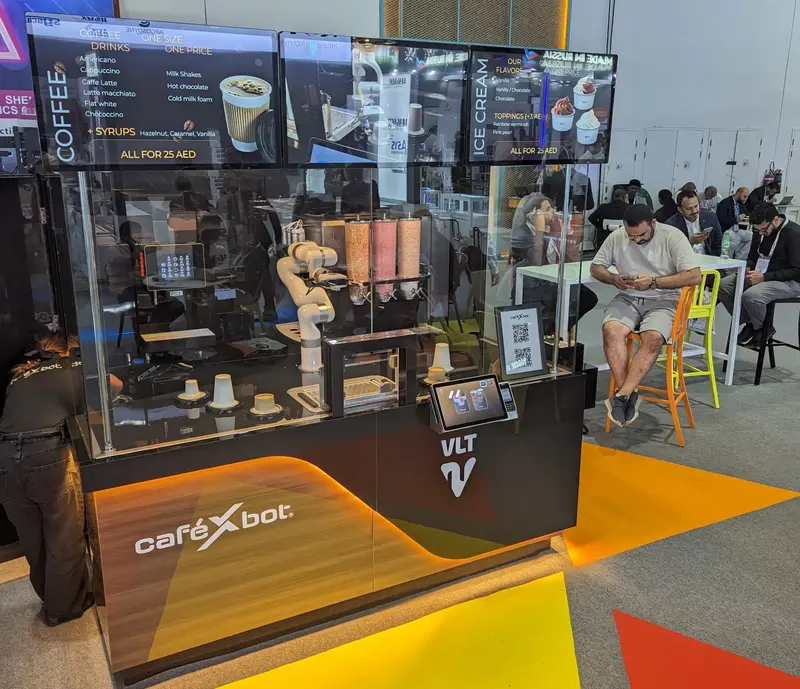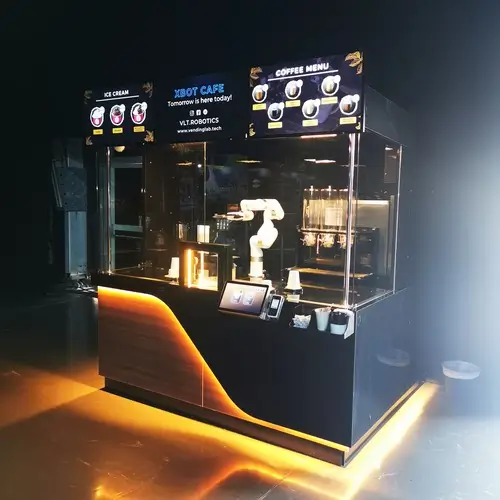Vous envisagez de créer une entreprise en 2026 ? Que vous vous lanciez à fond ou que vous commenciez une activité secondaire, cette liste d'idées d'entreprises regorge d'opportunités intelligentes et prêtes pour l'avenir. Qu'il s'agisse de startups axées sur l'IA ou de modèles de services à faibles frais généraux, chaque idée ci-dessous est conçue pour obtenir des résultats concrets. Explorez les catégories, trouvez votre bonheur et créez votre propre entreprise, car la meilleure est celle qui correspond à votre passion et qui résout un problème réel.
Faites correspondre vos idées d'entreprise à vos compétences et à votre expérience
Avant de vous lancer dans une idée d'entreprise, examinez attentivement vos points forts actuels, votre expérience passée et vos intérêts personnels. Si vous êtes graphiste, proposer des services d'image de marque ou lancer une boutique de produits numériques pourrait être une étape naturelle. Vous aimez les animaux ? Une entreprise mobile de toilettage pour animaux pourrait vous convenir. Les meilleures idées d'entreprise correspondent non seulement à ce que vous savez faire, mais aussi à ce qui vous passionne. Et n'oubliez pas de vérifier si des licences, des permis ou des certifications spéciales sont nécessaires avant de vous lancer.
Choisissez des idées d'entreprise qui correspondent à votre style de vie et à vos objectifs
Votre parcours professionnel commence par une grande question : Cherchez-vous à obtenir un revenu supplémentaire ou à créer une entreprise à temps plein ? Certaines idées d'entreprise figurant sur cette liste peuvent être gérées en quelques heures par semaine, tandis que d'autres nécessitent plus de temps et de capital pour être développées. Définissez clairement vos objectifs financiers, le temps dont vous disposez et votre tolérance au risque. Tenez compte des coûts de démarrage, du potentiel de revenus récurrents et de la rapidité avec laquelle vous pouvez atteindre la rentabilité. Cette clarté vous aidera à choisir l'idée qui correspond vraiment à votre style de vie.
Idées d'entreprises basées sur la technologie et l'IA

Ces idées d'entreprises exploitent des technologies de pointe telles que l'IA, les appareils intelligents, l'automatisation et l'apprentissage automatique. Les entreprises énumérées ci-dessous se concentrent sur l'innovation, l'efficacité et la préparation à l'avenir - parfaites pour les fondateurs férus de technologie qui cherchent à résoudre des problèmes modernes.
1. Ouvrir un café robotisé
Qu'est-ce que c'est ?
Parmi les idées d'entreprise les plus futuristes en 2026, l'ouverture d'un café robotisé consiste à mettre en place une station de café entièrement automatisée où des robots s'occupent de la préparation des boissons, de la commande à la livraison. Le café fonctionne sans personnel humain, offrant aux clients une expérience interactive et sans contact, grâce à la robotique et à l'IA.
Pourquoi ça marche en 2026 :
À l'heure où l'automatisation se généralise, les cafés robotisés résolvent simultanément trois problèmes : l'augmentation du coût de la main-d'œuvre, la demande de nouveauté des consommateurs et la disponibilité 24 heures sur 24 et 7 jours sur 7. Ces idées commerciales se développent dans les aéroports, les centres commerciaux, les parcs technologiques et les universités - des lieux où la rapidité et l'innovation sont importantes. Sur des marchés comme Dubaï et Singapour, les cafés robotisés génèrent déjà une forte fréquentation avec un minimum d'opérations, ce qui en fait l'une des idées commerciales les plus durables pour les lieux très fréquentés.
Outils ou plates-formes à utiliser :
- CafeXbot (https://vendinglab.tech/) : Une solution de café robotisé éprouvée et entièrement développée, installée dans de nombreux pays.
- Intégration intelligente des points de vente comme Square ou Stripe Terminal pour des paiements transparents
- Intégrations télémétriques (des rapports mobiles sur tous les produits consommables sont disponibles auprès du producteur pour surveiller plusieurs cafés en même temps en moins de temps)
Coût de démarrage :
Élevé - prévoir un investissement initial de $80,000 à $125,000, en fonction de la configuration du modèle, de la personnalisation du kiosque et de la location de l'emplacement. Cependant, ces idées commerciales atteignent souvent un retour sur investissement de 100%+ dans les 12 à 18 mois dans des endroits stratégiques en raison du volume élevé de transactions quotidiennes et des faibles coûts de personnel.
Qui devrait commencer ?
Cette idée d'entreprise est parfaite pour les entrepreneurs, les investisseurs en franchise ou les opérateurs de F&B qui cherchent à introduire une automatisation intelligente dans leurs portefeuilles. Elle est également idéale pour les chefs d'entreprise férus de technologie qui se lancent dans le secteur de l'hôtellerie et de la restauration avec un minimum de main-d'œuvre.
Conseil de démarrage rapide :
Identifier un lieu à forte fréquentation où l'automatisation est perçue comme une nouveauté (université, aéroport, parc d'attractions ou centre commercial haut de gamme). Obtenir un bail pour une unité avec une bonne visibilité. Travailler avec un fournisseur comme CafeXbot pour installer le kiosque. Étudier l'idée de lancer une campagne de fidélisation - par exemple, des cartes de personnage ou des récompenses sous forme de boissons gratuites - afin de générer du trafic et des ventes récurrentes. À la différence des cafés traditionnels, les cafés robotisés peuvent fonctionner en continu, sans roulement, de sorte que vos prix et vos offres doivent être axés sur la rapidité, la personnalisation et l'attrait technologique.
2. Services de rédaction de contenu pour l'IA
Qu'est-ce que c'est ?
Les services de rédaction de contenu par IA font partie des idées commerciales à la croissance la plus rapide en 2026, permettant aux individus ou aux agences de générer du contenu écrit de haute qualité à l'aide d'outils d'IA. Ces services s'adressent aux entreprises qui ont besoin de blogs SEO, de descriptions de produits, de lettres d'information ou de textes publicitaires à grande échelle, mais sans avoir à embaucher des rédacteurs internes coûteux.
Pourquoi ça marche en 2026 :
La demande de contenu est montée en flèche dans les secteurs du commerce électronique, du SaaS, de l'immobilier et des marques personnelles. Cependant, la plupart des petites entreprises n'ont pas les moyens de se payer des rédacteurs à temps plein. Ces idées commerciales résolvent ce problème en utilisant l'IA pour fournir un contenu optimisé en quelques heures au lieu de quelques jours. Avec l'essor de GPT-4, Jasper et d'autres modèles avancés, la génération de contenu est non seulement rapide mais aussi de plus en plus proche de l'humain, ce qui en fait un modèle de revenu rentable et récurrent pour les rédacteurs comme pour les spécialistes du marketing.
Outils ou plates-formes à utiliser :
- ChatGPT (pour les articles conversationnels, le contenu des sites web et les messages sociaux)
- NeuronWriter ou Surfer SEO (pour l'optimisation du référencement sur la page et les contours pilotés par la PNL)
- Grammarly Premium (pour l'affinement de la grammaire et la cohérence du ton)
- En option : Notion AI ou Contenu à l'échelle s'il s'agit de proposer aux agences des lots de contenus en grande quantité
Coût de démarrage :
Faible - moins de $100/mois. La plupart des outils proposent des forfaits abordables et vous pouvez commencer avec un simple ordinateur portable et une connexion internet. Vous n'avez pas besoin d'une grande équipe ou d'un bureau pour commencer à monétiser ces idées commerciales.
Qui devrait commencer ?
Idéal pour les indépendants, les spécialistes du marketing numérique, les assistants virtuels ou les propriétaires d'agences. Il s'agit également d'une option intelligente pour les personnes ayant de solides compétences en matière d'édition, mais ne disposant que de peu de temps pour rédiger manuellement.
Conseil de démarrage rapide :
Commencez par proposer gratuitement des exemples d'articles de blog ou de descriptions de produits à cinq entreprises de votre réseau, de préférence dans les secteurs dans lesquels vous souhaitez vous spécialiser. Recueillez des témoignages, puis créez des forfaits de services (par exemple, 4 blogs SEO par mois pour $200). Développez vos activités en utilisant l'IA pour traiter les premières versions tandis que vous vous occupez du ton, de la vérification des faits et des révisions finales. Les idées commerciales de ce type fonctionnent mieux lorsqu'elles sont associées à une spécialisation de niche (par exemple, l'immobilier, la technologie ou la santé).
3. Conseil en automatisation de l'IA
Qu'est-ce que c'est ?
Le conseil en automatisation de l'IA est l'une des idées commerciales les plus demandées en 2026, axée sur l'aide aux entreprises pour automatiser les flux de travail numériques répétitifs à l'aide d'outils no-code et d'intégrations d'IA. Ces flux de travail peuvent aller des séquences d'e-mails automatisées et des mises à jour CRM à la qualification des prospects et à la création de rapports.
Pourquoi ça marche en 2026 :
La plupart des petites et moyennes entreprises perdent un temps précieux sur des tâches qui pourraient facilement être automatisées - mais elles n'ont pas les connaissances techniques pour le faire. Ces idées commerciales vous permettent d'intervenir en tant qu'expert en efficacité, en les aidant à gagner du temps et de l'argent à l'aide de plateformes telles que Make.com ou Zapier. Les intégrations d'IA devenant la norme, vous pouvez également aider les entreprises à connecter du contenu généré par l'IA, des flux de chatbot ou des rapports personnalisés à leurs opérations quotidiennes sans écrire de code.
Outils ou plates-formes à utiliser :
- Make.com ou Zapier (pour connecter plus de 1 000 applications entre elles)
- API OpenAI (pour l'intégration de contenus ou de décisions générés par l'IA dans les flux de travail)
- Google Sheets + Slack + Gmail (la plupart des petites entreprises les utilisent déjà - elles sont faciles à automatiser)
- En option : Tally.so, Airtable, Notion, ou Pabbly Connect
Coût de démarrage :
Faible - vous pouvez commencer sous $50/mois. La plupart des outils d'automatisation offrent des niveaux gratuits généreux ou des coûts mensuels peu élevés, et votre principal investissement est le temps consacré à l'apprentissage des cas d'utilisation.
Qui devrait commencer ?
Il convient mieux aux freelances, aux consultants numériques, aux ingénieurs logiciels ou aux assistants virtuels qui ont le sens de la technologie. Il s'agit également d'une excellente activité secondaire pour les propriétaires d'agences qui souhaitent ajouter des services d'automatisation à leur portefeuille.
Conseil de démarrage rapide :
Choisissez une niche - par exemple les courtiers immobiliers, les boutiques de commerce électronique ou les entreprises de ressources humaines - et étudiez les cinq tâches répétitives les plus importantes. Créez ensuite 2 ou 3 modèles d'automatisation prêts à l'emploi et proposez de les mettre en œuvre gratuitement ou pour une somme modique en échange d'un témoignage. Contrairement à de nombreuses idées commerciales, le conseil en automatisation peut être développé rapidement, car les automatisations une fois construites ne nécessitent que peu ou pas de maintenance permanente, mais apportent une valeur ajoutée à long terme aux clients.
4. Services de construction de chatbots basés sur l'IA
Qu'est-ce que c'est ?
Les services de construction de chatbots basés sur l'IA impliquent la création de bots conversationnels intelligents pour les sites web, les boutiques de commerce électronique et les plateformes de services. Ces idées commerciales aident les entreprises à automatiser le support client, la qualification des prospects et les interactions commerciales à l'aide d'outils tels que ChatGPT API, Dialogflow ou ManyChat.
Pourquoi ça marche en 2026 :
Les consommateurs attendent des réponses instantanées et les entreprises ont du mal à répondre aux demandes des clients. Les chatbots d'IA permettent un engagement 24 heures sur 24, 7 jours sur 7, réduisent les coûts d'assistance et augmentent les conversions. Grâce à la maturité des modèles de langage naturel, les chatbots ne sont plus robotiques : ils peuvent offrir des réponses personnalisées, semblables à celles d'un être humain. Ces idées commerciales sont en demande dans des secteurs tels que la santé, les voyages, l'immobilier et l'éducation en ligne.
Outils ou plates-formes à utiliser :
- ChatGPT API, Dialogflow, ou Rasa pour la compréhension du langage naturel
- ManyChat, Tidio, ou Botpress pour les flux de travail et les intégrations des chatbots
- Utilisation Flux Web, WordPress, ou Shopify pour le déploiement du front-end
- Les outils de gestion de la relation client (CRM) tels que HubSpot ou Zoho pour la synchronisation des données du backend
Coût de démarrage :
Faible - moins de $300/mois, Les plates-formes de développement de sites web sont des outils, des services d'hébergement et des outils d'accueil des clients. De nombreuses plateformes proposent des niveaux gratuits pour les tests et le développement.
Qui devrait commencer ?
Convient mieux aux développeurs, aux consultants en automatisation ou aux spécialistes du marketing ayant de l'expérience dans la conception de parcours client. Ces idées d'entreprise conviennent également aux freelances qui souhaitent produire des services pour obtenir des revenus récurrents.
Conseil de démarrage rapide :
Ciblez les entreprises de services comme les cliniques dentaires ou les cabinets d'avocats qui reçoivent des demandes fréquentes. Créez un modèle de chatbot personnalisable par secteur d'activité et proposez-le comme une solution prête à l'emploi avec une assistance mensuelle optionnelle ou un réglage fin de l'IA.
5. Services d'installation de maisons intelligentes
Qu'est-ce que c'est ?
Les services d'installation de maisons intelligentes impliquent la mise en place et l'intégration de dispositifs tels que des lumières intelligentes, des thermostats, des systèmes de sécurité, des serrures de porte et des assistants vocaux dans des environnements résidentiels ou de petits bureaux. Ces idées commerciales visent à simplifier la vie des consommateurs en automatisant l'éclairage, la sécurité et le contrôle de la climatisation par le biais d'applications centralisées et de commandes vocales.
Pourquoi ça marche en 2026 :
Alors que le marché des appareils domestiques intelligents est en plein essor, la plupart des consommateurs ont du mal à les installer et à les synchroniser correctement. Ces idées d'entreprise comblent cette lacune en offrant des services d'installation, de personnalisation et de dépannage sur place. À mesure que les préoccupations en matière d'économie d'énergie et de sécurité augmentent, de plus en plus de propriétaires recherchent une automatisation personnalisée, mais ne veulent pas être confrontés à des configurations confuses ou à des problèmes de compatibilité.
Outils ou plates-formes à utiliser :
- Dispositifs de Google Nest, Amazon Alexa, Philips Hue, Anneau, et TP-Link
- Assistant(e) à domicile ou Samsung SmartThings pour un contrôle centralisé
- Coordination des tâches via Jobber, Trello, ou Notion
Coût de démarrage :
Moyen - environ $2,000–$5,000 en fonction des outils, du matériel de démonstration et du transport. Vous pouvez exercer votre activité sans avoir de vitrine, ce qui permet de réduire les frais généraux.
Qui devrait commencer ?
Ces idées sont idéales pour les électriciens, les bricoleurs ou les personnes à l'aise avec la technologie et possédant des compétences de base en matière de réseaux. Ces idées d'entreprise conviennent également aux personnes ayant une expérience dans l'immobilier, la domotique ou les systèmes de sécurité.
Conseil de démarrage rapide :
Proposez un “audit de préparation à la maison intelligente” gratuit aux propriétaires de votre région. Utilisez-le pour identifier les améliorations potentielles et vendre un service d'installation groupé. Établissez des partenariats avec des agents immobiliers ou des décorateurs d'intérieur pour obtenir des contacts chaleureux de la part de nouveaux propriétaires.
6. Développement de micro SaaS
Qu'est-ce que c'est ?
Le micro SaaS fait référence à des produits logiciels en tant que service de petite taille et très ciblés qui résolvent un problème très spécifique pour une niche ciblée. Ces idées commerciales nécessitent généralement peu de frais généraux et peuvent générer des revenus récurrents à partir d'une base de clients restreinte mais fidèle.
Pourquoi ça marche en 2026 :
Le marché du SaaS est saturé au sommet, mais mal desservi à la base - en particulier pour les outils de niche. Les petites entreprises et les indépendants ont souvent besoin de logiciels légers que les grandes plateformes ne proposent pas. Ces idées commerciales fonctionnent également bien parce que l'infrastructure en nuage et les outils "sans code" rendent le lancement de logiciels plus rapide, moins cher et plus accessible que jamais.
Outils ou plates-formes à utiliser :
- Bubble.io, Softr, ou FlutterFlow pour un développement sans code/à code réduit
- Firebase ou Supabase pour les fonctionnalités du backend
- Rayure pour la gestion des abonnements et des paiements
Coût de démarrage :
Faible à moyen. Vous pouvez créer et lancer un produit Micro SaaS pour moins de $1,500 à l'aide d'outils sans code et de modèles prédéfinis. Le temps de développement est court et vous pouvez commencer à valider votre idée avant même d'écrire le code.
Qui devrait commencer ?
Parfait pour les développeurs en solo, les constructeurs sans code ou les spécialistes du marketing numérique qui comprennent suffisamment bien une niche pour créer une solution autour d'elle.
Conseil de démarrage rapide :
Faites des recherches sur les forums, les subreddits et les groupes Facebook pour identifier les problèmes récurrents auxquels les gens sont confrontés. Validez votre idée à l'aide d'une page de renvoi avant de créer le produit. Concentrez-vous sur une fonctionnalité simple qui apporte une valeur ajoutée évidente.
7. Application de plan de repas personnalisé
Qu'est-ce que c'est ?
Une application de plans de repas personnalisés utilise les données de l'utilisateur - telles que ses préférences alimentaires, ses objectifs de santé et ses données biométriques - pour générer des plans de repas hebdomadaires et des listes d'épicerie. Ces idées commerciales combinent nutrition, commodité et personnalisation, aidant les utilisateurs à maintenir des habitudes alimentaires cohérentes sans avoir besoin d'un nutritionniste.
Pourquoi ça marche en 2026 :
Avec l'intérêt croissant pour la santé et le bien-être, les consommateurs demandent des outils plus personnalisés pour leur mode de vie. Les régimes génériques ne sont plus attrayants. Ces idées commerciales réussissent parce que les gens veulent des repas qui correspondent à leurs objectifs (perte de poids, gain musculaire, gestion du diabète) sans passer des heures à les planifier. L'IA et l'automatisation permettent désormais aux applications de planification des repas d'offrir des ajustements en temps réel en fonction des progrès et des commentaires, ce qui les rend à la fois évolutives et conviviales.
Outils ou plates-formes à utiliser :
- API OpenAI ou Gémeaux pour générer des plans de repas adaptatifs
- Firebase ou Supabase pour la gestion des comptes d'utilisateurs et des préférences
- Rayure pour les abonnements payants et les achats in-app
- Facultatif : intégrer avec Fitbit ou Apple Health pour le suivi dynamique
Coût de démarrage :
Moyen - environ $2,000–$5,000 pour le développement d'applications, les licences de bases de données nutritionnelles et le marketing de base. Le coût dépend de l'embauche de développeurs ou de l'utilisation de plateformes sans code.
Qui devrait commencer ?
Parfaites pour les professionnels de la santé, les entraîneurs de fitness ou les développeurs intéressés par la nutrition. Ces idées d'entreprise conviennent également aux fondateurs solitaires ayant accès à des influenceurs du domaine de la santé pour des partenariats ou du marketing.
Conseil de démarrage rapide :
Commencez par un groupe démographique spécifique, comme les végétaliens, les adeptes de la gym ou les diabétiques. Créez une application simple qui résout leur problème et proposez un essai gratuit pour recueillir des commentaires. Concentrez-vous sur la création d'une communauté et d'un climat de confiance avant d'étendre les fonctionnalités.
8. Appareils portatifs intelligents pour animaux de compagnie
Qu'est-ce que c'est ?
Les vêtements intelligents pour animaux de compagnie sont des dispositifs, tels que des colliers ou des étiquettes, qui permettent de suivre l'emplacement, l'activité, le sommeil et même les signes vitaux de l'animal. Ces idées d'entreprises se concentrent sur la création ou la revente de produits technologiques qui permettent aux propriétaires d'animaux de compagnie d'avoir l'esprit tranquille et de mieux contrôler la santé et la sécurité de leur animal.
Pourquoi ça marche en 2026 :
Le nombre de propriétaires d'animaux de compagnie ne cesse d'augmenter, tout comme les dépenses consacrées à la technologie des animaux de compagnie. Les propriétaires considèrent désormais leurs animaux comme des membres de leur famille et sont prêts à investir dans des gadgets de surveillance de la santé. Ces idées commerciales gagnent du terrain parce qu'elles fusionnent deux secteurs en plein essor : les soins aux animaux de compagnie et les appareils intelligents. Avec des fonctions telles que le suivi GPS, les rappels de visites chez le vétérinaire et les carnets de santé, les vêtements intelligents séduisent les propriétaires soucieux de la sécurité et férus de technologie.
Outils ou plates-formes à utiliser :
- FitBark, Sifflet, ou Tractif en tant que partenaires en marque blanche ou concurrents pour les études de marché
- Prototypage de matériel avec Arduino ou Raspberry Pi si vous créez votre propre produit
- Shopify ou Amazon Seller Central pour la vente D2C (direct to consumer)
- Utilisation Annonces Google et Ciblage sur Facebook atteindre des segments de niche de propriétaires d'animaux de compagnie
Coût de démarrage :
Moyen à élevé - $5,000 à $20,000 selon que vous construisez un produit ou que vous revendez des produits existants. Plus élevé si vous envisagez de fabriquer du matériel.
Qui devrait commencer ?
Idéal pour les entrepreneurs en technologie, les passionnés d'animaux de compagnie ou les fondateurs d'entreprises de commerce électronique. Ces idées d'entreprise conviennent également à ceux qui sont déjà présents dans le secteur des produits pour animaux de compagnie ou des technologies portables et qui souhaitent se développer.
Conseil de démarrage rapide :
Commencez par un problème spécifique à une race (comme les huskies qui s'échappent facilement). Créez une page produit ciblée et testez avec de petites dépenses publicitaires. Positionnez votre produit autour de la sécurité et des avantages pour la santé.
9. Marché des outils d'IA
Qu'est-ce que c'est ?
Une place de marché d'outils d'IA est une plateforme spécialisée sur laquelle les utilisateurs peuvent découvrir, comparer et s'abonner à des applications alimentées par l'IA pour diverses fonctions professionnelles - rédaction, conception, assistance à la clientèle, productivité et automatisation. Ces idées commerciales créent de la valeur en organisant le chaos croissant des outils d'IA et en aidant les utilisateurs à trouver la bonne solution pour leurs besoins spécifiques.
Pourquoi ça marche en 2026 :
Le nombre d'outils d'IA a explosé et la plupart des utilisateurs sont dépassés. Les entreprises perdent du temps à tester des plateformes aléatoires sans être guidées. Ces idées commerciales résolvent ce problème en centralisant les outils dans un centre de recherche, avec des évaluations, des cas d'utilisation et des partenariats d'affiliation. Il existe un fort potentiel de monétisation par le biais de commissions de référencement, de partenariats SaaS ou de listes premium.
Outils ou plates-formes à utiliser :
- Construire le site en utilisant WordPress, Flux Web, ou Bulle
- Utilisation Airtable ou Notion en tant que base de données dorsale des outils et des fonctionnalités
- Les plateformes d'affiliation telles que PartnerStack et Impact pour la monétisation
- Intégrer OpenAI ou ChatGPT API pour ajouter une recherche ou un filtrage alimenté par l'IA
Coût de démarrage :
Faible à moyen - $1,000 à $3,000 pour le développement de la plateforme, l'image de marque et la sensibilisation. S'ils sont bien faits, le contenu et le référencement peuvent générer du trafic organique au fil du temps.
Qui devrait commencer ?
Elles conviennent mieux aux spécialistes du marketing, aux créateurs de contenu ou aux entrepreneurs qui utilisent déjà plusieurs outils d'IA. Ces idées commerciales intéressent également les blogueurs et les spécialistes du marketing d'affiliation qui souhaitent se lancer dans le SaaS.
Conseil de démarrage rapide :
Concentrez-vous sur une catégorie (par exemple, l'IA pour le commerce électronique) et établissez un tableau comparatif des meilleurs outils. Créez du contenu de blog sur le thème des “meilleurs outils d'IA pour [secteur]” afin d'attirer du trafic entrant et de vous classer dans Google.
10. Production d'une chaîne YouTube sans visage
Qu'est-ce que c'est ?
La production de chaînes YouTube sans visage consiste à créer et à gérer des chaînes YouTube qui ne nécessitent aucune présence devant la caméra. Ces idées commerciales s'appuient sur des voix off, des images d'archives, des animations ou des enregistrements d'écran pour créer du contenu. Elles sont idéales pour les créateurs qui souhaitent rester anonymes ou développer plusieurs chaînes simultanément.
Pourquoi ça marche en 2026 :
La monétisation devenant plus facile et les outils d'IA réduisant le temps de production, les chaînes sans visage sont un moyen peu risqué de générer des revenus passifs. Des créneaux comme la finance, la santé, les revues techniques et l'histoire fonctionnent bien sans qu'il soit nécessaire d'avoir une personnalité à l'écran. Ces idées commerciales sont populaires parce qu'elles peuvent être externalisées, automatisées et mises à l'échelle dans différentes niches sans dépendre d'une marque personnelle.
Outils ou plates-formes à utiliser :
- ChatGPT pour l'écriture de scénarios
- Pictoire, InVideo, ou Adobe Premiere pour la production vidéo
- ElevenLabs ou Murf.ai pour des voix off d'IA réalistes
- Canva ou Photoshop pour les vignettes
- Utilisation TubeBuddy ou vidIQ pour l'optimisation du référencement
Coût de démarrage :
Faible à moyen - environ $500 à $2,000 selon que vous sous-traitez l'édition ou que vous la réalisez vous-même. Les coûts comprennent les abonnements aux outils et aux ressources créatives.
Qui devrait commencer ?
Parfaites pour les spécialistes du marketing de contenu, les éditeurs ou les travailleurs indépendants qui comprennent l'algorithme de YouTube. Ces idées commerciales sont également idéales pour ceux qui cherchent à créer des flux de revenus passifs avec un minimum d'exposition personnelle.
Conseil de démarrage rapide :
Commencez dans une niche monétisable (comme les finances personnelles). Créez d'emblée 5 à 10 vidéos de haute qualité, concentrez-vous sur des sujets axés sur le référencement et réinvestissez les premiers revenus dans une meilleure production. Monétisez vos vidéos grâce aux publicités YouTube, aux liens d'affiliation et au parrainage de chaînes.
Présentation de CafeXbot - Votre ultime investissement à revenu passif
Vous souhaitez révolutionner votre portefeuille d'investissement grâce à une technologie de pointe ? Vending Lab Technologies (VLT Robotics) offre une opportunité innovante grâce à sa technologie de pointe. CafeXbotle seul café robotisé multi-produits entièrement automatisé au monde. Ce kiosque alimenté par l'IA sert une variété de produits, notamment du café, de la crème glacée, des milk-shakes et bien plus encore, le tout dans un espace compact de 3,8 mètres carrés. Conçu pour les lieux très fréquentés tels que les centres commerciaux, les aéroports et les parcs publics, CafeXbot offre une expérience client unique tout en générant des rendements impressionnants. Les investisseurs peuvent s'attendre à un retour sur investissement moyen de 50 à 80% par an, certains sites dépassant même les 100%. .
Avec un suivi des ventes en temps réel via une application mobile dédiée et une assistance complète de VLT Robotics, la gestion de votre café robotisé est transparente et efficace. Que vous soyez à la recherche d'un flux de revenus passifs ou que vous cherchiez à diversifier vos activités commerciales, CafeXbot présente une solution futuriste qui s'aligne sur les tendances de consommation modernes. Rejoignez la révolution robotique et explorez le potentiel de la distribution automatique avec Vending Lab Technologies.
Idées d'affaires en ligne et numériques
Cette catégorie comprend les entreprises qui opèrent entièrement en ligne, offrant des services, du contenu et des produits par le biais de plateformes numériques. Les idées ci-dessous sont idéales pour les entrepreneurs à distance, les créateurs et les indépendants qui cherchent à créer des entreprises en ligne évolutives et flexibles.
11. Agence de marketing numérique pour les petites entreprises
Qu'est-ce que c'est ?
Une agence de marketing numérique pour les petites entreprises propose des services tels que le référencement, la gestion des médias sociaux, la création de contenu, les annonces locales et le marketing par courriel. Ces idées commerciales visent à aider les entreprises locales et les entreprises de services à améliorer leur visibilité en ligne et à attirer davantage de clients sans avoir à embaucher du personnel interne.
Pourquoi ça marche en 2026 :
La plupart des petites entreprises savent que le marketing numérique est essentiel, mais elles manquent de temps, de budget ou de compétences pour le gérer. Face à la concurrence croissante en ligne, elles recherchent activement des solutions abordables et adaptées à leurs besoins. Ces idées commerciales prospèrent en offrant des forfaits clairs, axés sur les résultats, avec une tarification mensuelle simple. Les petites entreprises veulent de la visibilité, de la génération de leads et de la cohérence - et elles sont prêtes à payer pour cela si vous êtes à la hauteur.
Outils ou plates-formes à utiliser :
- Canva Pro pour le contenu des médias sociaux
- Profil d'entreprise Google, Meta Ads Manager, et Annonces Google pour les campagnes
- Semrush ou Ubersuggest pour la recherche de mots-clés et les audits de référencement
- Trello ou Notion gérer les flux de travail et les approbations des clients
Coût de démarrage :
Faible - moins de $500 pour démarrer. Les coûts comprennent les abonnements aux logiciels, l'image de marque et la sensibilisation de base. La plupart des services peuvent être proposés à distance.
Qui devrait commencer ?
Les indépendants, les spécialistes du marketing ou toute personne familiarisée avec les médias sociaux et le référencement local. Ces idées d'entreprise conviennent également aux personnes qui travaillent déjà avec des petites entreprises, qu'il s'agisse de designers, de consultants ou même de photographes.
Conseil de démarrage rapide :
Choisissez un secteur d'activité local (par exemple, les dentistes ou les salles de sport). Proposez un audit numérique gratuit, puis un pack de démarrage. Concentrez-vous sur des résultats mesurables, comme un meilleur classement dans Google Maps ou l'obtention de clients potentiels grâce à des publicités sur Facebook.
12. Agence de création de chaînes YouTube
Qu'est-ce que c'est ?
Une agence de création de chaînes YouTube aide les particuliers, les professionnels et les marques à lancer et à développer leur présence sur YouTube. Les services proposés comprennent généralement la planification du contenu, la rédaction de scripts, le montage vidéo, l'optimisation du référencement, la conception de vignettes et l'image de marque de la chaîne. Ces idées commerciales simplifient le processus de démarrage sur YouTube pour les clients qui manquent de temps ou d'expertise.
Pourquoi ça marche en 2026 :
YouTube reste l'une des plateformes les plus puissantes en termes de trafic organique et de croissance de la marque. Cependant, la plupart des entreprises et des créateurs ne savent pas comment s'y prendre pour démarrer ou passer à l'échelle supérieure. Ces idées commerciales sont très demandées car les clients souhaitent bénéficier des avantages de YouTube (croissance de l'audience, autorité, revenus) sans avoir à s'occuper eux-mêmes de la production. Les contenus courts et longs continuant à se multiplier, les services YouTube sur mesure sont plus utiles que jamais.
Outils ou plates-formes à utiliser :
- CapCut, Adobe Premiere, ou Final Cut Pro pour l'édition
- ChatGPT pour des idées de scénarios et de titres
- TubeBuddy ou vidIQ pour le référencement et l'optimisation
- Canva pour la création de vignettes
- Utilisation Notion ou ClickUp gérer le calendrier du contenu et le retour d'information des clients
Coût de démarrage :
Moyen - environ $1,000–$3,000, Vous pouvez également faire appel aux services d'un prestataire de services, principalement pour les logiciels de montage vidéo, les éléments de marque et l'installation du site web. Vous pouvez également externaliser le montage pour réduire votre charge de travail.
Qui devrait commencer ?
Idéal pour les monteurs vidéo, les spécialistes du marketing et les créatifs qui comprennent la stratégie de contenu. Ces idées commerciales conviennent également aux indépendants qui cherchent à établir des contrats mensuels avec leurs clients.
Conseil de démarrage rapide :
Ciblez les professionnels occupés comme les coachs, les agents immobiliers ou les consultants. Proposez un forfait de démarrage comprenant 4 à 6 vidéos mensuelles et présentez-le comme un moyen de renforcer la visibilité et la crédibilité de leur marque personnelle.
13. Boutique de mode imprimée à la demande
Qu'est-ce que c'est ?
Une boutique de mode imprimée à la demande vous permet de vendre des vêtements personnalisés, tels que des t-shirts, des sweats à capuche, des casquettes ou des sacs fourre-tout, sans avoir de stock. Les commandes ne sont imprimées et expédiées que lorsqu'un client les achète, ce qui rend ces idées commerciales peu risquées et évolutives.
Pourquoi ça marche en 2026 :
Les consommateurs sont de plus en plus nombreux à vouloir des vêtements personnalisés ou spécifiques à une niche, qui reflètent leur identité. Avec l'essor du commerce électronique et de la culture des créateurs, la vente à l'unité permet de tester et de vendre rapidement des modèles à des publics ciblés. Ces idées commerciales sont attrayantes parce qu'elles ne nécessitent pas de stock initial, d'entreposage ou de logistique d'expédition. Les plateformes tierces se chargent de l'exécution des commandes.
Outils ou plates-formes à utiliser :
- Imprimerie, Printify, ou Gelato pour l'impression et l'exécution
- Shopify ou Etsy pour la vente de produits en ligne
- Canva ou Adobe Illustrator pour créer des designs à fort taux de conversion
- En option : Utiliser Instagram ou Annonces TikTok pour un marketing ciblé
Coût de démarrage :
Faible - généralement $200 à $500 pour le lancement, ce qui couvre la configuration de la boutique, le domaine, les tests publicitaires initiaux et le logiciel. La plupart des plateformes ne facturent qu'après une vente.
Qui devrait commencer ?
Idéal pour les designers, les créateurs ou toute personne ayant accès à un public de niche passionné. Ces idées commerciales sont idéales pour les personnes qui souhaitent tester la vente au détail en ligne sans prendre de risques en matière d'inventaire.
Conseil de démarrage rapide :
Commencez par une micro-niche, comme les mamans qui font de la gym, les fans d'anime ou les amateurs de café. Créez 5 à 10 modèles uniques et lancez des publicités test simples de $5-$10/jour. Misez sur les gagnants et proposez des variantes saisonnières pour stimuler les ventes.
14. Agence d'assistants virtuels
Qu'est-ce que c'est ?
Une agence d'assistants virtuels (AV) fournit à ses clients une assistance administrative, technique ou créative à distance. Les services peuvent inclure la gestion de la boîte de réception, la planification du calendrier, le service à la clientèle, la publication sur les médias sociaux, la saisie de données ou la recherche. Ces idées commerciales reposent sur l'externalisation des tâches professionnelles courantes à des travailleurs à distance qualifiés.
Pourquoi ça marche en 2026 :
Les solopreneurs, les créateurs de contenu et les startups qui se développent ont besoin d'une aide abordable, mais pas d'un personnel à temps plein. Les idées d'entreprises d'assistants virtuels résolvent ce problème en offrant un soutien flexible et à la demande. Avec l'essor du travail à distance et de la délégation de tâches, les agences d'assistants virtuels sont devenues essentielles pour des opérations allégées, en particulier dans les domaines du commerce électronique, du coaching et du marketing numérique.
Outils ou plates-formes à utiliser :
- Slack, Zoom, et Espace de travail Google pour la collaboration avec les clients
- ClickUp ou Notion pour le suivi des tâches et du temps
- Trello ou Airtable de gérer plusieurs clients ou d'assigner des VA
- Utilisation LinkedIn et Upwork pour la génération de prospects et l'embauche
Coût de démarrage :
Faible - moins de $500 pour commencer. La plupart des coûts concernent la mise en place d'un site web, d'outils et d'une image de marque. L'embauche et l'expansion peuvent se faire progressivement en fonction de la demande des clients.
Qui devrait commencer ?
Elles conviennent parfaitement aux chefs de projet, aux anciens professionnels de l'entreprise ou aux personnes organisées capables de former et de gérer des équipes à distance. Ces idées d'entreprise conviennent également à ceux qui souhaitent créer des entreprises de services sans avoir besoin de compétences techniques.
Conseil de démarrage rapide :
Commencez en tant qu'AV solo dans un créneau précis, comme l'immobilier ou les créateurs de cours en ligne. Au fur et à mesure de l'augmentation de la demande, engagez des VA sous-traitants et standardisez les services dans des forfaits tels que “10 heures par semaine” ou “plans boîte de réception zéro”.”
15. Services de conception graphique indépendants
Qu'est-ce que c'est ?
Les services de conception graphique en freelance impliquent la création de ressources numériques telles que des logos, des posts sur les médias sociaux, des créations publicitaires, des graphiques de sites Web, des pitchs et des emballages. Ces idées commerciales vous permettent de travailler de manière indépendante ou avec des agences, en offrant un soutien créatif aux entreprises, aux influenceurs et aux startups.
Pourquoi ça marche en 2026 :
Toutes les entreprises ont besoin d'un design, mais toutes n'ont pas les moyens de s'offrir les services d'un designer en interne. Le design en freelance reste l'une des idées commerciales les plus accessibles et les plus demandées, en particulier avec l'explosion du contenu sur des plateformes telles qu'Instagram, TikTok et YouTube. Les entreprises recherchent des délais d'exécution rapides et des prix abordables, en particulier pour les besoins de conception récurrents.
Outils ou plates-formes à utiliser :
- Adobe Illustrator, Photoshop, ou Figma pour les travaux de conception
- Canva Pro pour des conceptions rapides et conviviales
- Behance ou Dribbble pour l'hébergement de portefeuilles
- Utilisation Upwork, LinkedIn, ou Fiverr pour obtenir des clients initiaux
Coût de démarrage :
Faible - moins de $500 pour les abonnements aux logiciels et l'image de marque de base. Si vous disposez déjà d'un ordinateur portable et de compétences en matière de conception, votre principal investissement est la sensibilisation.
Qui devrait commencer ?
Idéal pour les designers, les créatifs ou les professionnels du marketing qui veulent être indépendants. Ces idées d'entreprise sont également idéales pour les débutants qui passent d'un emploi à temps plein dans le domaine de la conception à un statut de travailleur indépendant.
Conseil de démarrage rapide :
Choisissez un créneau de conception (comme les couvertures de podcast ou les publicités Instagram), créez cinq exemples de projets et téléchargez-les dans un portfolio. Proposez un travail initial gratuit ou à prix réduit en échange de témoignages, puis passez à des clients qui ont des besoins récurrents en matière de design.
16. Services de création d'art numérique et de NFT
Qu'est-ce que c'est ?
Cette activité consiste à créer des œuvres d'art numériques à des fins personnelles, commerciales ou d'utilisation de la blockchain - en particulier des NFT (jetons non fongibles). Ces idées commerciales mêlent créativité et technologie en offrant des services tels que des illustrations personnalisées, des collections d'avatars et des animations prêtes pour les NFT pour les clients, les marques ou les collectionneurs.
Pourquoi ça marche en 2026 :
Bien que l'engouement pour les NFT se soit calmé, la demande d'art numérique de haute qualité se maintient dans le domaine des jeux, du Web3, de l'image de marque des médias sociaux et des plateformes métavers. De nombreux projets se concentrent désormais sur l'utilité et l'esthétique, et non sur la spéculation. Ces idées commerciales prospèrent en ciblant les clients qui ont besoin d'actifs visuels uniques, même en dehors des crypto-monnaies, comme les produits dérivés numériques, les avatars de marque ou l'art pour les communautés en ligne.
Outils ou plates-formes à utiliser :
- Procreate, Adobe Illustrator, ou Mélangeur pour les œuvres d'art et les actifs 3D
- OpenSea et Rarible pour le déploiement de NFT
- MetaMask pour l'installation du portefeuille et les interactions avec la blockchain
- Utilisation Behance ou Fondation présenter des portefeuilles et des collections
Coût de démarrage :
Faible à moyen - environ $500 à $2,000, Les frais d'utilisation sont de l'ordre de 5 000 euros, principalement pour des logiciels, une tablette de dessin et des frais de frappe optionnels sur des plateformes telles qu'Ethereum ou Polygon.
Qui devrait commencer ?
Idéal pour les artistes, les illustrateurs et les designers intéressés par la technologie blockchain ou la monétisation des actifs numériques. Ces idées commerciales conviennent également aux créateurs qui souhaitent se constituer un revenu passif en vendant des produits numériques en édition limitée.
Conseil de démarrage rapide :
Ne vous contentez pas de créer des NFT, construisez une marque autour d'eux. Concentrez-vous sur un thème visuel unique ou une utilité (par exemple, l'accès à un contenu exclusif). Commercialisez-les sur Twitter, Discord ou des forums de niche et offrez des échantillons gratuits pour attirer les premiers collectionneurs.
17. Plate-forme communautaire en ligne
Qu'est-ce que c'est ?
Une plateforme communautaire en ligne est un espace dédié - généralement un site web ou un groupe privé - où des personnes partageant les mêmes idées se rassemblent pour discuter, apprendre et s'engager autour d'un sujet ou d'une niche spécifique. Ces idées commerciales sont monétisées par le biais d'adhésions, d'événements, de contenus exclusifs ou de parrainages de marques.
Pourquoi ça marche en 2026 :
Les gens s'éloignent des grandes plateformes de médias sociaux à la recherche de communautés plus ciblées et axées sur la valeur. Qu'il s'agisse de fitness, de freelancing, de cryptographie, de parentalité ou d'un outil logiciel spécifique, les communautés de niche prospèrent lorsqu'elles offrent une interaction ciblée et une croissance partagée. Ces idées commerciales fonctionnent parce qu'elles créent de la confiance, de l'autorité et des revenus récurrents grâce à l'engagement des utilisateurs.
Outils ou plates-formes à utiliser :
- Cercle, L'école, ou Mighty Networks pour l'installation d'une communauté sans code
- Discord ou Slack pour une interaction en temps réel
- Rayure ou Pile à billets pour l'intégration des membres payants
- Utilisation Zoom ou Métier à tisser pour l'organisation d'événements en direct et de cours
Coût de démarrage :
Faible à moyen - $500 à $1,500, Selon le choix de la plateforme, l'image de marque et la création de contenu. La plupart des plates-formes s'adaptent de manière abordable à la croissance de votre base d'utilisateurs.
Qui devrait commencer ?
Parfaites pour les éducateurs, les coachs, les créateurs ou les experts ayant une audience engagée. Ces idées commerciales conviennent également aux propriétaires d'agences ou aux influenceurs qui souhaitent s'approprier leur audience au lieu de la louer sur les plateformes sociales.
Conseil de démarrage rapide :
Commencez par lancer une communauté gratuite autour d'un problème ou d'une niche. Une fois les membres engagés, introduisez des niveaux premium avec des webinaires exclusifs, des modèles ou des avantages réservés aux membres. Mettez l'accent sur la qualité des discussions et la cohérence afin de fidéliser les membres et de les orienter vers d'autres personnes.
18. Création de cours en ligne
Qu'est-ce que c'est ?
La création de cours en ligne consiste à élaborer un contenu d'apprentissage structuré, basé sur des vidéos, et à le vendre à un public ciblé par l'intermédiaire de plateformes telles que Teachable ou Kajabi. Ces idées commerciales aident les créateurs à monétiser leurs connaissances dans des domaines tels que le marketing, le codage, la conception, la productivité ou le développement personnel.
Pourquoi ça marche en 2026 :
Le secteur de l'apprentissage en ligne devrait dépasser les $400 milliards d'euros au niveau mondial. Les gens préfèrent apprendre à leur rythme, à un prix abordable, en s'adressant à des personnes de confiance plutôt qu'à des institutions coûteuses. Ces idées commerciales sont modulables et rentables - il suffit de construire une fois pour vendre à jamais. Avec le bon créneau, même les micro-cours (30 à 60 minutes) peuvent générer des revenus récurrents grâce à des offres groupées, des abonnements ou des ventes incitatives.
Outils ou plates-formes à utiliser :
- Enseignable, Thinkific, ou Kajabi pour l'hébergement de cours
- Métier à tisser ou ScreenFlow pour l'enregistrement vidéo
- Canva ou Notion pour la conception de diapositives et de feuilles de travail
- Utilisation ConvertKit ou MailerLite pour les lancements de cours par courrier électronique
Coût de démarrage :
Faible à moyen - environ $500 à $2,000 pour les outils de base, la production vidéo et le marketing. Vous pouvez commencer avec des outils simples et les améliorer au fur et à mesure que vos ventes augmentent.
Qui devrait commencer ?
Idéal pour les experts en la matière, les coachs ou les prestataires de services prêts à produire leur expertise. Ces idées commerciales conviennent également aux freelances qui souhaitent passer d'un travail basé sur le temps à des produits numériques.
Conseil de démarrage rapide :
Choisissez un sujet précis qui fait l'objet d'une forte demande (par exemple, “Comment rédiger des articles de blog sur le référencement” ou “Débutant Adobe Illustrator”). Pré-vendez le cours pour susciter l'intérêt, puis créez du contenu une fois que vous avez obtenu votre premier lot de clients.
19. Développement d'applications pour les petites entreprises
Qu'est-ce que c'est ?
Cette entreprise se concentre sur la création d'applications mobiles ou web personnalisées, adaptées aux besoins des petites entreprises, comme des systèmes de réservation, des applications de fidélisation, des tableaux de bord internes ou des portails clients. Ces idées commerciales offrent des solutions logicielles aux entreprises qui n'ont pas les moyens de s'offrir de grandes agences, mais qui ont tout de même besoin d'outils numériques pour rationaliser leurs opérations ou améliorer l'expérience de leurs clients.
Pourquoi ça marche en 2026 :
Les petites entreprises adoptent enfin les outils numériques, surtout après la pandémie. Toutefois, la plupart des applications standard ne sont pas adaptées à leurs flux de travail spécifiques. Ces idées commerciales réussissent en fournissant des solutions abordables et personnalisées à l'aide de plates-formes modernes sans code ou à code réduit. Des gymnases locaux aux cafés en passant par les centres de soutien scolaire, presque toutes les petites entreprises peuvent bénéficier d'une application de marque.
Outils ou plates-formes à utiliser :
- FlutterFlow, Adalo, ou Glisser pour le développement d'applications sans code
- Firebase ou Supabase pour l'infrastructure dorsale
- Figma pour la conception UI/UX
- Utilisation Rayure ou Razorpay pour l'intégration des paiements
Coût de démarrage :
Moyenne - généralement $1,000 à $3,000 pour constituer un portefeuille, s'abonner à des outils de développement et mettre en place un marketing. La plupart des outils vous permettent de créer des MVP sans investissement initial important.
Qui devrait commencer ?
Idéale pour les développeurs, les constructeurs sans code ou les consultants en informatique qui souhaitent servir des secteurs locaux ou mal desservis. Ces idées d'entreprise sont également idéales pour les freelances qui se lancent dans des projets plus importants.
Conseil de démarrage rapide :
Choisissez un secteur d'activité (par exemple, les studios de fitness) et créez un modèle d'application en marque blanche pour les cas d'utilisation courants tels que la programmation, les abonnements et les notifications push. Proposez les premières versions à prix réduit en échange d'un retour d'information et de témoignages.
20. Services de traduction
Qu'est-ce que c'est ?
Les services de traduction consistent à convertir le contenu écrit ou oral d'une langue à une autre pour les entreprises, les sites web, les documents ou les médias. Ces idées commerciales peuvent être proposées en tant que service individuel ou être transposées dans un modèle d'agence avec plusieurs traducteurs desservant des marchés mondiaux.
Pourquoi ça marche en 2026 :
Avec l'accélération de la mondialisation et du travail à distance, la demande de traductions précises augmente dans des secteurs tels que le commerce électronique, le juridique, la santé, les voyages et la technologie. Les outils de traduction automatique ne peuvent pas remplacer totalement les nuances humaines, en particulier dans les contextes juridiques, marketing ou culturels sensibles. Ces idées commerciales sont précieuses car elles aident les entreprises à atteindre de nouveaux marchés tout en préservant la clarté de leur marque.
Outils ou plates-formes à utiliser :
- DeepL ou Google Translate pour les premières ébauches ou la rapidité
- Chat intelligent et Crowdin pour gérer des projets de traduction à grande échelle
- Grammarly, Outil linguistique, ou des relecteurs natifs pour la mise au point finale
- Utilisation ProZ, Upwork, ou LinkedIn trouver des clients
Coût de démarrage :
Faible - moins de $500 à lancer. Vous avez besoin d'un ordinateur portable, d'outils de gestion de projet de base et d'une bonne maîtrise de deux langues ou plus. La majeure partie du budget est consacrée au marketing et à la mise en place de votre flux de travail.
Qui devrait commencer ?
Parfaites pour les professionnels bilingues, les étudiants en langues ou les locuteurs natifs ayant une formation en écriture ou en communication. Ces idées commerciales conviennent également aux éducateurs ou aux indépendants à la recherche d'un revenu indépendant de leur lieu de travail.
Conseil de démarrage rapide :
Choisissez une spécialité (par exemple, les contrats juridiques, les sites web ou les manuels de produits). Constituez votre portefeuille en traduisant des échantillons ou en vous portant volontaire pour des ONG. Proposez vos services à des agences ou à des PME qui se développent sur de nouveaux marchés linguistiques.
Idées d'entreprises durables et respectueuses de l'environnement
Axées sur l'impact et la responsabilité environnementale, les idées d'entreprises ci-dessous répondent à la demande croissante de solutions vertes. Ces entreprises allient rentabilité et durabilité par le biais d'écoproduits, d'énergies propres et d'un mode de vie conscient.
21. Création d'emballages respectueux de l'environnement
Qu'est-ce que c'est ?
Une start-up spécialisée dans les emballages écologiques propose des alternatives biodégradables, compostables ou recyclables aux emballages conventionnels, tels que les contenants alimentaires, les sacs postaux et les boîtes de produits. Ces idées commerciales s'adressent aux marques locales, aux détaillants, aux cafés et aux vendeurs en ligne qui souhaitent réduire leur empreinte écologique.
Pourquoi ça marche en 2026 :
Avec la pression mondiale exercée sur les entreprises pour qu'elles se mettent au vert, l'emballage durable n'est plus facultatif, il est attendu. Les consommateurs choisissent activement les marques qui s'alignent sur les valeurs environnementales, et de nombreux gouvernements appliquent des interdictions concernant le plastique. Ces idées commerciales sont rentables parce que les petites et moyennes entreprises veulent des fournisseurs locaux, avec un minimum de commandes, qui offrent des options de marque et de personnalisation.
Outils ou plates-formes à utiliser :
- Produits d'origine Alibaba, IndiaMART, ou des fournisseurs nationaux d'éco-emballages
- Vendre par l'intermédiaire Shopify ou un portail B2B utilisant WordPress + WooCommerce
- Utilisation Canva ou Figma pour des maquettes de conception d'emballages personnalisés
- Annonces Google ou Méta-annonces pour atteindre les entreprises locales soucieuses de l'environnement
Coût de démarrage :
Moyenne - généralement $3,000 à $7,000, Il s'agit notamment d'échantillons d'inventaire, d'une image de marque, d'une conception d'emballage et d'un site Web de base. Vous pouvez commencer en stockant seulement 2 ou 3 UGS très demandées.
Qui devrait commencer ?
Idéal pour les entrepreneurs intéressés par le développement durable, la chaîne d'approvisionnement ou le commerce électronique. Ces idées commerciales conviennent également aux personnes ayant des relations dans le domaine de la restauration, des marques D2C ou de la logistique.
Conseil de démarrage rapide :
Ciblez les vendeurs de produits de niche, comme les marques de soins de la peau ou les entreprises de préparation de repas, et proposez des emballages durables co-marqués. Associez votre offre à une livraison rapide et à des quantités minimales de commande (QMV) peu élevées pour vous démarquer des grands fournisseurs.
22. Marque de produits de soins biologiques
Qu'est-ce que c'est ?
Cette activité consiste à créer et à vendre des produits de soins de la peau fabriqués à partir d'ingrédients naturels, non toxiques et sans produits chimiques. Ces idées commerciales se concentrent généralement sur des formules telles que les huiles pour le visage, les savons, les sérums, les gommages et les baumes utilisant des ingrédients d'origine végétale ou certifiés biologiques.
Pourquoi ça marche en 2026 :
Les préférences des consommateurs évoluent vers la beauté propre. Les gens sont de plus en plus attentifs aux ingrédients et recherchent des alternatives aux soins de la peau produits en masse et à forte teneur en produits chimiques. Ces idées commerciales gagnent du terrain grâce à la transparence, au minimalisme et à la durabilité qu'elles proposent, souvent en s'appuyant sur une histoire forte. Avec l'essor de TikTok, d'Instagram et du marketing d'influence, il est plus facile que jamais pour les marques de soins de niche de devenir virales et de fidéliser leur clientèle.
Outils ou plates-formes à utiliser :
- Shopify pour le commerce électronique D2C
- Printify ou Mule à autocollants pour l'emballage et l'étiquetage de marque
- Canva, Figma, ou Adobe Illustrator pour la conception de produits
- Utilisation Laboratoires certifiés GMP ou consultants en formulation si vous ne créez pas les produits en interne
Coût de démarrage :
Moyen à élevé - à prévoir $5,000 à $15,000 selon que vous formulez en interne ou que vous externalisez la production. Les coûts couvrent l'emballage, la formulation, les tests, les certifications et l'image de marque.
Qui devrait commencer ?
Idéal pour les professionnels de la beauté, les herboristes ou les entrepreneurs axés sur le bien-être. Ces idées commerciales conviennent particulièrement aux personnes passionnées par les soins de la peau et capables d'instaurer une confiance solide dans la marque grâce à la communauté et au contenu.
Conseil de démarrage rapide :
Commencez par 2 ou 3 produits phares ciblant un type de peau ou un problème spécifique (par exemple, peau acnéique, peau sèche). Concentrez votre marketing sur l'éducation, la transparence des ingrédients et les visuels avant-après. Faites appel à de petits partenariats avec des influenceurs pour obtenir des avis sur les produits et gagner la confiance des clients.
23. Services d'aménagement paysager respectueux de l'environnement
Qu'est-ce que c'est ?
Les services d'aménagement paysager respectueux de l'environnement se concentrent sur la conception et l'entretien des espaces extérieurs à l'aide de pratiques durables. Ces idées commerciales impliquent l'utilisation de plantes indigènes, de conceptions résistantes à la sécheresse, d'engrais organiques, de compostage, de récupération de l'eau de pluie et d'outils électriques pour réduire l'impact sur l'environnement.
Pourquoi ça marche en 2026 :
Les propriétaires de biens immobiliers et les entreprises sont contraints de réduire leur consommation d'eau et d'entretenir des espaces respectueux de l'environnement. Ces idées commerciales s'adressent à un segment croissant de propriétaires, d'écoles, de bâtiments commerciaux et de municipalités qui veulent de beaux environnements extérieurs sans nuire à la planète. Compte tenu des préoccupations climatiques croissantes, l'aménagement paysager durable devient un argument de vente important dans l'immobilier et l'hôtellerie.
Outils ou plates-formes à utiliser :
- Google My Business pour le référencement local et les avis
- Canva ou SketchUp pour les présentations d'aménagement paysager
- Utilisation matériel d'aménagement paysager alimenté par batterie et kits de gestion biologique des sols
- Le marketing par le biais de Groupes Facebook, Porte à côté, ou des partenariats avec des constructeurs soucieux de l'environnement
Coût de démarrage :
Moyen - environ $3,000 à $8,000 en fonction de l'équipement, de l'image de marque et du transport. Vous pouvez commencer par de petits projets résidentiels avant d'étendre vos activités à des clients commerciaux.
Qui devrait commencer ?
Idéal pour les paysagistes, les professionnels de l'horticulture ou les entrepreneurs soucieux de l'environnement. Ces idées d'entreprise conviennent également aux personnes qui quittent les entreprises traditionnelles d'entretien des pelouses et qui souhaitent se spécialiser dans le développement durable.
Conseil de démarrage rapide :
Créer des vitrines de photos "avant-après" et un contenu éducatif sur les économies d'eau et le jardinage biologique. S'adresser aux promoteurs d'éco-habitats et aux conseils locaux qui proposent des mesures d'incitation à la construction écologique. Proposer des forfaits d'entretien saisonniers pour générer des revenus récurrents.
24. Installation de panneaux solaires et services connexes
Qu'est-ce que c'est ?
Cette entreprise se concentre sur l'installation, l'entretien et la réparation de systèmes d'énergie solaire pour les clients résidentiels et commerciaux. Ces idées commerciales visent à aider les propriétaires à réduire leurs coûts d'électricité et à passer à une énergie propre grâce à des solutions solaires sur site.
Pourquoi ça marche en 2026 :
Les coûts de l'énergie augmentent et les réglementations sur le climat poussent à la neutralité carbone. Les gouvernements du monde entier offrent des avantages fiscaux et des incitations à l'adoption de l'énergie solaire, ce qui la rend plus accessible financièrement que jamais. Ces idées commerciales sont en plein essor dans les régions où les factures d'électricité sont élevées et où l'ensoleillement est important. À mesure que la prise de conscience s'accroît, les clients veulent des fournisseurs locaux de confiance, capables d'expliquer les avantages et de prendre en charge l'ensemble du processus d'installation.
Outils ou plates-formes à utiliser :
- Aurora Solar ou OpenSolar pour la conception du système et les estimations
- QuickBooks ou Zoho pour la facturation et le CRM
- Utilisation bases de données des administrations locales pour rester informé sur les crédits d'impôt et les réductions d'impôt dans le domaine de l'énergie solaire
- Photographie par drone des outils pour une inspection précise des toits
Coût de démarrage :
Élevée - généralement $10,000 à $25,000 pour l'équipement, les licences, l'assurance, le marketing et la main-d'œuvre de base. Le partenariat avec des techniciens certifiés ou l'externalisation de la main-d'œuvre permet de réduire les coûts d'embauche initiaux.
Qui devrait commencer ?
Idéal pour les électriciens, les professionnels de la construction ou les entrepreneurs dans le secteur de l'énergie ou de l'immobilier. Ces idées commerciales sont très évolutives et rentables une fois que les systèmes et les partenariats sont en place.
Conseil de démarrage rapide :
Établir des partenariats avec des promoteurs ou des architectes locaux pour proposer l'installation de panneaux solaires dans les nouvelles constructions. Créez un calculateur de retour sur investissement pour montrer aux propriétaires combien de temps ils récupéreront les coûts d'installation grâce aux économies réalisées, et faites-en la promotion par le biais d'un publipostage ou de publicités sociales.
25. Expériences d'écotourisme
Qu'est-ce que c'est ?
Cette activité consiste à se procurer et à vendre des appareils domestiques intelligents respectueux de l'environnement, tels que des éclairages économes en énergie, des thermostats intelligents, des gadgets à énergie solaire, des systèmes d'économie d'eau et des accessoires domotiques biodégradables. Ces idées d'entreprise sont axées sur la fusion de la technologie intelligente et du développement durable.
Pourquoi ça marche en 2026 :
Les propriétaires sont de plus en plus intéressés par la réduction de leur consommation d'énergie tout en améliorant la commodité et le contrôle. Avec la généralisation des appareils intelligents, la demande d'alternatives écologiques permettant de réduire les factures d'électricité et d'eau ne cesse de croître. Ces idées commerciales sont rentables parce qu'elles s'adressent à une niche qui valorise à la fois l'impact environnemental et l'efficacité technologique, en particulier sur les marchés urbains et à revenus moyens.
Outils ou plates-formes à utiliser :
- Shopify ou WooCommerce pour créer votre vitrine en ligne
- Utilisation Pochette, GreenDropShip, ou des partenariats directs avec des fabricants pour l'approvisionnement en produits
- Annonces Google Shopping et Pinterest pour un marketing ciblé du commerce électronique
- Gorgias ou Zendesk pour l'intégration de l'assistance à la clientèle
Coût de démarrage :
Moyenne - généralement $3,000 à $7,000, Les frais d'administration et de gestion de l'entreprise sont élevés, couvrant l'inventaire, la création du site web, les échantillons de produits et les publicités. Vous pouvez réduire les risques en commençant par le dropshipping ou par de petits lots d'essai.
Qui devrait commencer ?
Idéales pour les créateurs d'entreprises de commerce électronique, les installateurs de maisons intelligentes ou les défenseurs du développement durable qui cherchent à créer une ligne de produits de marque. Ces idées d'entreprise conviennent également aux spécialistes du marketing numérique qui souhaitent créer des entreprises de produits physiques à but précis.
Conseil de démarrage rapide :
Commencez par proposer des “kits de démarrage éco-intelligents” adaptés à des besoins spécifiques (comme les appartements ou les maisons familiales). Utilisez les commentaires d'influenceurs et le contenu éducatif pour mettre en évidence les économies d'énergie à long terme et les avantages pour l'environnement.
26. Revendeur de produits durables pour la maison intelligente
Qu'est-ce que c'est ?
Parmi les idées d'entreprise les plus futuristes en 2026, l'ouverture d'un café robotisé consiste à mettre en place une station de café entièrement automatisée où des robots s'occupent de la préparation des boissons, de la commande à la livraison. Le café fonctionne sans personnel humain, offrant aux clients une expérience interactive et sans contact, grâce à la robotique et à l'IA.
Pourquoi ça marche en 2026 :
À l'heure où l'automatisation se généralise, les cafés robotisés résolvent simultanément trois problèmes : l'augmentation du coût de la main-d'œuvre, la demande de nouveauté des consommateurs et la disponibilité 24 heures sur 24 et 7 jours sur 7. Ces idées commerciales se développent dans les aéroports, les centres commerciaux, les parcs technologiques et les universités - des lieux où la rapidité et l'innovation sont importantes. Sur des marchés comme Dubaï et Singapour, les cafés robotisés génèrent déjà une forte fréquentation avec un minimum d'opérations, ce qui en fait l'une des idées commerciales les plus durables pour les lieux très fréquentés.
Outils ou plates-formes à utiliser :
- CafeXbot (https://vendinglab.tech/) : Une solution de café robotisé éprouvée et entièrement développée, installée dans de nombreux pays.
- Intégration intelligente des points de vente comme Square ou Stripe Terminal pour des paiements transparents
- Intégrations télémétriques (des rapports mobiles sur tous les produits consommables sont disponibles auprès du producteur pour surveiller plusieurs cafés en même temps en moins de temps)
Coût de démarrage :
Élevé - prévoir un investissement initial de $80,000 à $125,000, en fonction de la configuration du modèle, de la personnalisation du kiosque et de la location de l'emplacement. Cependant, ces idées commerciales atteignent souvent un retour sur investissement de 100%+ dans les 12 à 18 mois dans des endroits stratégiques en raison du volume élevé de transactions quotidiennes et des faibles coûts de personnel.
Qui devrait commencer ?
Cette idée d'entreprise est parfaite pour les entrepreneurs, les investisseurs en franchise ou les opérateurs de F&B qui cherchent à introduire une automatisation intelligente dans leurs portefeuilles. Elle est également idéale pour les chefs d'entreprise férus de technologie qui se lancent dans le secteur de l'hôtellerie et de la restauration avec un minimum de main-d'œuvre.
Conseil de démarrage rapide :
Identifier un lieu à forte fréquentation où l'automatisation est perçue comme une nouveauté (université, aéroport, parc d'attractions ou centre commercial haut de gamme). Obtenir un bail pour une unité avec une bonne visibilité. Travailler avec un fournisseur comme CafeXbot pour installer le kiosque. Étudier l'idée de lancer une campagne de fidélisation - par exemple, des cartes de personnage ou des récompenses sous forme de boissons gratuites - afin de générer du trafic et des ventes récurrentes. À la différence des cafés traditionnels, les cafés robotisés peuvent fonctionner en continu, sans roulement, de sorte que vos prix et vos offres doivent être axés sur la rapidité, la personnalisation et l'attrait technologique.
Idées d'entreprises basées sur les services
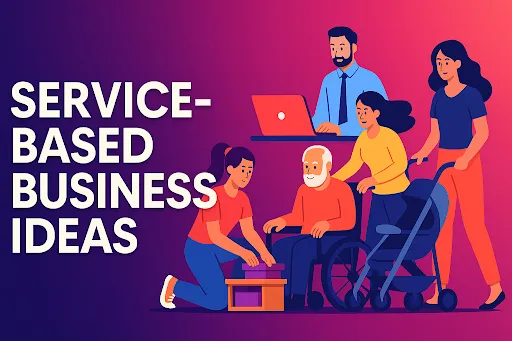
Ces idées d'entreprise consistent à fournir des services pratiques et demandés directement aux consommateurs ou aux entreprises. La liste ci-dessous présente des options mobiles et à domicile, offrant flexibilité, revenus récurrents et une forte demande locale.
27. Services de nettoyage par abonnement
Qu'est-ce que c'est ?
Cette entreprise propose des forfaits récurrents de nettoyage résidentiel ou commercial sur une base hebdomadaire, bihebdomadaire ou mensuelle. Ces idées commerciales remplacent les nettoyages ponctuels par un modèle d'abonnement prévisible qui garantit un service constant et des revenus stables.
Pourquoi ça marche en 2026 :
Les clients passent d'une relation de service à la demande à une relation de service à long terme pour des raisons de commodité et de tranquillité d'esprit. Les professionnels occupés, les familles et les chefs de bureau préfèrent la facturation automatisée et les horaires garantis. Ces idées commerciales réussissent en offrant un service fiable, des formules flexibles et un gain de temps dans un monde qui externalise de plus en plus les tâches quotidiennes.
Outils ou plates-formes à utiliser :
- Jobber, Housecall Pro, ou RéservationKoala pour la planification, les paiements et la gestion de la relation client
- Rayure ou Carré pour la facturation récurrente
- Canva pour les dépliants de marque, les fiches de prix et les cartes de recommandation
- Google My Business et le référencement local pour la génération de leads
Coût de démarrage :
Faible à moyen - généralement $1,000 à $5,000 pour le matériel de nettoyage, la création d'un site web, l'assurance et le marketing local. Vous pouvez vous lancer seul et vous développer en embauchant des nettoyeurs au fur et à mesure que votre clientèle augmente.
Qui devrait commencer ?
Idéal pour les personnes organisées, soucieuses du détail, ou pour les cadres ayant de l'expérience dans les services à domicile. Ces idées d'entreprise sont particulièrement efficaces dans les zones urbaines ou dans les quartiers où la famille occupe une place prépondérante.
Conseil de démarrage rapide :
Lancez votre entreprise avec 2 ou 3 niveaux de service (de base, standard, nettoyage en profondeur) et offrez un premier nettoyage gratuit ou un essai à prix réduit pour convertir les nouveaux clients. Ajoutez des primes de recommandation et des plans prépayés pour augmenter la fidélisation et les revenus mensuels récurrents (MRR).
28. Service d'esthétique automobile
Qu'est-ce que c'est ?
Un service d'esthétique automobile offre un nettoyage en profondeur, un polissage et une restauration de l'intérieur et de l'extérieur d'un véhicule, au-delà de ce qu'offre une station de lavage standard. Ces idées commerciales peuvent être exploitées à partir d'un emplacement fixe ou proposées comme service mobile au domicile ou sur le lieu de travail des clients.
Pourquoi ça marche en 2026 :
Les propriétaires de véhicules gardent leur voiture plus longtemps et accordent plus d'attention à l'entretien et à l'apparence. Avec l'essor de la commodité mobile et des options de nettoyage écologiques, ces idées commerciales gagnent en popularité parmi les professionnels occupés et les passionnés de voitures. L'activité d'esthétique automobile permet également d'obtenir des tickets et des marges plus élevés que les stations de lavage classiques.
Outils ou plates-formes à utiliser :
- Shopify POS, Carré, ou Fresha pour les rendez-vous et les paiements
- Kits d'entretien écologiques (nettoyeurs à vapeur, serviettes en microfibres, revêtements céramiques)
- Utilisation Google My Business et Place de marché Facebook pour la sensibilisation locale
- Canva pour la création de menus de services et de guides de soins aux clients
Coût de démarrage :
Moyenne - généralement $2,000 à $6,000, Les services de nettoyage et d'entretien peuvent être proposés dans le cadre d'un forfait, couvrant l'équipement, l'installation mobile (le cas échéant), l'image de marque et les licences. Vous pouvez commencer par un simple nettoyage d'intérieur, puis proposer des forfaits complets.
Qui devrait commencer ?
Elles conviennent parfaitement aux personnes soucieuses du détail, intéressées par les voitures et le service à la clientèle. Ces idées d'entreprise conviennent également aux entrepreneurs à la recherche d'une activité rentable, basée sur les services, qui peut évoluer avec l'ajout de personnel ou de forfaits.
Conseil de démarrage rapide :
Proposer des services mobiles dans les quartiers d'affaires ou les communautés résidentielles. Utiliser une carte de fidélité ou un forfait (par exemple, 3 nettoyages pour 10% de réduction) pour encourager les réservations répétées et le bouche-à-oreille.
Lancez votre propre café robotisé et commencez à gagner de l'argent dès aujourd'hui
À la recherche d'une activité intelligente et à fort retour sur investissement en 2026 ? Vending Lab Technologies vous présente CafeXbot, le seul café robotisé multi-produits entièrement automatisé au monde. Du café aux crèmes glacées en passant par les milk-shakes, CafeXbot sert tout sur une surface de seulement 3,8 m², avec une surveillance en temps réel, de faibles frais généraux et un retour sur investissement annuel pouvant atteindre 80%. Parfait pour les centres commerciaux, les aéroports et les zones à forte fréquentation. Découvrez l'avenir de la distribution automatique sur vendinglab.tech.
Pour plus d'informations, consultez le site
29. Toilettage sur roues
Qu'est-ce que c'est ?
Cette entreprise propose des services mobiles de toilettage pour animaux de compagnie : bain, coupe de poils, coupe de griffes et nettoyage d'oreilles directement à la porte des propriétaires d'animaux. Ces idées commerciales sont pratiques pour les parents d'animaux de compagnie occupés et réconfortantes pour les animaux de compagnie qui peuvent être anxieux dans les salons de toilettage traditionnels.
Pourquoi ça marche en 2026 :
La possession d'un animal de compagnie est en plein essor et de nombreux propriétaires considèrent leur animal comme un membre de leur famille. Ils veulent des soins personnalisés et peu stressants, sans avoir à se rendre dans un salon de coiffure ou à faire la queue. Ces idées commerciales réussissent parce qu'elles offrent un service de première qualité, un gain de temps et une attention individuelle, le tout dans l'environnement familier de l'animal.
Outils ou plates-formes à utiliser :
- Vagaro ou Rendez-vous carrés pour la programmation et les paiements
- Instagram, Google My Business, et Porte à côté pour la promotion hyperlocale
- Utilisation Canva concevoir des cartes de fidélité, des menus de service et des stratégies de marque
- Equiper une camionnette avec équipement de toilettage portable, Les réservoirs d'eau doivent être propres et la ventilation doit être assurée.
Coût de démarrage :
Moyenne à élevée - environ $10,000 à $40,000, Le coût d'un service de garde d'enfants est de l'ordre de 10 000 euros, en fonction du véhicule, du matériel de toilettage, de la licence et de la marque. Vous pouvez réduire les coûts en louant un véhicule ou en commençant avec moins de services.
Qui devrait commencer ?
Parfaites pour les toiletteurs certifiés, les amoureux des animaux ou ceux qui ont une expérience dans les soins vétérinaires ou les services aux animaux de compagnie. Ces idées d'entreprise conviennent également aux personnes vivant dans des zones suburbaines ou urbaines à forte densité d'animaux de compagnie.
Conseil de démarrage rapide :
Lancez-vous dans les quartiers à forte densité d'animaux et offrez une “première remise de toilettage” pour développer le bouche-à-oreille. Concentrez-vous sur l'établissement d'une relation de confiance avec l'animal et le propriétaire, et encouragez les commentaires et les recommandations pour une croissance rapide.
30. Planification d'événements intimes
Qu'est-ce que c'est ?
Cette entreprise se concentre sur l'organisation d'événements à petite échelle tels que les anniversaires, les baby showers, les demandes en mariage, les anniversaires et les micro-mariages, généralement pour des rassemblements de 10 à 50 personnes. Ces idées commerciales privilégient les touches personnelles, les thèmes créatifs et une exécution sans stress pour les clients qui veulent des moments mémorables sans le coût des grandes agences événementielles.
Pourquoi ça marche en 2026 :
Les changements de mode de vie qui ont suivi la pandémie ont incité les gens à apprécier des célébrations plus significatives et moins coûteuses. Les clients sont prêts à payer pour des expériences bien pensées, mais ils veulent de la flexibilité, de la personnalisation et des prix abordables. Ces idées commerciales réussissent en proposant des forfaits de niche, des fournisseurs de confiance et des installations créatives qui transforment des lieux ordinaires en environnements raffinés.
Outils ou plates-formes à utiliser :
- Canva ou Figma pour les planches d'ambiance et les propositions d'événements
- Livre de miel ou Trello pour la planification et la communication avec les clients
- Instagram, Pinterest, et Google My Business pour présenter votre portefeuille et générer des contacts
- Les relations avec les fournisseurs (fleuristes, traiteurs, décorateurs) sont essentielles pour rationaliser l'exécution.
Coût de démarrage :
Faible à moyen - environ $1,000 à $4,000 pour démarrer, y compris l'image de marque, la photographie, des exemples de décor et des outils de base. La plupart des premiers clients viendront par le biais de recommandations ou de la présence sur les médias sociaux.
Qui devrait commencer ?
Parfaites pour les créatifs, les professionnels de l'hôtellerie ou les personnes organisées qui aiment la conception et la logistique. Ces idées d'entreprise sont idéales pour les entrepreneurs à temps partiel ou ceux qui travaillent déjà dans des domaines liés à l'événementiel.
Conseil de démarrage rapide :
Créez des forfaits thématiques à prix fixe (par exemple, “Baby Shower Boho” ou “Dîner romantique sur le toit”) pour que votre offre soit claire et facile à réserver. Utilisez des séances photos stylisées avec des amis ou des vendeurs locaux pour construire rapidement votre portfolio visuel.
31. Préparation et livraison de repas
Qu'est-ce que c'est ?
Cette activité consiste à préparer des repas sains, prêts à être consommés, et à les livrer aux clients sur la base d'un abonnement ou d'une commande préalable. Ces idées commerciales s'adressent aux professionnels occupés, aux amateurs de fitness ou aux familles soucieuses de leur santé qui veulent des aliments nutritifs sans avoir à passer du temps à cuisiner.
Pourquoi ça marche en 2026 :
Alors que les gens sont de plus en plus soucieux de leur santé et manquent de temps, la demande de repas pratiques et à portions contrôlées ne cesse d'augmenter. Contrairement à la livraison de repas par les restaurants, les services de préparation de repas offrent une cohérence, un alignement diététique et la possibilité de planifier à l'avance. Ces idées commerciales sont particulièrement rentables dans les villes, où les commandes hebdomadaires récurrentes apportent un revenu stable.
Outils ou plates-formes à utiliser :
- Shopify ou GloriaFood pour la gestion des commandes
- Route4Me ou Google Maps pour optimiser les livraisons
- Canva pour la conception de menus, d'étiquettes et de plans d'abonnement
- Utilisation Instagram et les personnes influentes dans le domaine de la santé au niveau local pour un marketing ciblé
Coût de démarrage :
Moyenne - généralement $3,000 à $8,000, Le coût de l'opération est élevé, notamment en ce qui concerne la location de la cuisine, les récipients, les ingrédients, l'image de marque et la logistique de livraison. Il est possible de réduire les coûts en commençant par des pré-commandes.
Qui devrait commencer ?
Idéal pour les chefs cuisiniers, les nutritionnistes ou les entrepreneurs axés sur la santé. Ces idées d'entreprise conviennent également aux personnes qui préparent déjà leurs repas personnellement et qui souhaitent en faire une activité commerciale.
Conseil de démarrage rapide :
Choisissez un créneau spécifique (p. ex. repas céto, végétaliens, postnatals ou axés sur la gym). Offrez un plan de repas de 3 ou 5 jours à un prix réduit pour les nouveaux acheteurs et recueillez des témoignages. La constance, l'emballage et le goût sont des facteurs qui favorisent les abonnements à long terme.
32. Location d'équipements de fitness
Qu'est-ce que c'est ?
Cette entreprise loue des équipements de gymnastique - tels que des tapis de course, des vélos d'appartement, des bandes de résistance, des kettlebells ou des kits de yoga - à des particuliers, des entraîneurs personnels ou des studios de remise en forme, sur une base hebdomadaire ou mensuelle. Ces idées commerciales sont axées sur la commodité et l'accessibilité financière pour les personnes qui souhaitent s'entraîner à domicile ou temporairement.
Pourquoi ça marche en 2026 :
De nombreuses personnes souhaitent avoir accès à des outils de fitness sans s'engager à acheter un équipement coûteux. D'autres vivent dans des espaces restreints ou voyagent fréquemment. Ces idées commerciales se développent en offrant une certaine flexibilité et en résolvant les contraintes de la vie réelle en matière de coût, de stockage et de variété. Les tendances post-pandémiques en matière de fitness à domicile ont rendu ce modèle plus durable que les ventes ponctuelles.
Outils ou plates-formes à utiliser :
- Zoho Inventory ou Rentle pour le suivi des locations et la gestion des stocks
- Rayure ou Carré pour la facturation par abonnement
- Shopify ou WordPress pour la location d'une vitrine
- Groupes Facebook locaux et publicités Instagram pour une promotion hyperciblée.
Coût de démarrage :
Moyen - environ $5,000 à $12,000 pour acheter le stock initial, créer un emballage de marque et mettre en place un système de réservation en ligne. Commencez par du matériel portable nécessitant peu d'entretien avant d'ajouter des machines.
Qui devrait commencer ?
Les professionnels de la remise en forme, les propriétaires de salles de sport ou les entrepreneurs ayant accès à des fournisseurs en gros y trouveront leur compte. Ces idées commerciales conviennent également à ceux qui disposent d'un espace de stockage et de capacités de livraison.
Conseil de démarrage rapide :
Commencez par 3 ou 4 kits groupés (par exemple, “Kit de gymnastique à domicile pour débutants” ou “Studio de yoga en boîte”) et ciblez les complexes d'appartements ou les entreprises. Proposez des options de location-vente pour les utilisateurs à long terme.
33. Location de matériel de fête
Qu'est-ce que c'est ?
La location de matériel de fête consiste à fournir des articles essentiels pour les événements - tels que des tables, des chaises, des tentes, des systèmes de sonorisation, des éclairages et des décors - à des particuliers ou à des entreprises qui organisent des célébrations, des mariages ou des réceptions d'entreprise. Ces idées commerciales sont basées sur les services et les actifs, et offrent souvent un rendement élevé en cas d'utilisation répétée.
Pourquoi ça marche en 2026 :
L'organisation d'événements est en plein essor, mais de nombreux clients ne souhaitent pas investir dans du matériel à usage unique. Ces idées commerciales répondent à un besoin évident : l'accès à des options de location de haute qualité, abordables, avec installation et livraison. Les petits événements, en particulier, bénéficient de la présence de vendeurs locaux qui peuvent tout fournir en un seul endroit, avec un minimum de tracas.
Outils ou plates-formes à utiliser :
- Booqable ou RentMy pour la gestion des stocks et des réservations
- QuickBooks ou Zoho pour les factures, les dépôts et les contrats
- Google My Business et Place de marché Facebook pour la génération de prospects
- Utilisation Canva pour les fiches tarifaires et le matériel promotionnel de marque
Coût de démarrage :
Moyen à élevé - s'attendre à investir $7,000 à $20,000 en fonction de votre stock de départ. Concentrez-vous d'abord sur les articles les plus demandés et développez-les au fur et à mesure que les réservations augmentent.
Qui devrait commencer ?
Idéal pour les entrepreneurs soucieux de la logistique ou les personnes disposant d'un garage/entrepôt et d'un moyen de transport fiable. Ces idées commerciales fonctionnent également bien lorsqu'elles sont associées à des services d'organisation d'événements, de décoration ou de restauration.
Conseil de démarrage rapide :
Commencez par de petits forfaits (par exemple, “Party of 20 Essentials”) et regroupez la livraison et l'enlèvement pour un prix forfaitaire. Proposez des locations de dernière minute et des remises sur les références afin d'attirer rapidement des clients réguliers.
34. Services de soins aux personnes âgées à domicile
Qu'est-ce que c'est ?
Cette entreprise propose des services de soins à domicile non médicaux pour les personnes âgées. Les services comprennent généralement la compagnie, la préparation des repas, l'aide à la mobilité, le rappel des médicaments, le ménage léger et le transport. Ces idées d'entreprise soutiennent les familles à la recherche d'alternatives fiables, flexibles et abordables aux maisons de retraite ou aux soignants à temps plein.
Pourquoi ça marche en 2026 :
Avec le vieillissement des populations dans de nombreux pays, la demande de soins à domicile pour les personnes âgées continue de croître rapidement. Les familles préfèrent garder les personnes âgées dans un environnement familier pour leur bien-être émotionnel et pour des raisons de rentabilité. Ces idées d'entreprise réussissent en offrant des services fiables et compatissants qui comblent le manque croissant de soins personnalisés aux personnes âgées, en particulier pour les besoins à temps partiel ou de répit.
Outils ou plates-formes à utiliser :
- CareSmartz360 ou AlayaCare pour la planification, le respect des règles et le suivi du personnel soignant
- Annonces Google et annuaires locaux de soins aux personnes âgées pour la génération de prospects
- Utilisation DocuSign ou HelloSign pour des accords de services numériques sécurisés
- WhatsApp Business pour les mises à jour des soignants et la communication avec les familles
Coût de démarrage :
Moyen - environ $5,000 à $12,000, Les services de garde d'enfants et de soins à domicile comprennent l'assurance, les licences, l'intégration des aides-soignants, l'image de marque et le marketing local. Vous pouvez commencer avec un ou deux aides-soignants à temps partiel et évoluer en fonction de la demande.
Qui devrait commencer ?
Idéal pour les professionnels de la santé, les travailleurs sociaux ou les entrepreneurs dotés d'un grand sens de l'organisation et d'une grande compassion. Ces idées d'entreprise conviennent également aux personnes ayant une expérience de la gestion de personnel de service ou de la prise en charge de personnes dépendantes.
Conseil de démarrage rapide :
Commencez par proposer des forfaits de soins à temps partiel (par exemple, 3 heures par jour) et faites-en la promotion dans les hôpitaux, les cliniques et les centres communautaires. Instaurer un climat de confiance en vérifiant les antécédents des prestataires de soins, en organisant des boucles de rétroaction avec les familles et en établissant des rapports cohérents.
35. Service d'organisation et de désencombrement de la maison
Qu'est-ce que c'est ?
Cette entreprise aide les particuliers à désencombrer, organiser et optimiser leurs espaces de vie - placards, cuisines, garages, bureaux à domicile - en utilisant des systèmes pratiques et des solutions esthétiques. Ces idées commerciales améliorent la fonctionnalité et le bien-être, en particulier pour les clients qui changent de mode de vie, par exemple en déménageant, en réduisant leurs effectifs ou en travaillant à domicile.
Pourquoi ça marche en 2026 :
Avec la montée du minimalisme, du travail à distance et des tendances au bien-être, les gens se concentrent davantage sur la création d'environnements calmes et désencombrés. Ces idées commerciales intéressent les propriétaires, les locataires et même les petites entreprises qui veulent des transformations pratiques sans le stress de le faire eux-mêmes. Les médias sociaux ont également rendu les espaces organisés attrayants, augmentant ainsi la demande.
Outils ou plates-formes à utiliser :
- Trello ou Notion pour la planification des projets des clients et les listes de contrôle visuelles
- Canva pour le matériel de présentation avant/après et les brochures tarifaires
- Utilisation IKEA, Le Container Store, ou des fournisseurs locaux pour les bacs et les organisateurs
- Le marché à travers Instagram, Google My Business, et des agents immobiliers locaux
Coût de démarrage :
Faible à moyen - généralement $1,000 à $3,000, L'entreprise est responsable de l'organisation et de la mise en œuvre du projet, y compris de l'image de marque, de l'organisation des fournitures, du transport et de la commercialisation initiale. Il n'est pas nécessaire de disposer d'un bureau ou d'une vitrine.
Qui devrait commencer ?
Ces idées sont idéales pour les personnes soucieuses du détail, passionnées par la conception, l'organisation ou l'aide aux autres. Ces idées commerciales conviennent également aux décorateurs d'intérieur, aux agents immobiliers ou aux coachs de style de vie qui souhaitent proposer des services supplémentaires.
Conseil de démarrage rapide :
Proposer des forfaits fixes par type d'espace (par exemple, “Kitchen Reset” ou “Work-From-Home Zone”). Utilisez des photos spectaculaires avant et après pour attirer les clients et faire la promotion sur des plateformes visuelles comme Pinterest ou Instagram.
36. Rédaction de CV et services d'orientation professionnelle
Qu'est-ce que c'est ?
Cette entreprise propose aux demandeurs d'emploi des services professionnels de rédaction de CV, de lettres de motivation, d'optimisation de profil LinkedIn et de coaching pour les entretiens d'embauche. Ces idées commerciales aident les individus à se positionner efficacement sur des marchés de l'emploi compétitifs, en particulier lors d'une transition de carrière ou d'une candidature à un poste international.
Pourquoi ça marche en 2026 :
Avec le travail à distance, le recrutement mondial et les systèmes de suivi des candidats (ATS) pilotés par l'IA, les demandes d'emploi nécessitent des CV soignés et optimisés par mots-clés. De nombreuses personnes ont du mal à articuler leur expérience de manière professionnelle ou à se démarquer. Ces idées commerciales sont précieuses car elles offrent des solutions sur mesure et rapides à mettre en œuvre qui améliorent considérablement les chances d'entretien.
Outils ou plates-formes à utiliser :
- Canva Pro ou Adobe InDesign pour la conception de modèles de CV modernes
- ChatGPT pour la rédaction de lettres de motivation et la personnalisation des puces de CV
- Grammarly Premium pour une copie sans erreur et soignée
- Utilisation Calendly et Zoom pour l'offre d'un coaching ou d'une consultation individuelle
Coût de démarrage :
Faible - moins de $500 pour les outils, le site web et l'image de marque. Vous pouvez opérer entièrement en ligne, sans bureau physique ni inventaire.
Qui devrait commencer ?
Parfait pour les rédacteurs, les coachs de carrière ou les professionnels des ressources humaines. Ces idées d'entreprise sont idéales pour les indépendants qui cherchent à gagner un revenu stable tout en aidant d'autres personnes à se développer professionnellement.
Conseil de démarrage rapide :
Se spécialiser dans un segment (par exemple, les jeunes diplômés, les professionnels de la technologie ou les cadres). Offrir un examen gratuit du curriculum vitae pour attirer les clients potentiels, puis vendre des forfaits de réécriture personnalisés et l'optimisation de LinkedIn. Regrouper les services pour augmenter la valeur moyenne du client.
37. Services d'achat personnel
Qu'est-ce que c'est ?
Cette activité consiste à aider les clients à acheter des vêtements, des cadeaux, des produits d'épicerie ou des articles pour la maison en fonction de leurs préférences, de leur style de vie et de leur budget. Ces idées d'entreprise peuvent être proposées en personne ou virtuellement, avec des services allant de la constitution d'une garde-robe aux cadeaux saisonniers en passant par les courses quotidiennes.
Pourquoi ça marche en 2026 :
Les professionnels occupés, les personnes âgées et les consommateurs soucieux de leur style externalisent de plus en plus la prise de décision pour gagner du temps ou éviter d'être submergés. Avec l'essor des achats en ligne, de nombreux clients ont également besoin d'aide pour s'orienter dans leurs choix, trouver des bonnes affaires ou rester à la mode. Ces idées commerciales réussissent en offrant commodité, personnalisation et une expérience de luxe, même avec un budget limité.
Outils ou plates-formes à utiliser :
- Formulaires Google ou Typeform pour les questionnaires d'accueil des clients
- Canva ou PowerPoint pour des looks visuels ou des suggestions de shopping
- Instagram et TikTok pour présenter les résultats et gagner en visibilité
- Utilisation Trello ou Notion gérer les sessions et les listes de clients
Coût de démarrage :
Faible - généralement $500 à $1,500, Vous avez besoin d'une liste d'adresses et de numéros de téléphone, en fonction de votre site web, de votre portfolio et de votre marketing. Vous n'avez pas besoin d'inventaire, mais seulement de goût, d'organisation et de flux de services.
Qui devrait commencer ?
Idéal pour les amoureux de la mode, les passionnés d'intérieur ou les multitâches organisés. Ces idées de business conviennent également aux blogueurs lifestyle ou aux influenceurs qui cherchent à monétiser leur marque personnelle avec un service de haute qualité.
Conseil de démarrage rapide :
Proposez un appel de découverte gratuit de 30 minutes et un forfait “boutique d'essai” à usage unique. Concentrez-vous sur un créneau (par exemple, la transformation de la garde-robe pour les petits budgets ou l'achat de cadeaux pour les entreprises) et recueillez les témoignages de vos clients afin d'instaurer un climat de confiance et de fidéliser la clientèle.
38. Conseil en image de marque
Qu'est-ce que c'est ?
Le conseil en stratégie de marque personnelle aide les professionnels, les entrepreneurs et les créateurs à développer une présence en ligne cohérente et percutante sur des plateformes telles que LinkedIn, Instagram, les sites web et les biographies de conférenciers. Ces idées commerciales visent à transformer les compétences, l'histoire et les objectifs d'une personne en une identité cohérente et commercialisable.
Pourquoi ça marche en 2026 :
Que l'on soit à la recherche de clients, d'investisseurs ou d'une évolution de carrière, une identité numérique soignée est essentielle. Face à la concurrence croissante dans presque tous les domaines, ces idées d'entreprise offrent un soutien de grande valeur pour se démarquer en ligne. Les clients sont prêts à payer pour obtenir de l'aide afin de clarifier leur message, d'améliorer leur profil et de se présenter de manière professionnelle sur tous les canaux.
Outils ou plates-formes à utiliser :
- Canva, Figma, ou Adobe Express pour les éléments visuels de l'image de marque
- ChatGPT ou Copie.ai pour la rédaction de biographies, de titres d'appel et d'argumentaires
- LinkedIn, Twitter, et Sites web personnels pour la visibilité et l'engagement
- Utilisation Notion ou Google Docs pour les plans de stratégie de marque et les produits livrables
Coût de démarrage :
Faible - moins de $1,000 pour les outils, l'image de marque et la présence de base sur le web. Vous pouvez opérer entièrement en ligne, l'essentiel de votre valeur provenant de votre expertise et de votre stratégie.
Qui devrait commencer ?
Idéal pour les spécialistes du marketing, les rédacteurs, les concepteurs de marques ou les spécialistes de la communication. Ces idées d'entreprise sont idéales pour les indépendants qui cherchent à produire des services et à établir des relations basées sur le paiement à l'acte.
Conseil de démarrage rapide :
Commencez par proposer une refonte de votre profil sur LinkedIn ou un simple audit de votre site web personnel. Utilisez des exemples avant et après pour montrer la transformation et proposez des appels stratégiques en tant que prime.
39. Services de baby-sitting et de garde d'enfants
Qu'est-ce que c'est ?
Les services de baby-sitting et de garde d'enfants offrent une prise en charge à court terme ou à temps partiel des enfants, soit au domicile du client, soit dans un lieu sûr et agréé. Il peut s'agir d'une garde ponctuelle, d'une garde après l'école, d'une garde le week-end ou d'une garde d'urgence.
Pourquoi ça marche en 2026 :
Les parents occupés, en particulier les ménages à double revenu, comptent sur des services de garde d'enfants fiables pour concilier travail et vie de famille. Les places en crèche sont limitées dans de nombreuses villes et les parents ont souvent besoin d'une aide flexible et de dernière minute. Ces idées commerciales font l'objet d'une demande constante et fournissent des revenus récurrents lorsqu'elles sont structurées sous la forme d'un service local et fiable, axé sur la sécurité et le professionnalisme.
Outils ou plates-formes à utiliser :
- Care.com, Sittercity, ou des groupes Facebook locaux pour l'acquisition de clients
- Google Agenda et Trello pour la gestion des horaires
- Google My Business pour une visibilité locale
- Utilisation HelloSign ou DocuSign pour les formulaires de consentement et les accords
Coût de démarrage :
Faible - généralement $500 à $1,500, Les frais d'inscription sont calculés sur la base d'un barème qui couvre les certifications (comme la réanimation cardio-pulmonaire et les premiers secours), la vérification des antécédents, le marketing et les assurances. Vous pouvez commencer seul et évoluer avec des aides-soignants supplémentaires.
Qui devrait commencer ?
Idéal pour les personnes responsables, les étudiants, les parents au foyer ou les anciens éducateurs. Ces idées commerciales conviennent également à ceux qui recherchent un travail flexible et de confiance, avec une demande régulière dans les zones résidentielles.
Conseil de démarrage rapide :
Obtenez une certification en matière de soins de base aux enfants et de premiers secours. Proposez des séances d'essai ou des forfaits “Soirée des mamans” pour présenter votre service. Renforcez le bouche-à-oreille en vous appuyant sur les témoignages des parents et les partenariats avec la communauté locale.
40. Services d'assistance technique à distance
Qu'est-ce que c'est ?
Les services d'assistance technique à distance consistent à aider les particuliers et les petites entreprises à résoudre des problèmes liés à l'informatique - du dépannage de logiciels et de la configuration de la messagerie électronique à l'installation d'antivirus, à la connectivité des imprimantes et à l'assistance à la sauvegarde en nuage - entièrement en ligne ou par téléphone. Ces idées commerciales mettent l'accent sur la commodité et l'accessibilité, sans qu'il soit nécessaire de se rendre sur place.
Pourquoi ça marche en 2026 :
Avec l'augmentation du nombre de personnes travaillant à domicile et utilisant quotidiennement la technologie, les problèmes techniques sont de plus en plus fréquents, et de plus en plus frustrants. Tout le monde n'a pas les compétences ou le temps nécessaires pour les résoudre. Ces idées commerciales fonctionnent parce que les clients préfèrent des solutions rapides et à la demande, à un coût inférieur à celui de l'assistance informatique traditionnelle. Les petites entreprises, en particulier, ont souvent besoin d'une aide fiable mais n'ont pas les moyens de recruter du personnel informatique à temps plein.
Outils ou plates-formes à utiliser :
- AnyDesk, TeamViewer, ou Bureau à distance Chrome pour l'accès à distance
- Zoho Assist ou Freshdesk pour la gestion des tickets et des journaux d'assistance aux clients
- Calendly pour la prise de rendez-vous
- Utilisation Annonces Google et listes de services locaux pour les leads entrants
Coût de démarrage :
Faible - moins de $1,000, Les frais d'exploitation sont très bas, principalement pour les licences de logiciels à distance, un site web de base et l'image de marque. Vous pouvez gérer cette activité entièrement depuis votre domicile avec un minimum de frais généraux.
Qui devrait commencer ?
Parfaites pour les professionnels de l'informatique, les étudiants en informatique ou les indépendants férus de technologie. Ces idées d'entreprise conviennent également aux habitants des zones rurales qui souhaitent desservir un marché en ligne plus large.
Conseil de démarrage rapide :
Proposez des prix “à la carte” pour une assistance ponctuelle et vendez des forfaits mensuels de contrôle technique aux entreprises et aux travailleurs à distance. Instaurez un climat de confiance en obtenant des résultats rapides et en recueillant des commentaires positifs de la part des clients.
Idées d'entreprises créatives et médiatiques

Ces idées d'entreprises sont basées sur l'art, les médias, la conception et la narration. Elles sont parfaites pour les entrepreneurs imaginatifs et motivés par l'image. Les listes ci-dessous proposent des revenus évolutifs grâce à des contenus visuels, des services médiatiques et une image de marque créative.
41. Services de vidéographie et de photographie par drone
Qu'est-ce que c'est ?
Cette entreprise fournit des images et des photographies aériennes de haute qualité à l'aide de drones pour des événements, l'immobilier, le tourisme, l'agriculture et le contenu marketing. Ces idées d'entreprise se concentrent sur la capture de visuels qui ne peuvent être obtenus avec des caméras traditionnelles, offrant aux clients des perspectives uniques et élevées.
Pourquoi ça marche en 2026 :
La demande de contenu par drone a augmenté dans de nombreux secteurs. Les agents immobiliers veulent des plans d'ensemble de leur propriété, les organisateurs de mariages ont besoin de séquences aériennes cinématographiques et les entreprises veulent du contenu dynamique sur les médias sociaux. Ces idées commerciales sont rentables parce que le service est de grande valeur et qu'une fois que vous possédez l'équipement, les coûts permanents sont faibles. Les drones vous permettent également de travailler en solo et de facturer des tarifs élevés.
Outils ou plates-formes à utiliser :
- DJI Mavic, Autel, ou Skydio pour les drones professionnels
- Adobe Premiere Pro ou Final Cut Pro pour le montage vidéo
- Google My Business et Bobines Instagram promouvoir des projets locaux
- Utilisation AirMap ou OpenSky vérifier les zones de vol légales et la conformité
Coût de démarrage :
Moyenne à élevée - généralement $2,000 à $7,000, Les projets peuvent nécessiter l'obtention d'une licence, d'une assurance et d'outils d'édition. Certains projets peuvent également nécessiter une certification en fonction des lois locales.
Qui devrait commencer ?
Ces idées sont idéales pour les photographes, les vidéastes ou les amateurs de drones. Ces idées d'entreprise conviennent également aux spécialistes du marketing immobilier, aux créateurs de contenu sur les voyages ou aux créatifs férus de technologie.
Conseil de démarrage rapide :
Constituez un portefeuille local ciblant les agents immobiliers, les centres de villégiature ou les organisateurs d'événements. Proposez des démonstrations gratuites ou des premières prises de vue à prix réduit, puis vendez des forfaits comprenant des images brutes, des vidéos éditées et des clips prêts à être diffusés sur les médias sociaux.
42. Services de photographie pour les entreprises
Qu'est-ce que c'est ?
Cette entreprise propose des services de photographie professionnelle adaptés aux besoins commerciaux, tels que la photographie de produits, la photographie culinaire, les photos d'entreprise, l'image de marque d'un bureau, les annonces immobilières et la couverture d'un événement. Ces idées commerciales visent à aider les marques à se représenter visuellement dans les domaines du marketing, du commerce électronique et des médias sociaux.
Pourquoi ça marche en 2026 :
Un contenu visuel de haute qualité est essentiel pour la confiance des clients et les ventes en ligne. Les entreprises ne peuvent plus se contenter de photos prises au téléphone ou d'images de stock. Ces idées commerciales prospèrent parce que la demande s'étend à tous les secteurs : les restaurants, les vendeurs en ligne, les consultants, les entraîneurs de fitness et bien d'autres ont tous besoin d'un contenu visuel de qualité. Grâce à une qualité constante et à des délais d'exécution rapides, un photographe indépendant peut se constituer un solide revenu récurrent.
Outils ou plates-formes à utiliser :
- Canon EOS, Sony Alpha, ou Nikon Z caméras de la série
- Lightroom et Photoshop pour l'édition
- Pixieset, ShootProof, ou Google Drive pour la livraison au client
- Le marché à travers Google My Business, Instagram, et des recommandations de concepteurs ou d'agences de marketing
Coût de démarrage :
Moyen - environ $2,000 à $5,000, Le coût d'un projet est de l'ordre de 1 000 euros, selon le matériel de prise de vue, l'éclairage, les outils d'édition et la configuration du site web. Il est possible de réduire les coûts en commençant par des installations en lumière naturelle et en louant du matériel plus perfectionné si nécessaire.
Qui devrait commencer ?
Idéal pour les créatifs ayant un œil visuel fort, des compétences en photographie ou une expérience antérieure en tant que freelance. Ces idées commerciales sont également idéales pour les photographes de mariage ou de portrait existants qui cherchent à s'orienter vers un travail B2B récurrent.
Conseil de démarrage rapide :
Se positionner sur un créneau dès le début - par exemple, ne faire que de la photographie culinaire ou de l'immobilier. Proposer un forfait de départ à un prix fixe aux petites entreprises et assurer un délai d'exécution d'une semaine pour fidéliser les clients et les recommander à d'autres.
43. Services de voix-off
Qu'est-ce que c'est ?
Les services de voix-off consistent à enregistrer des voix professionnelles pour des vidéos, des publicités, des podcasts, des cours en ligne, des applications mobiles, des vidéos explicatives et des livres audio. Ces idées commerciales permettent aux créatifs de travailler depuis leur domicile avec un équipement minimal tout en servant des clients dans le monde entier.
Pourquoi ça marche en 2026 :
L'explosion du contenu des vidéos, de l'apprentissage en ligne et des podcasts a créé une demande massive de voix-off. De nombreux créateurs et entreprises ont besoin d'une narration claire et bien rythmée pour améliorer leurs projets. Ces idées commerciales sont intéressantes parce qu'elles sont peu coûteuses, évolutives et qu'elles peuvent être proposées dans plusieurs langues ou accents, en fonction de vos compétences.
Outils ou plates-formes à utiliser :
- Audacity, Adobe Audition, ou GarageBand pour l'enregistrement et l'édition
- Le Yéti bleu, Rode NT1, ou Shure MV7 pour les microphones de haute qualité
- Fiverr, Voices.com, et Upwork pour l'acquisition de clients
- Utilisation Google Drive ou WeTransfer pour l'envoi de fichiers
Coût de démarrage :
Faible - généralement $300 à $1 000, Il s'agit d'une installation de qualité professionnelle qui couvre un microphone, l'insonorisation, les outils de montage et l'image de marque. Une installation domestique est généralement suffisante pour obtenir un son de qualité professionnelle si elle est bien réalisée.
Qui devrait commencer ?
Idéal pour les personnes ayant une voix claire, une bonne prononciation et une attention particulière au rythme et au ton. Ces idées commerciales conviennent également aux acteurs, aux professeurs de langues ou aux créateurs de contenu qui souhaitent diversifier leurs revenus.
Conseil de démarrage rapide :
Commencez par de petits projets tels que des introductions sur YouTube ou des bandes-annonces de podcasts. Proposez des bobines de démonstration dans différents tons (professionnel, amical, dramatique) et constituez un portfolio sur des plateformes telles que Voices.com ou votre propre site web.
44. Édition et gestion de podcasts
Qu'est-ce que c'est ?
Cette activité consiste à éditer des épisodes de podcast, à ajouter des intros/outros, à supprimer les bruits de fond, à optimiser la qualité du son, à gérer les calendriers de publication, à rédiger des notes d'émission et à télécharger les épisodes sur les plateformes de diffusion en continu. Ces idées d'entreprise s'adressent aux créateurs qui souhaitent se concentrer sur l'enregistrement et non sur la post-production.
Pourquoi ça marche en 2026 :
Le podcasting continue d'exploser, mais de nombreux créateurs manquent de temps ou de compétences pour éditer et distribuer de manière cohérente. Ces idées commerciales prospèrent parce que les podcasteurs sont à la recherche de fiabilité, de qualité et d'une aide abordable pour maintenir des normes professionnelles. Les marques étant de plus en plus nombreuses à se lancer dans le podcasting, le soutien B2B aux podcasts est également devenu un modèle de service rentable.
Outils ou plates-formes à utiliser :
- Adobe Audition, Audacity, ou Description pour l'édition audio
- Auphonique pour un nivellement et un nettoyage automatiques du son
- Podbean (en anglais), Buzzsprout, ou Ancre pour l'hébergement et la publication
- Trello ou Airtable pour le suivi des épisodes et la gestion du flux de travail
Coût de démarrage :
Faible - généralement $300 à $1 000, Vous pouvez également vous charger de la gestion de votre entreprise, y compris des licences logicielles, de l'image de marque et d'un site web. Vous pouvez travailler depuis votre domicile et faire appel à des assistants virtuels au fur et à mesure de l'augmentation du nombre de clients.
Qui devrait commencer ?
Parfait pour les éditeurs audio, les gestionnaires de contenu ou les créatifs qui ont l'oreille pour la narration et la structure. Ces idées commerciales sont idéales pour les indépendants qui cherchent à gagner des revenus mensuels récurrents grâce à des clients réguliers.
Conseil de démarrage rapide :
Commencez par proposer des forfaits d'édition de podcasts (par exemple, 4 épisodes par mois). Associez-vous à des créateurs de contenu ou à des coachs qui lancent leur première émission et offrez-leur une assistance complète au lancement afin de devenir leur ressource privilégiée.
45. Location de cabines photographiques
Qu'est-ce que c'est ?
Cette entreprise propose des cabines photo à louer pour des événements tels que des mariages, des anniversaires, des réceptions d'entreprise et des salons professionnels. Ces idées commerciales impliquent la mise en place de cabines interactives, de marque ou à thème où les invités peuvent prendre des photos amusantes et de haute qualité et les imprimer instantanément ou les partager numériquement.
Pourquoi ça marche en 2026 :
Les événements battent leur plein et les gens aiment partager des souvenirs visuels. Les entreprises utilisent également les cabines photo pour des activations de marque et la génération de leads. Ces idées commerciales sont rentables car une fois la cabine installée, vous pouvez la louer à plusieurs reprises avec un minimum d'efforts. Elle offre également des marges élevées et un potentiel évolutif grâce à des accessoires, des toiles de fond personnalisées et une stratégie de marque.
Outils ou plates-formes à utiliser :
- Appareil photo reflex numérique, lumière circulaire, iPad + logiciel de stand (par exemple, LumaBooth ou Simple Booth)
- Canva pour la conception de modèles et de superpositions
- Google Agenda et Trello pour les réservations et la logistique
- Utilisation Instagram, Organisateurs d'événements, et Google My Business pour le marketing local
Coût de démarrage :
Moyenne - généralement $3,000 à $7,000, Vous pouvez commencer avec un seul stand et le faire évoluer en fonction de la demande. Vous pouvez commencer avec un stand et évoluer en fonction de la demande.
Qui devrait commencer ?
Idéal pour les photographes, les organisateurs d'événements ou les personnes à la recherche d'un travail d'appoint le week-end. Ces idées commerciales conviennent également aux personnes disposant d'un réseau local solide dans le secteur de l'événementiel ou du mariage.
Conseil de démarrage rapide :
Créez des forfaits d'événements abordables et offrez un supplément gratuit (comme une boîte d'accessoires ou un modèle de marque) à vos cinq premiers clients. Faites votre promotion sur les forums de mariage et par le biais de partenariats avec des lieux ou des coordinateurs locaux.
46. Entreprise de portraits numériques personnalisés
Qu'est-ce que c'est ?
Cette activité consiste à créer des portraits numériques personnalisés pour les clients à partir de photos, souvent sous forme de dessins animés, de vecteurs, de peintures à l'huile ou de formats stylisés. Ces idées commerciales s'adressent à des marchés tels que les cadeaux, les portraits d'animaux de compagnie, les illustrations de mariage, les photos de profil et la décoration d'intérieur.
Pourquoi ça marche en 2026 :
Les illustrations personnalisées restent à la mode, en particulier pour les anniversaires et la stratégie de marque en ligne. Les outils d'IA et les logiciels d'illustration étant de plus en plus accessibles, il est plus facile de fournir rapidement des visuels personnalisés de haute qualité. Ces idées commerciales s'appuient sur l'émotion : les clients aiment les cadeaux uniques ou les œuvres d'art qui reflètent leur identité, leurs animaux de compagnie ou leurs souvenirs.
Outils ou plates-formes à utiliser :
- Procreate, Adobe Illustrator, ou Photoshop pour les travaux manuels
- Voyage à mi-parcours, DALL-E, ou Fotor AI pour la génération d'œuvres d'art assistée par l'IA
- Etsy, Fiverr, ou un Shopify site de vente
- Utilisation Canva pour les objets promotionnels et les produits d'appel comme les cartes-cadeaux ou les versions encadrées
Coût de démarrage :
Faible - généralement $300 à $1 000, Selon la configuration de votre logiciel, de votre tablette et de votre place de marché, vous pouvez travailler entièrement en ligne et livrer vos travaux sous forme numérique ou proposer des tirages. Vous pouvez opérer entièrement en ligne et livrer vos travaux sous forme numérique ou proposer des tirages pour générer des revenus supplémentaires.
Qui devrait commencer ?
Parfaites pour les artistes, les designers ou les créatifs indépendants. Ces idées d'entreprise conviennent également à ceux qui ont des compétences en art de l'IA et qui souhaitent transformer la création numérique en revenus passifs ou actifs.
Conseil de démarrage rapide :
Créez 5 à 10 portraits types dans des styles différents et répertoriez-les sur Etsy ou Instagram. Proposez des réductions limitées dans le temps pour les 20 premières commandes et encouragez les clients satisfaits à partager leurs portraits en ligne pour une promotion organique.
Idées pour l'immobilier et la gestion de biens
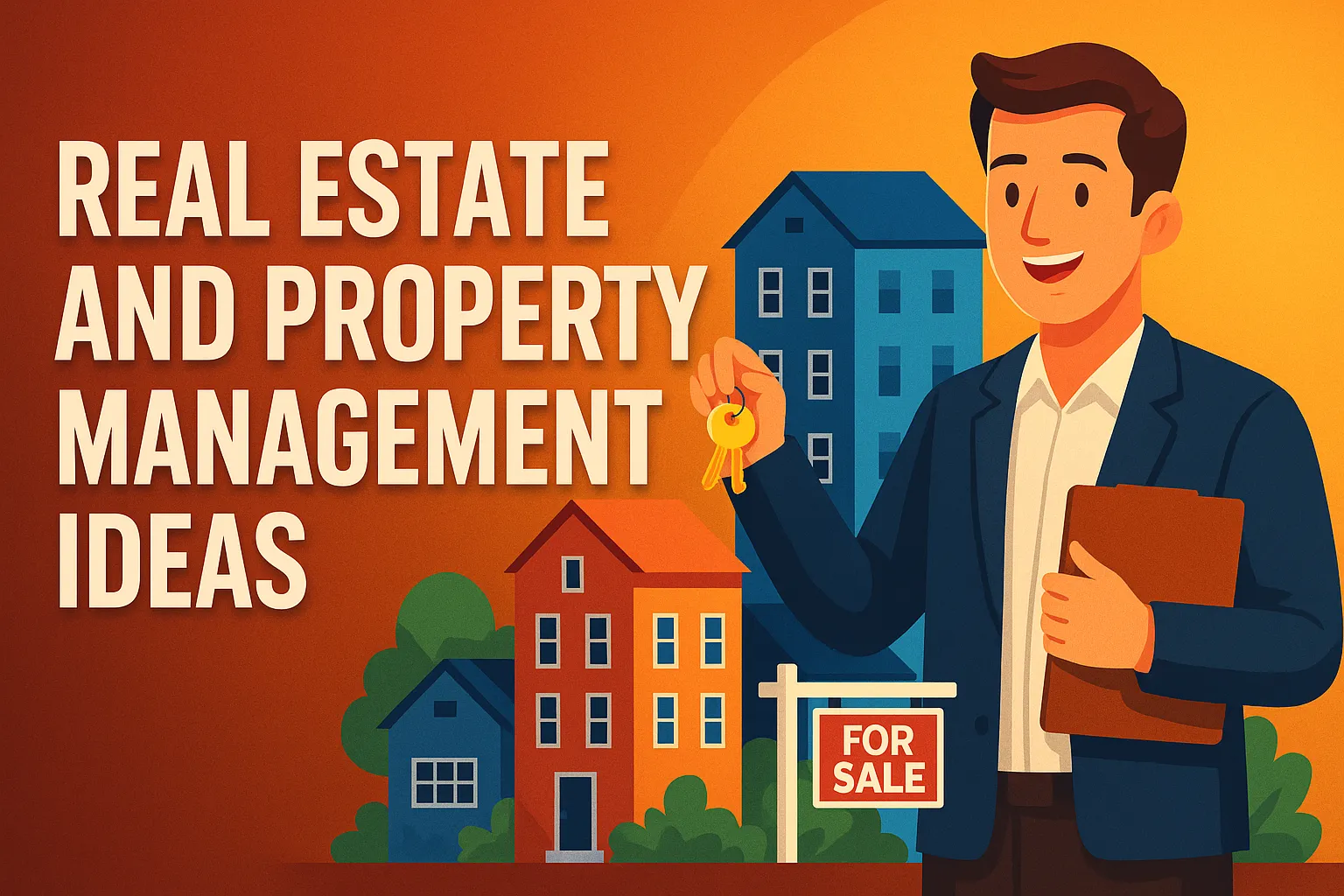
Cette section comprend des idées d'entreprises axées sur la gestion, la mise en valeur, la location ou l'amélioration de biens immobiliers. Les entreprises ci-dessous s'adressent aux propriétaires, aux locataires et aux bailleurs qui recherchent la commodité, l'esthétique ou un meilleur retour sur investissement de leurs biens immobiliers.
47. Gestion des propriétés Airbnb
Qu'est-ce que c'est ?
Cette entreprise gère les annonces Airbnb pour les propriétaires qui ne veulent pas s'occuper eux-mêmes de la communication avec les clients, des réservations, du nettoyage ou de l'entretien. Ces idées commerciales génèrent des revenus en facturant un pourcentage sur chaque réservation en échange d'un service complet d'hébergement.
Pourquoi ça marche en 2026 :
La location à court terme reste très rentable, mais de nombreux propriétaires vivent à l'étranger, travaillent à temps plein ou n'ont tout simplement pas le temps de s'occuper de leurs clients. Ces idées commerciales sont intéressantes parce qu'elles résolvent un problème opérationnel réel. Avec l'augmentation de la réglementation et des attentes des clients, une gestion professionnelle améliore à la fois le taux d'occupation et les commentaires des clients, ce qui rend votre service essentiel.
Outils ou plates-formes à utiliser :
- L'hospitalité, Hostaway, ou Guesty pour l'automatisation de plusieurs propriétés
- Airbnb, Vrbo, et Booking.com pour l'exposition de la liste
- TurnoverBnB ou Parvis pour la coordination des nettoyeurs et de l'entretien
- Utilisation Slack, WhatsApp Business, ou Trello pour la communication avec les propriétaires et les vendeurs
Coût de démarrage :
Faible à moyen - généralement $1,000 à $3,000, Il s'agit de la création d'un site web, d'une image de marque, d'un réseau local et, éventuellement, de l'embauche d'un agent d'entretien ou d'un entrepreneur. Il n'est pas nécessaire de posséder un bien immobilier pour commencer.
Qui devrait commencer ?
Parfaites pour les agents immobiliers, les professionnels de l'hôtellerie ou les entrepreneurs organisés. Ces idées commerciales sont idéales pour ceux qui vivent dans des villes touristiques ou universitaires.
Conseil de démarrage rapide :
Commencez par gérer une propriété et offrez un service exceptionnel. Utilisez ensuite cette liste pour présenter vos résultats - taux d'occupation, avis 5 étoiles et croissance du chiffre d'affaires - et proposez vos services à d'autres propriétaires par l'intermédiaire de forums locaux, d'agents immobiliers ou de groupes Facebook.
48. Home Staging virtuel
Qu'est-ce que c'est ?
Le home staging virtuel consiste à meubler et à décorer numériquement des photos de propriétés vides afin d'aider les agents immobiliers et les vendeurs à présenter leurs maisons de manière attrayante en ligne. Ces idées commerciales permettent d'économiser du temps et de l'argent par rapport à la mise en scène physique, tout en offrant une certaine flexibilité en termes de styles et d'agencements.
Pourquoi ça marche en 2026 :
Plus de 90% des acheteurs consultent les annonces en ligne avant de se rendre sur place. Les espaces non meublés ne se vendent pas aussi bien que les espaces aménagés. Ces idées commerciales prospèrent parce qu'elles renforcent l'attrait visuel, améliorent les taux de clics et raccourcissent les délais de vente, le tout pour une fraction des coûts de mise en scène traditionnels. Grâce à des visuels de haute qualité, vous pouvez assister les agents à distance, où qu'ils se trouvent.
Outils ou plates-formes à utiliser :
- BoxBrownie, VisualStager, ou 3D Max pour les rendus de mise en scène
- Photoshop ou Canva Pro pour les superpositions de dessins personnalisés
- Fiverr et Upwork proposer des services en free-lance ou trouver des assistants virtuels
- Utilisation LinkedIn et groupes immobiliers locaux pour entrer en contact avec des agents
Coût de démarrage :
Faible - généralement $500 à $1,500, Les outils de mise en scène, principalement pour les licences de logiciels, un site web de portfolio et la publicité. Vous pouvez également utiliser des outils de mise en scène existants en marque blanche pour réduire le temps de conception.
Qui devrait commencer ?
Idéal pour les architectes d'intérieur, les spécialistes du marketing immobilier ou les artistes numériques. Ces idées commerciales sont également idéales pour les personnes qui travaillent déjà en free-lance dans le domaine de la photographie immobilière ou du rendu 3D.
Conseil de démarrage rapide :
Proposez une mise en scène virtuelle gratuite à 1 ou 2 agents immobiliers locaux en échange de l'utilisation de leur portefeuille et de témoignages. Créez des carrousels avant-après sur Instagram et proposez vos services aux agents dont les annonces sont obsolètes ou vides.
49. Constructeur de petites maisons
Qu'est-ce que c'est ?
Cette activité consiste à concevoir et à construire de petites maisons compactes et économes en énergie - souvent moins de 400 pieds carrés - pour les particuliers, les locations de vacances ou la vie hors réseau. Ces idées commerciales offrent une solution moderne en matière de logement abordable, de minimalisme et de durabilité.
Pourquoi ça marche en 2026 :
Avec la hausse des prix de l'immobilier et l'évolution des priorités en matière de mode de vie, de nombreuses personnes optent pour des espaces de vie plus petits et plus efficaces. Les petites maisons sont désormais utilisées non seulement pour vivre à plein temps, mais aussi comme unités Airbnb, bureaux dans l'arrière-cour et maisons d'hôtes respectueuses de l'environnement. Ces idées commerciales se distinguent par la combinaison d'un design intelligent, de la durabilité et d'un prix abordable dans un monde qui a soif de flexibilité.
Outils ou plates-formes à utiliser :
- SketchUp, AutoCAD, ou Revit pour la conception et la planification
- Houzz Pro ou BuildBook pour la gestion de projets et la communication avec les clients
- Utilisation Instagram, Pinterest, et YouTube pour présenter les constructions et gagner des prospects
- S'approvisionner en matériaux auprès de vendeurs soucieux de l'environnement ou de fournisseurs de kits préfabriqués.
Coût de démarrage :
Élevée - généralement $25.000 à $100.000, Le coût d'une construction est généralement plus élevé que celui d'une maison individuelle, selon que l'on part de zéro, que l'on utilise des kits préfabriqués ou que l'on sous-traite la main-d'œuvre. Il est courant de commencer par une unité qui servira de pièce maîtresse.
Qui devrait commencer ?
Parfaites pour les constructeurs, les architectes, les concepteurs ou les entrepreneurs immobiliers. Ces idées commerciales conviennent également aux défenseurs du développement durable et aux adeptes de la vie hors réseau qui cherchent à créer un impact modulable.
Conseil de démarrage rapide :
Commencez par construire un prototype et présentez-le lors de salons de l'habitat, sur les médias sociaux ou via Airbnb. Proposez des forfaits de conception et de construction ou établissez des partenariats avec des propriétaires fonciers pour créer des communautés de location de petites maisons.
50. Rénovation de maisons et services de bricolage
Qu'est-ce que c'est ?
Cette entreprise propose des services de réparation, de rénovation et d'entretien général aux propriétaires, aux bailleurs et aux petites entreprises. Ces idées d'entreprise comprennent des tâches telles que la peinture, la réparation de cloisons sèches, l'installation de luminaires, la menuiserie mineure, le carrelage et les petits travaux de rénovation, qu'il s'agisse de projets ponctuels ou de services d'entretien par abonnement.
Pourquoi ça marche en 2026 :
Avec l'augmentation du travail à distance et des coûts d'accession à la propriété, les gens choisissent d'améliorer leur habitat plutôt que de déménager. Ces idées d'entreprise sont très demandées en raison du vieillissement du parc immobilier, de la lassitude des bricoleurs et de la pénurie d'entrepreneurs fiables. Les clients sont particulièrement attirés par les prestataires qui sont professionnels, transparents et réactifs - des qualités qui font souvent défaut sur le marché traditionnel des bricoleurs.
Outils ou plates-formes à utiliser :
- Jobber, Housecall Pro, ou Poutrelle pour les devis, les réservations et la communication avec les clients
- Utilisation Google My Business, Porte à côté, et Place de marché Facebook pour les prospects locaux
- Canva ou Visme créer des menus de service et des rapports sur les clients
- Maintenir un Feuille Google ou Base de données des notions pour les coûts des matériaux et les journaux de service
Coût de démarrage :
Moyen - environ $5,000 à $10,000, Vous avez la possibilité d'acquérir des outils, des assurances, un site web, une image de marque et une préparation de véhicule. Vous pouvez évoluer organiquement d'une activité à temps partiel à une activité à temps plein.
Qui devrait commencer ?
Idéal pour les gens de métier, les bricoleurs ou les anciens ouvriers du bâtiment. Ces idées d'entreprise conviennent également aux anciens combattants ou aux personnes ayant changé de carrière et possédant des compétences en mécanique et en résolution de problèmes.
Conseil de démarrage rapide :
Se spécialiser dans quelques tâches fréquentes (comme le montage d'un téléviseur ou le rafraîchissement d'une salle de bains). Proposez un menu de prix fixes et un temps de réponse rapide pour vous démarquer. Recueillez des avis après chaque intervention pour asseoir rapidement votre autorité locale.
Idées d'affaires pour le commerce électronique et la vente de produits
Ces idées d'entreprises se concentrent sur l'achat, la vente ou la revente de produits physiques ou numériques en ligne. Les entreprises énumérées ci-dessous vont des boîtes d'abonnement de niche aux places de marché d'occasion, offrant des opportunités évolutives dans l'espace de vente au détail en ligne.
51. Friperie en ligne (Instagram + Shopify)
Qu'est-ce que c'est ?
Cette activité consiste à sélectionner et à revendre des vêtements vintage ou de seconde main sur des plateformes sociales telles qu'Instagram, les achats étant traités via Shopify. Ces idées commerciales combinent le développement durable et la mode, offrant aux clients des pièces triées sur le volet sans avoir à fouiller dans des friperies physiques.
Pourquoi ça marche en 2026 :
La culture de la friperie est en plein essor, en particulier chez les membres de la génération Z et les acheteurs soucieux de l'environnement qui recherchent une mode abordable, unique et durable. Les médias sociaux ont transformé les trouvailles de friperie en récits visuels. Ces idées commerciales réussissent parce qu'elles combinent la personnalisation, la narration et de faibles frais généraux, offrant aux vendeurs une ligne directe avec les acheteurs sensibles aux tendances.
Outils ou plates-formes à utiliser :
- Instagram pour l'affichage de catalogues, la narration d'histoires et la vente en direct
- Shopify pour le traitement des commandes, les paiements et l'inventaire
- Canva ou InShot pour les bobines de stylisme, les histoires et la conception des messages
- Utilisation Google Sheets suivre les stocks et les marges
Coût de démarrage :
Faible à moyen - environ $500 à $2,000, Le prix d'achat est de l'ordre de 1 000 euros, en fonction de l'approvisionnement, de l'emballage et de l'image de marque. Vous pouvez commencer par vider vos placards ou acheter des articles de récupération et réinvestir les bénéfices pour développer votre activité.
Qui devrait commencer ?
Parfaites pour les amoureux de la mode, les revendeurs ou les créatifs qui aiment le stylisme et les prévisions de tendances. Ces idées d'entreprise sont également idéales pour ceux qui sont déjà actifs sur les médias sociaux et qui souhaitent créer une marque personnelle.
Conseil de démarrage rapide :
Choisissez un créneau (par exemple, le streetwear des années 90, l'an 2000, les basiques minimalistes) et publiez des tenues stylisées ou des flat-lays de manière cohérente. Utilisez le format “Drop” d'Instagram pour créer un sentiment d'urgence et générer du trafic vers votre boutique Shopify.
52. La vente de meubles de seconde main
Qu'est-ce que c'est ?
Cette activité consiste à se procurer des meubles usagés ou mis au rebut, à les restaurer ou à les améliorer, puis à les revendre pour en tirer un bénéfice. Ces idées commerciales tirent parti de la demande croissante de décoration intérieure unique, durable et abordable.
Pourquoi ça marche en 2026 :
Les meubles produits en série manquent de caractère, et le mode de vie durable devient une priorité. De nombreuses personnes préfèrent les articles remis à neuf et de haute qualité aux alternatives bon marché et jetables. Ces idées commerciales sont rentables car les matériaux sont souvent peu coûteux ou gratuits, et les produits finis peuvent atteindre des prix élevés, surtout s'ils sont bien mis en valeur dans les médias sociaux.
Outils ou plates-formes à utiliser :
- Place de marché Facebook, Craigslist, ou Offre pour l'approvisionnement et la vente
- Shopify ou Etsy pour les vitrines en ligne
- Outils de base tels que ponceuses, pulvérisateurs de peinture et perceuses électriques
- Utilisation Canva pour la création de visuels avant-après et de fiches de prix personnalisées
Coût de démarrage :
Faible à moyen - environ $1,000 à $3,000, Les frais d'exploitation de l'entreprise, principalement pour les outils, les matériaux, l'aménagement de l'espace de travail et les stocks initiaux, sont à la charge de l'entrepreneur. Vous pouvez évoluer lentement et réinvestir les bénéfices dans des opérations de plus grande valeur.
Qui devrait commencer ?
Idéal pour les bricoleurs, les amateurs de décoration d'intérieur ou les personnes qui aiment travailler de leurs mains. Ces idées d'entreprise sont également idéales pour les personnes qui travaillent à côté et qui disposent d'un garage ou d'un petit espace de stockage.
Conseil de démarrage rapide :
Commencez par de petits articles faciles à vendre, comme des tables de nuit ou des tables basses. Présentez les transformations à l'aide de bobines ou de TikToks, et fixez vos prix de manière à ce qu'ils soient à la fois abordables et rentables. Livrez localement ou établissez des partenariats avec des magasins de consignation pour créer des canaux de vente supplémentaires.
53. Revendeur de produits de luxe d'occasion
Qu'est-ce que c'est ?
Cette entreprise s'approvisionne en articles de luxe d'occasion authentifiés (sacs, montres, chaussures ou bijoux de marque) et les revend en ligne à un prix majoré. Ces idées commerciales fonctionnent selon des modèles de consignation, d'approvisionnement personnel ou d'achat direct et de vente.
Pourquoi ça marche en 2026 :
La revente de produits de luxe est en plein essor car les consommateurs recherchent la valeur, l'authenticité et la durabilité. Les acheteurs veulent avoir accès à la mode haut de gamme sans payer le prix fort, et les vendeurs veulent une plateforme de confiance pour revendre leurs articles. Ces idées commerciales réussissent en offrant des services de conservation, d'authentification et de confiance, en particulier sur un marché sujet aux contrefaçons.
Outils ou plates-formes à utiliser :
- Instagram, eBay, Collectif Vestiaire, ou Poshmark pour les ventes
- Entrupy ou des évaluateurs certifiés pour l'authentification des objets de luxe
- Canva et CapCut pour la présentation des produits et le contenu marketing
- Utilisation Shopify ou Notion pour la gestion des stocks et des clients
Coût de démarrage :
Moyenne à élevée - environ $2,000 à $10,000, selon le modèle d'inventaire. Vous pouvez réduire les coûts en commençant par la consignation (vente pour le compte d'autrui) afin d'éviter les coûts initiaux des produits.
Qui devrait commencer ?
Idéal pour les entrepreneurs, les stylistes ou les collectionneurs férus de mode qui comprennent les marchés du luxe. Ces idées commerciales sont également parfaites pour les influenceurs ou les revendeurs ayant de solides compétences en matière de contenu.
Conseil de démarrage rapide :
Construisez rapidement votre crédibilité en présentant des étapes d'authentification et en offrant des garanties de remboursement. Utilisez le storytelling et les offres à durée limitée pour créer un sentiment d'urgence. Commencez par 5 à 10 articles sélectionnés et faites-en la promotion via Instagram et les forums sur le luxe.
54. Boîtes d'abonnement pour des collations saines
Qu'est-ce que c'est ?
Cette entreprise livre chaque semaine ou chaque mois des boîtes contenant des en-cas nutritifs, tels que des barres protéinées, des fruits secs, des friandises sans gluten ou des croustilles biologiques. Ces idées commerciales s'adressent aux personnes soucieuses de leur santé, aux professionnels occupés, aux adeptes du fitness et aux parents à la recherche d'options pratiques et sans culpabilité.
Pourquoi ça marche en 2026 :
Les consommateurs sont plus que jamais soucieux de leur santé, mais manquent souvent de temps pour rechercher ou acheter de nouveaux en-cas sains. Les boîtes d'abonnement offrent commodité, découverte et personnalisation. Ces idées commerciales sont en plein essor grâce à la demande d'aliments portant une étiquette propre, à la personnalisation des régimes alimentaires (céto, végétalien, faible teneur en glucides) et aux habitudes de commandes répétées.
Outils ou plates-formes à utiliser :
- Shopify + Recharge pour la facturation des abonnements
- Canva pour la conception d'emballages et le contenu promotionnel
- Annonces Google, Instagram, et Critiques sur YouTube pour développer l'audience
- Airtable ou Notion pour la rotation des produits et les préférences des clients
Coût de démarrage :
Moyenne - généralement $3,000 à $7,000, L'objectif est d'offrir aux consommateurs un service de qualité, couvrant l'approvisionnement en produits, l'emballage sur mesure, l'expédition et le marketing. Un partenariat avec de petites marques de snacks permet de réduire les coûts et d'ajouter de l'exclusivité.
Qui devrait commencer ?
Ces idées sont idéales pour les nutritionnistes, les blogueurs culinaires ou les entrepreneurs dans le domaine du bien-être. Ces idées commerciales sont également idéales pour les parents ou les amateurs de fitness qui achètent et testent déjà régulièrement des en-cas sains.
Conseil de démarrage rapide :
Commencez par un thème (par exemple, “Snacks végétaliens hyperprotéinés”) et proposez une boîte d'échantillons ou un plan limité à 3 mois pour tester la demande. Utilisez les démonstrations d'influenceurs et les témoignages de clients pour créer rapidement une preuve sociale.
55. Boîte d'abonnement aux jouets éducatifs
Qu'est-ce que c'est ?
Cette entreprise propose des boîtes mensuelles de jouets éducatifs, de jeux et de kits d'activités pour les enfants en fonction de leur âge et de leur stade de développement. Ces idées commerciales visent à combiner le plaisir et l'apprentissage afin d'aider les parents à favoriser le développement cognitif et créatif à la maison.
Pourquoi ça marche en 2026 :
Les parents accordent la priorité aux jeux de développement sans écran. Avec l'école à la maison, l'apprentissage hybride et les environnements de travail à distance, les familles recherchent des activités structurées et attrayantes pour divertir et éduquer leurs enfants. Ces idées commerciales offrent commodité, variété et un modèle de revenus récurrents qui encourage la fidélisation des clients à long terme.
Outils ou plates-formes à utiliser :
- Shopify + Recharge pour la mise en place de l'abonnement
- Printify ou Mule à autocollants pour les encarts et les emballages de marque
- Annonces Google, Pinterest, et Communautés de mamans sur Instagram pour la sensibilisation
- Utilisation Trello ou Airtable gérer les thèmes mensuels, les stocks et les segments d'âge
Coût de démarrage :
Moyen - environ $4,000 à $10,000, Vous pouvez réduire les coûts en vous associant à des marques de jouets locales ou en développant des kits de bricolage en interne. Vous pouvez réduire les coûts en vous associant à des marques de jouets locales ou en développant des kits de bricolage en interne.
Qui devrait commencer ?
Parfaites pour les éducateurs, les parents, les professionnels de la petite enfance ou les créatifs qui s'intéressent au développement de l'enfant. Ces idées d'entreprise conviennent également aux fondateurs passionnés par Montessori, STEAM ou le jeu sensoriel.
Conseil de démarrage rapide :
Commencez par une tranche d'âge restreinte (par exemple, les 3-5 ans) et testez une boîte à thème comme “Formes et couleurs”. Proposez des précommandes limitées pour valider l'intérêt, et utilisez des témoignages de parents et des vidéos de déballage pour augmenter rapidement l'intérêt.
56. Boîte d'abonnement aux livres
Qu'est-ce que c'est ?
Cette activité consiste à livrer régulièrement à des abonnés des livres triés sur le volet, souvent classés par genre, tranche d'âge ou centre d'intérêt. Ces idées commerciales peuvent s'adresser aux enfants, aux jeunes adultes, aux professionnels ou à des lecteurs spécialisés (par exemple, les amateurs de romans policiers, les lecteurs d'ouvrages de développement personnel ou les fans d'ouvrages non romanesques).
Pourquoi ça marche en 2026 :
Malgré l'essor des contenus numériques, les livres physiques restent populaires, surtout lorsqu'ils sont présentés avec une touche personnelle. Les lecteurs apprécient la surprise, la communauté et l'exclusivité des coffrets thématiques. Ces idées commerciales sont très performantes dans les domaines du cadeau, de l'éducation et du développement personnel, en particulier lorsqu'elles sont associées à une valeur ajoutée telle que des marque-pages, des guides de discussion ou l'accès à des clubs de lecture privés.
Outils ou plates-formes à utiliser :
- Shopify + Recharge pour la gestion des abonnements
- Bonnes lectures et Tendances BookTok pour la sélection de titres populaires
- Canva pour les encarts de marque, les cartes de bienvenue et les conceptions de boîtes
- Utilisation Instagram, TikTok, et lettres d'information par courrier électronique pour les révélations de livres et l'engagement des abonnés
Coût de démarrage :
Moyen - environ $3,000 à $7,000, Vous pouvez également proposer des services d'édition, y compris le stock initial de livres, l'emballage, l'image de marque et le marketing. Vous pouvez commencer par des remises en gros ou collaborer avec des auteurs indépendants pour obtenir des exclusivités.
Qui devrait commencer ?
Parfaites pour les amoureux des livres, les éducateurs, les bibliothécaires ou les créateurs de contenu dans le domaine littéraire. Ces idées commerciales sont également idéales pour les utilisateurs de médias sociaux qui partagent déjà des recommandations de lecture.
Conseil de démarrage rapide :
Lancer un coffret “lecteur fondateur” en édition limitée pour créer un sentiment d'urgence et d'exclusivité. Inclure un article bonus surprise (par exemple, un thé, une bougie, une impression artistique) pour augmenter la valeur perçue et générer un contenu de déballage en ligne.
57. Marché en ligne pour les produits faits à la main
Qu'est-ce que c'est ?
Cette entreprise crée une plateforme où les artisans peuvent vendre des produits faits à la main (bijoux, poterie, bougies, maroquinerie, objets d'art, etc.), soit par le biais d'un site web de niche, soit en regroupant leurs produits sur des plateformes existantes. Ces idées commerciales soutiennent les créateurs indépendants et les mettent en relation avec des acheteurs à la recherche d'articles authentiques, fabriqués en petites séries.
Pourquoi ça marche en 2026 :
Les consommateurs s'éloignent des articles produits en masse et veulent des produits significatifs, fabriqués localement. Ces idées commerciales s'appuient sur la narration, la durabilité et l'unicité. En créant un espace en ligne ou une place de marché pour les micro-marques, vous permettez aux fabricants de vendre plus facilement et aux clients de découvrir des œuvres originales, en particulier lorsqu'ils se concentrent sur un créneau spécifique.
Outils ou plates-formes à utiliser :
- Shopify, Sharetribe, ou WooCommerce + Multivendor Plugin pour créer votre propre place de marché
- Instagram, Pinterest, et Publicité sur Facebook pour la découverte de produits
- Canva pour les bannières, les cartes de produits et les visuels pour les médias sociaux
- Utilisation Rayure ou Payoneer pour des paiements sécurisés aux vendeurs
Coût de démarrage :
Moyen - environ $5,000 à $12,000, Les vendeurs ont besoin d'une assistance technique, notamment pour la création d'un site web, l'élaboration d'une image de marque et le lancement d'une campagne marketing. Vous pouvez réduire les risques en contrôlant et en accompagnant les vendeurs avant le lancement complet.
Qui devrait commencer ?
Idéal pour les créateurs de communautés, les spécialistes du marketing ou les créatifs passionnés d'artisanat et de design. Ces idées commerciales conviennent également aux vendeurs Etsy prêts à créer leur propre écosystème de marque.
Conseil de démarrage rapide :
Lancez-vous avec un thème (par exemple, “Boho Home Decor” ou “Made in Pakistan Artisans”) et 10 à 20 produits phares. Offrez des inscriptions gratuites aux premiers créateurs et utilisez des cadeaux par courriel et sur Instagram pour attirer vos 500 premiers utilisateurs.
58. Boutique de commerce électronique pour les produits pour animaux de compagnie
Qu'est-ce que c'est ?
Cette entreprise vend des produits liés aux animaux de compagnie, tels que des jouets, des friandises, des produits de toilettage, des lits et des accessoires, par l'intermédiaire d'une boutique en ligne. Ces idées commerciales s'adressent aux propriétaires d'animaux qui privilégient la commodité, la qualité et la variété lorsqu'ils achètent pour leurs compagnons à poils.
Pourquoi ça marche en 2026 :
Le nombre d'animaux de compagnie n'a jamais été aussi élevé et les propriétaires dépensent plus que jamais pour leurs animaux. Des friandises biologiques aux colliers personnalisés, les consommateurs traitent leurs animaux de compagnie comme des membres de leur famille. Ces idées commerciales fonctionnent parce que le commerce électronique de niche vous permet de vous concentrer sur des races, des styles de vie ou des types de produits spécifiques, ce qui favorise la fidélité à la marque et les achats répétés.
Outils ou plates-formes à utiliser :
- Shopify ou WooCommerce pour votre magasin
- CJ Dropshipping, Imprimerie, ou des fournisseurs de gros directs pour l'exécution des commandes
- Klaviyo ou MailerLite pour le marketing automatisé par courrier électronique
- Utilisation Bobines Instagram, TikTok, et Annonces Google Shopping pour le trafic
Coût de démarrage :
Moyen - environ $3,000 à $8,000, Il s'agit de l'inventaire, de l'image de marque, de l'emballage et du marketing. Vous pouvez commencer en utilisant le dropshipping ou des produits en petites séries.
Qui devrait commencer ?
Idéal pour les amoureux des animaux de compagnie, les spécialistes du marketing numérique ou les débutants en e-commerce qui cherchent à se lancer dans une niche stable. Ces idées commerciales sont également idéales pour les influenceurs dans le domaine des animaux de compagnie qui souhaitent monétiser leur audience.
Conseil de démarrage rapide :
Commencez par vous concentrer sur un seul produit ou sur des offres groupées à thème (par exemple, “Kit de démarrage pour chiot” ou “Pack d'enrichissement pour chat d'intérieur”). Proposez des abonnements supplémentaires pour des produits consommables tels que des friandises ou des sacs à crottes afin de générer des revenus récurrents.
59. Boutique d'objets de collection et de produits dérivés numériques
Qu'est-ce que c'est ?
Cette entreprise vend des produits numériques tels que des impressions artistiques, des fonds d'écran, des illustrations d'avatars, des dessins de cartes à collectionner ou des actifs de type NFT, ainsi que des produits physiques complémentaires tels que des autocollants, des affiches, des vêtements ou des tasses. Ces idées commerciales associent contenu créatif et commerce électronique, en ciblant des niches de fans et des communautés en ligne.
Pourquoi ça marche en 2026 :
Les objets de collection numériques sont devenus monnaie courante grâce aux jeux, aux fandoms et à la culture des créateurs. Les clients veulent des œuvres d'art numériques personnalisées et en édition limitée, ainsi que des articles de marque pour exprimer leur identité. Ces idées commerciales prospèrent lorsqu'elles s'articulent autour d'un style, d'un thème ou d'une personnalité en ligne spécifique. L'ajout de produits physiques crée une expérience omnicanale qui augmente le chiffre d'affaires et la portée de la marque.
Outils ou plates-formes à utiliser :
- Gumroad, Paiements, ou Shopify (avec applications de livraison numérique)
- Imprimerie ou Printify pour les produits dérivés à la demande
- Procreate, Canva, ou Adobe Illustrator pour la conception
- Utilisation Instagram, Communautés Reddit, ou Serveurs Discord promouvoir
Coût de démarrage :
Faible à moyen - environ $500 à $3,000, Le coût de la vente en ligne est de l'ordre de 1,5 million d'euros, en fonction de vos outils de conception, de la configuration de votre boutique et de votre première campagne de publicité. Le dropshipping permet de minimiser les coûts d'inventaire.
Qui devrait commencer ?
Idéal pour les illustrateurs, les artistes numériques, les créateurs de fan art ou les administrateurs de pages de mèmes. Ces idées commerciales conviennent également aux streamers ou aux YouTubers qui cherchent à monétiser leur audience avec des produits de marque.
Conseil de démarrage rapide :
Choisissez une niche - fans d'anime, humour cryptographique, icônes minimalistes - et lancez une édition limitée de façon urgente (“Seulement 50 cartes numériques disponibles”). Proposez des offres groupées (par exemple, pack numérique + autocollant) et faites-en la promotion par le biais de collaborations avec des influenceurs ou de messages à l'intention de la communauté.
60. Marché de l'électronique d'occasion en ligne
Qu'est-ce que c'est ?
Cette activité met en relation les acheteurs et les vendeurs d'appareils électroniques d'occasion (smartphones, ordinateurs portables, tablettes, appareils photo et consoles de jeu) par l'intermédiaire d'une boutique en ligne ou d'une plateforme peer-to-peer. Ces idées commerciales mettent l'accent sur le caractère abordable, la durabilité et la confiance grâce à la vérification des appareils, aux garanties ou aux contrôles de qualité.
Pourquoi ça marche en 2026 :
La technologie devenant de plus en plus chère, les acheteurs recherchent des sources fiables d'appareils électroniques d'occasion. Les vendeurs veulent désencombrer ou améliorer leur équipement, et beaucoup préfèrent les plateformes qui s'occupent de la tarification, de l'inspection ou de la logistique. Ces idées commerciales prospèrent parce qu'elles résolvent les problèmes de déchets électroniques, d'accessibilité et de prix, en particulier pour les étudiants, les indépendants et les petites entreprises.
Outils ou plates-formes à utiliser :
- Shopify ou WordPress + WooCommerce pour l'installation du magasin
- Utilisation Sellbrite ou Rebuy pour l'inventaire et la tarification multicanaux
- Annonces Google, Place de marché Facebook, et Instagram pour un trafic ciblé
- Proposer le paiement par Rayure et ajouter des politiques de réparation/retour avec Retour de boucle ou des applications similaires
Coût de démarrage :
Moyen - environ $5,000 à $12,000, Il s'agit de l'inventaire (ou de l'approvisionnement en consignation), de l'image de marque, de la logistique et des annonces initiales. Vous pouvez commencer modestement avec des articles testés et remis à neuf.
Qui devrait commencer ?
Idéal pour les passionnés de technologie, les reconditionneurs ou les revendeurs. Ces idées commerciales sont également idéales pour les ateliers de réparation ou les indépendants qui comprennent l'électronique et souhaitent se lancer dans le commerce électronique.
Conseil de démarrage rapide :
Commencez par revendre quelques modèles très demandés (par exemple, iPhones, MacBooks) avec des spécifications vérifiées et des garanties de 30 jours. Proposez des options de reprise ou établissez des partenariats avec des entreprises de reconditionnement afin de vous approvisionner en appareils et de les inspecter de manière fiable.
Idées d'affaires dans le domaine de l'éducation et du coaching

Cette catégorie présente des entreprises qui éduquent, accompagnent ou soutiennent le développement personnel des enfants, des professionnels et des apprenants de tous âges. Les idées ci-dessous aident les gens à développer leurs compétences, à améliorer leur carrière ou à acquérir des connaissances financières dans un format d'apprentissage moderne.
61. Coaching de carrière pour les jeunes professionnels
Qu'est-ce que c'est ?
Cette entreprise propose un accompagnement individuel ou en groupe aux personnes en début de carrière qui ont besoin d'aide pour rédiger leur CV, élaborer une stratégie de recherche d'emploi, se préparer à un entretien, se constituer un réseau et acquérir une certaine confiance en soi sur le lieu de travail. Ces idées d'entreprise fournissent des conseils structurés pour aider les jeunes professionnels à naviguer dans la transition complexe entre l'école et la carrière.
Pourquoi ça marche en 2026 :
Les diplômés et les jeunes professionnels se sentent souvent perdus après leur entrée sur le marché du travail. La concurrence étant de plus en plus forte et les marchés de l'emploi évoluant rapidement, ils recherchent un mentorat et des stratégies personnalisées pour se démarquer. Ces idées commerciales sont très demandées parce qu'elles offrent clarté, orientation et résultats dans une phase critique de la vie, en particulier dans les secteurs d'activité éloignés ou à la pointe de la technologie.
Outils ou plates-formes à utiliser :
- Zoom ou Google Meet pour les sessions de coaching
- Calendly pour la programmation
- Notion, Google Docs, ou Airtable d'organiser les plans, le suivi des tâches et les ressources
- Utilisation Instagram, LinkedIn, et Substack pour asseoir son autorité et générer des prospects
Coût de démarrage :
Faible - généralement $300 à $1 000 pour l'image de marque, un site web, des outils de programmation et le marketing initial. L'essentiel de la valeur provient de votre expertise et de votre réputation.
Qui devrait commencer ?
Idéal pour les anciens professionnels des ressources humaines, les recruteurs, les conseillers d'orientation professionnelle ou les cadres ayant une expérience du mentorat. Ces idées d'entreprise sont également intéressantes pour les éducateurs ou les communicateurs qui peuvent simplifier des processus de carrière complexes.
Conseil de démarrage rapide :
Proposer un appel gratuit sur la clarté de la carrière et un kit de coaching (par exemple, “décrochez votre premier emploi en 30 jours”). Recueillez des témoignages et partagez vos réussites afin d'instaurer un climat de confiance et d'obtenir des recommandations par l'intermédiaire de LinkedIn et des réseaux d'anciens élèves.
62. Cours de codage pour enfants
Qu'est-ce que c'est ?
Cette entreprise propose une formation au codage aux enfants par le biais de cours en personne, de sessions en ligne ou de cours interactifs. Ces idées d'entreprise se concentrent sur l'enseignement des langages de programmation (comme Scratch, Python ou HTML), le développement de jeux, la robotique ou la création d'applications d'une manière amusante et adaptée à l'âge des enfants.
Pourquoi ça marche en 2026 :
La culture numérique est désormais aussi importante que les matières traditionnelles, et les parents veulent que leurs enfants apprennent à coder très tôt. Les écoles manquent souvent de profondeur ou de personnalisation, et les parents se tournent donc vers des programmes externes. Ces idées commerciales sont florissantes parce qu'elles combinent l'éducation, la préparation à l'avenir et des compétences technologiques attrayantes, ce qui les rend à la fois pratiques et passionnantes pour les enfants.
Outils ou plates-formes à utiliser :
- Grattage, Code.org, ou Tynker pour les jeunes apprenants
- Zoom, Google Meet, ou ClassDojo pour l'enseignement en direct
- Utilisation Enseignable ou Thinkific pour l'hébergement de cours à la demande
- Marché via Publicité sur Facebook, Instagram Communautés de parents, Partenariats avec les écoles locales
Coût de démarrage :
Faible à moyen - généralement $1,000 à $3,000, Le site web de l'école, qui couvre l'élaboration des programmes d'études, le site web, les licences et le marketing. Vous pouvez commencer avec des outils gratuits et les adapter au fur et à mesure que le nombre d'inscriptions augmente.
Qui devrait commencer ?
Parfaites pour les éducateurs, les développeurs de logiciels ou les passionnés de technologie qui aiment travailler avec les enfants. Ces idées d'entreprise conviennent également aux entrepreneurs en technologies de l'information et de la communication ou aux tuteurs qui cherchent à se développer dans un créneau en pleine expansion.
Conseil de démarrage rapide :
Commencez par des ateliers en fin de semaine ou après l'école pour un groupe d'âge (par exemple, les 7-10 ans). Proposez un cours d'essai gratuit et une séance de questions-réponses pour les parents afin d'instaurer un climat de confiance, puis proposez des prix forfaitaires et des certificats pour fidéliser les participants.
63. Plate-forme de tutorat en ligne
Qu'est-ce que c'est ?
Cette activité offre un soutien scolaire personnalisé dans des matières telles que les mathématiques, les sciences, les langues et la préparation aux examens, par le biais de sessions virtuelles. Ces idées d'entreprise proposent un tutorat individuel ou en groupe via une plateforme personnalisée ou des outils tiers, et s'adressent aux élèves du niveau élémentaire au niveau universitaire.
Pourquoi ça marche en 2026 :
Les parents et les étudiants se tournent de plus en plus vers l'enseignement en ligne pour des raisons de commodité et de flexibilité. Les fermetures d'écoles et les modèles hybrides ont normalisé l'apprentissage numérique, et la concurrence mondiale a rendu les résultats scolaires encore plus importants. Ces idées commerciales sont très demandées parce qu'elles offrent un soutien à l'apprentissage de qualité, abordable et accessible de n'importe où.
Outils ou plates-formes à utiliser :
- Zoom, Google Meet, ou ClassIn pour les sessions en direct
- Enseignable, Kajabi, ou Moodle pour les cours structurés et les évaluations
- Calendly et Rayure pour la programmation et les paiements
- Utilisation Groupes Facebook, Annonces Google, et des partenariats avec les écoles pour acquérir des prospects
Coût de démarrage :
Moyen - environ $2,000 à $5,000, Vous pouvez créer un site web, un système de gestion de l'apprentissage (LMS), recruter des tuteurs et faire du marketing. Vous pouvez commencer par une seule matière et vous développer au fur et à mesure que votre base d'utilisateurs augmente.
Qui devrait commencer ?
Idéal pour les enseignants, les experts en la matière, les coachs académiques ou les entrepreneurs du secteur de l'éducation. Ces idées d'entreprise conviennent également aux parents ou aux diplômés qui donnent déjà des cours particuliers de manière informelle et qui souhaitent passer à l'échelle professionnelle.
Conseil de démarrage rapide :
Niche vers le bas - par exemple, “Mathématiques de 9e année pour les élèves de l'IB” ou “Grammaire anglaise pour les apprenants de l'anglais langue seconde”. Lancez-vous avec un cours de démonstration gratuit, proposez un forfait mensuel à prix réduit et renforcez votre crédibilité avec des témoignages et un suivi des résultats.
64. Création de contenu sur les finances personnelles
Qu'est-ce que c'est ?
Cette activité consiste à créer du contenu éducatif - vidéos, articles de blog, infographies, cours ou bulletins d'information - sur des sujets tels que l'épargne, l'investissement, l'établissement d'un budget, la gestion du crédit et la littératie financière. Ces idées d'entreprise visent à simplifier des sujets financiers complexes pour un public de tous les jours, en particulier la génération Z et les milléniaux.
Pourquoi ça marche en 2026 :
Les connaissances financières font cruellement défaut dans le monde entier, et les gens recherchent activement des personnes fiables et dignes de confiance pour les guider. Avec l'augmentation de l'endettement, du coût de la vie et du travail en freelance, les finances personnelles ne sont plus facultatives. Ces idées commerciales sont très demandées sur des plateformes telles que YouTube, Instagram, TikTok et Substack, où les créateurs transforment leur expertise en contenu et le monétisent au moyen de publicités, de parrainages et de produits numériques.
Outils ou plates-formes à utiliser :
- YouTube, Bobines Instagram, ou TikTok pour le contenu vidéo
- Canva, Notion, ou ChatGPT pour les scénarios, les visuels et la planification du contenu
- ConvertKit ou Substack pour les bulletins d'information
- Enseignable ou Gumroad vendre des cours, des modèles ou des livres électroniques
Coût de démarrage :
Faible - généralement $300 à $1 000, Il s'agit d'une formation en ligne qui couvre l'image de marque, l'équipement de base (micro, webcam, trépied) et les outils de contenu social. Le reste dépend de votre cohérence et de votre prestation.
Qui devrait commencer ?
Idéal pour les conseillers financiers, les comptables, les spécialistes du budget ou toute personne ayant une expérience réelle de la finance et des compétences de communication claires. Ces idées d'entreprise sont idéales pour ceux qui souhaitent créer une marque personnelle basée sur le contenu.
Conseil de démarrage rapide :
Commencez par partager des conseils financiers pertinents (par exemple, “Comment j'ai économisé mes premiers $1 000”) et publiez-les régulièrement. Proposez gratuitement un modèle de budget ou un défi d'épargne pour développer votre liste d'adresses électroniques, puis vendez des ressources plus approfondies telles que des livres électroniques ou des mini-cours.
65. Coaching en finances personnelles
Qu'est-ce que c'est ?
Cette entreprise propose des séances de coaching individuelles ou en groupe pour aider les clients à gérer leur argent, à réduire leurs dettes, à constituer une épargne, à améliorer leur crédit et à atteindre leurs objectifs financiers. Ces idées d'affaires offrent une responsabilisation et des plans personnalisés qui vont au-delà des conseils génériques trouvés en ligne.
Pourquoi ça marche en 2026 :
Avec la hausse de l'inflation, l'endettement des étudiants et l'incertitude économique, les gens recherchent des conseils personnalisés. De nombreuses personnes savent ce qu'elles devrait mais ont besoin d'aide pour s'en tenir à un plan. Ces idées d'entreprises réussissent parce qu'elles associent l'éducation à un soutien émotionnel et à une stratégie sur mesure, en particulier pour les milléniaux et les jeunes familles.
Outils ou plates-formes à utiliser :
- Zoom ou Google Meet pour les sessions de coaching virtuel
- Notion, Google Sheets, ou L'argent du timon suivre les budgets et les objectifs
- Calendly et Rayure pour la programmation et les paiements
- Utilisation Instagram, LinkedIn, et YouTube renforcer l'autorité et la confiance
Coût de démarrage :
Faible - généralement $500 à $2,000, Les frais de fonctionnement sont de l'ordre de 1 000 euros, principalement pour l'image de marque, le site web et le logiciel. Vous pouvez travailler à domicile, sans frais généraux, et développer votre activité par le biais de recommandations et de contenu.
Qui devrait commencer ?
Idéales pour les planificateurs financiers, les experts en budgétisation ou même les personnes qui ont surmonté leurs dettes ou se sont enrichies et qui souhaitent aider les autres. Ces idées commerciales conviennent également aux créateurs de contenu qui souhaitent transformer leur formation en mentorat rémunéré.
Conseil de démarrage rapide :
Proposez une séance gratuite de “bilan financier” et une formule simple de coaching sur trois mois. Utilisez des témoignages, des études de cas et un suivi des progrès pour démontrer les gains des clients et encourager les réservations récurrentes.
66. Planification de voyages et conception d'itinéraires
Qu'est-ce que c'est ?
Cette entreprise propose des services personnalisés de planification de voyages, allant de l'élaboration d'itinéraires personnalisés à la réservation d'hébergements, d'expériences et de transports. Ces idées commerciales visent à faire gagner du temps aux clients, à réduire leur stress et à créer des voyages mémorables, bien conçus et adaptés à leurs préférences.
Pourquoi ça marche en 2026 :
Avec le rebond des voyages, les gens recherchent plus que des voyages organisés génériques. Ils veulent des expériences personnalisées, locales et uniques, mais n'ont ni le temps ni l'expertise nécessaires pour tout organiser eux-mêmes. Ces idées commerciales sont en plein essor parmi les professionnels occupés, les couples en lune de miel, les familles et les nomades numériques qui apprécient la commodité et les conseils d'initiés.
Outils ou plates-formes à utiliser :
- Notion, Airtable, ou Travefy pour la conception d'itinéraires
- Google Flights, Skyscanner, et Booking.com pour la recherche
- Utilisation Canva pour des itinéraires PDF et des guides de marque soignés
- Marché via Instagram, Pinterest, ou des groupes de voyageurs sur Facebook
Coût de démarrage :
Faible - généralement $300 à $1 000, Vous pouvez travailler à distance et facturer par itinéraire, à l'heure, ou proposer des forfaits forfaitaires. Vous pouvez travailler à distance et facturer par itinéraire, via des taux horaires, ou proposer des forfaits fixes de conception de voyages.
Qui devrait commencer ?
Parfaites pour les grands voyageurs, les professionnels de l'hôtellerie et de la restauration ou les organisateurs passionnés d'itinéraires. Ces idées commerciales conviennent également aux blogueurs de voyage ou aux travailleurs à distance qui aident déjà leurs amis et leur famille à planifier des voyages.
Conseil de démarrage rapide :
Commencez par une seule destination (par exemple, “7-Day Bali Honeymoon Itinerary”) et proposez des plans gratuits ou peu coûteux en échange de témoignages. Créez du contenu autour de conseils de voyage et de guides locaux pour attirer le trafic organique et convertir les lecteurs en clients.
Plates-formes de niche et places de marché spécialisées
Ces idées d'entreprises impliquent la création de plateformes numériques adaptées à des secteurs, des services ou des groupes d'utilisateurs spécifiques. Les entreprises énumérées ci-dessous créent des écosystèmes ciblés où les utilisateurs se connectent, effectuent des transactions ou partagent des ressources spécialisées.
67. Plateforme d'offres d'emploi de niche
Qu'est-ce que c'est ?
Cette entreprise crée un site d'offres d'emploi en ligne adapté à un secteur, à un rôle, à un groupe démographique ou à un lieu spécifique, comme les développeurs à distance, les pigistes créatifs, les emplois dans le domaine de la technologie climatique ou les emplois pour les nouveaux diplômés. Ces idées d'entreprises se concentrent sur la sélection d'opportunités de haute qualité que les grandes plateformes négligent.
Pourquoi ça marche en 2026 :
Les principaux sites d'offres d'emploi sont surchargés et souvent inadaptés aux besoins des demandeurs d'emploi spécialisés. Les employeurs ont également du mal à trouver des talents qualifiés dans des domaines spécifiques. Ces idées commerciales réussissent en offrant des listes ciblées, filtrées et fiables, ainsi que des outils tels que le téléchargement de CV, des liens vers des portfolios et la programmation d'entretiens. Les demandeurs d'emploi apprécient la pertinence et les employeurs la portée de leur action au sein de la bonne communauté.
Outils ou plates-formes à utiliser :
- WordPress + WP Job Manager, Tableau de bord, ou JobBoard.io pour la mise en place
- Utilisation Rayure ou PayPal pour les inscriptions payantes ou les abonnements d'employeurs
- Canva pour les supports marketing et les messages sur les médias sociaux
- Promouvoir via Groupes LinkedIn, Communautés Reddit, et Annonces ciblées sur Google
Coût de démarrage :
Moyenne - généralement $1,000 à $3,000, Les frais d'administration et de gestion sont à votre charge, y compris la configuration de la plateforme, la stratégie de marque et les publicités. Vous pouvez commencer à monétiser en faisant payer les employeurs par annonce ou en proposant des forfaits mensuels.
Qui devrait commencer ?
Idéal pour les recruteurs, les professionnels des ressources humaines, les community managers ou les blogueurs de niche spécialisés dans un domaine. Ces idées commerciales conviennent également aux rédacteurs de lettres d'information ou aux créateurs de cours qui cherchent à apporter une valeur ajoutée à un public spécifique.
Conseil de démarrage rapide :
Lancez votre site avec des offres d'emploi gratuites. Créez une liste d'adresses électroniques de demandeurs d'emploi et envoyez des offres d'emploi sélectionnées chaque semaine. Au fur et à mesure que le trafic augmente, proposez des annonces sponsorisées, des services de rédaction de CV ou des mises à niveau de l'image de marque de l'employeur.
68. Service de livraison de produits alimentaires locaux
Qu'est-ce que c'est ?
Cette entreprise propose la livraison le jour même ou le lendemain de produits d'épicerie provenant de marchés locaux, de supermarchés ou de magasins spécialisés. Ces idées commerciales s'adressent aux familles occupées, aux personnes âgées ou aux professionnels qui souhaitent bénéficier d'une certaine commodité sans avoir à se rendre dans des magasins bondés.
Pourquoi ça marche en 2026 :
Le comportement post-pandémique a fait de la livraison de produits alimentaires une préférence permanente pour de nombreuses personnes. Mais alors que les grands services se concentrent sur les grandes chaînes, la demande de livraison hyperlocale - magasins ethniques, marchés fermiers ou vendeurs de produits en vrac - est en pleine expansion. Ces entreprises prospèrent en offrant un meilleur choix, un service plus rapide et une touche personnelle, en particulier dans les quartiers mal desservis.
Outils ou plates-formes à utiliser :
- Shopify, GloriaFood, ou des applications personnalisées pour les commandes
- Google Maps et Route4Me pour l'optimisation des livraisons
- Utilisation Rayure, Contre remboursement, ou Paymob pour les paiements
- Promouvoir via WhatsApp Business, Groupes Facebook, et les personnes influentes au niveau local
Coût de démarrage :
Moyen - environ $2,000 à $6,000, Le nombre d'heures d'ouverture d'un service de livraison peut varier d'une année à l'autre, en fonction du développement de la plateforme, de la constitution de l'équipe de livraison, du marketing et des outils logistiques. Vous pouvez commencer par vous concentrer sur un seul quartier.
Qui devrait commencer ?
Elles conviennent parfaitement aux entrepreneurs soucieux de la logistique, aux propriétaires d'entreprises locales ou à toute personne ayant accès à des chauffeurs-livreurs et à des réseaux de fournisseurs. Ces idées commerciales conviennent également aux habitants des villes de niveau 2 ou des zones urbaines qui ne disposent pas d'applications de grande distribution.
Conseil de démarrage rapide :
Établissez un partenariat avec 3 à 5 fournisseurs locaux et lancez une zone de livraison limitée. Proposez des paniers hebdomadaires (par exemple, “Essential Groceries Under $30”) et faites-en la promotion sur les groupes WhatsApp de la communauté ou les réseaux de parents d'élèves afin de susciter la confiance et d'attirer les premiers utilisateurs.
69. Application mobile pour les événements locaux
Qu'est-ce que c'est ?
Cette entreprise développe une application mobile qui organise et promeut des événements locaux - tels que des concerts, des ateliers, des rencontres, des marchés et des pop-ups - permettant aux utilisateurs de découvrir ce qui se passe à proximité. Ces idées commerciales permettent de relier les communautés tout en aidant les organisateurs d'événements à obtenir de la visibilité et à vendre des billets.
Pourquoi ça marche en 2026 :
Malgré le monde numérique, les gens ont soif d'expériences concrètes. Mais de nombreux événements passent encore inaperçus en raison d'une promotion insuffisante. Ces idées commerciales se développent dans les zones urbaines et suburbaines où les utilisateurs veulent une application unique pour trouver ce qui se passe ce week-end. La monétisation provient des listes d'événements sponsorisés, des publicités, des ventes de billets affiliés et du placement de primes pour les organisateurs.
Outils ou plates-formes à utiliser :
- Utilisation FlutterFlow, Adalo, ou Bulle pour le développement d'applications sans code
- API Eventbrite, Événements Facebook, ou saisie manuelle pour les flux d'événements
- Google Firebase pour la base de données et les notifications
- Promouvoir via Instagram, influenceurs locaux, et Dépliants avec code QR
Coût de démarrage :
Moyenne - généralement $3,000 à $10,000, Les frais de développement de l'application, de marketing et d'intégration des fournisseurs sont de l'ordre d'un million d'euros. Commencez par une ville ou un type d'événement de niche.
Qui devrait commencer ?
Les organisateurs de communautés, les développeurs d'applications ou les spécialistes du marketing ayant des liens étroits avec les scènes locales (musique, fitness, art, etc.) y trouveront leur compte. Ces idées d'entreprise conviennent également aux fondateurs férus de technologie qui souhaitent créer une application de place de marché.
Conseil de démarrage rapide :
Commencez dans un seul quartier ou une seule ville. Concentrez-vous sur une catégorie (par exemple, “événements familiaux gratuits”) et établissez des partenariats avec des lieux d'événements, des restaurants ou des promoteurs locaux pour obtenir un contenu exclusif et une première visibilité.
70. Application mobile pour les indépendants
Qu'est-ce que c'est ?
Cette activité consiste à créer une application mobile qui aide les freelances à gérer leur flux de travail, comme la communication avec les clients, le suivi du temps, la facturation, les contrats et la recherche de missions. Ces idées d'entreprise sont conçues pour servir les travailleurs indépendants à la recherche de solutions simplifiées et tout-en-un adaptées à leur mode de vie en freelance.
Pourquoi ça marche en 2026 :
L'économie du freelance est en plein essor, mais la plupart des outils sont dispersés sur plusieurs plateformes. Les freelances ont soif de commodité, d'organisation et de professionnalisme, en particulier ceux qui gèrent plusieurs clients. Ces idées d'entreprise réussissent en offrant des outils mobiles et spécifiques aux freelances qui rendent le travail quotidien plus facile, plus rapide et plus professionnel.
Outils ou plates-formes à utiliser :
- Utilisation Flutter, React Native, ou Adalo pour le développement d'applications
- Rayure, PayPal, et Sage pour des paiements intégrés
- API Calendly et Notion API pour la planification et les modèles de projet
- Promouvoir par communautés d'indépendants, Reddit, et TikTok
Coût de démarrage :
Moyenne à élevée - environ $5,000 à $15,000, Le MVP est un outil d'aide à la décision, qui comprend le développement, la conception UX, les intégrations et le marketing. Un MVP sans code permet de réduire les coûts et de valider rapidement l'adéquation produit-marché.
Qui devrait commencer ?
Idéal pour les développeurs, les chefs de produit ou les anciens travailleurs indépendants qui connaissent les problèmes de première main. Ces idées d'entreprise conviennent également aux fondateurs de SaaS qui cherchent à desservir des communautés de créateurs de niche.
Conseil de démarrage rapide :
Concentrez-vous sur une fonctionnalité essentielle dont les freelances ont vraiment besoin, comme un tableau de bord de facturation intelligent ou des notes de clients liées aux événements du calendrier. Lancez-vous auprès d'un groupe spécifique (par exemple, les designers ou les rédacteurs), recueillez rapidement des commentaires et procédez par itération avant d'étendre les fonctionnalités.
Idées d'affaires dans le domaine de l'alimentation et des boissons

Ces idées d'entreprise concernent la préparation, la livraison ou l'emballage d'aliments et de boissons de manière créative et axée sur le client. Les entreprises ci-dessous combinent la commodité, la saveur et la marque, ce qui est idéal pour les entrepreneurs du secteur alimentaire qui veulent de la flexibilité et de la visibilité.
71. Cloud Kitchen (Restaurant avec livraison uniquement)
Qu'est-ce que c'est ?
Une "cloud kitchen", également connue sous le nom de "ghost kitchen", fonctionne sans espace de restauration et se concentre exclusivement sur la livraison de nourriture. Ces idées commerciales s'appuient sur des plateformes de livraison de nourriture telles que GrabFood, Foodpanda et Deliveroo pour honorer les commandes, ce qui réduit la nécessité de disposer de locaux à loyer élevé et d'un personnel nombreux.
Pourquoi ça marche en 2026 :
La livraison de nourriture est plus populaire que jamais, et les clients apprécient la commodité, la rapidité et la variété. Les cuisines en nuage permettent aux entrepreneurs de tester des concepts, d'exploiter plusieurs marques à partir d'une seule cuisine et de passer à l'échelle supérieure avec moins de risques. Ces idées commerciales réussissent en minimisant les frais généraux tout en maximisant la portée numérique et l'efficacité de la livraison.
Outils ou plates-formes à utiliser :
- Systèmes d'affichage pour la cuisine comme Toast ou Place pour les restaurants
- Agrégateurs de livraison de produits alimentaires (Uber Eats, Talabat, Deliveroo, Foodpanda)
- Google My Business, Instagram, et TikTok pour le marketing
- Notion ou Trello pour la gestion des stocks et des recettes
Coût de démarrage :
Moyenne à élevée - généralement $10,000 à $40,000, Le site web de l'Union européenne (UE), qui couvre l'espace de la cuisine commerciale, l'équipement, l'emballage et le marketing, est une source d'informations utiles. Vous pouvez commencer en louant un espace de cuisine ou en vous associant à des installations partagées.
Qui devrait commencer ?
Idéales pour les chefs, les restaurateurs ou les entrepreneurs du secteur alimentaire qui souhaitent entrer sur le marché en prenant moins de risques financiers. Ces idées commerciales conviennent également aux traiteurs ou aux cuisiniers à domicile prêts à se développer professionnellement.
Conseil de démarrage rapide :
Choisissez une cuisine et concentrez-vous sur 4 à 6 plats emblématiques. Utilisez une identité de marque forte, des photographies de plats et une livraison rapide pour vous démarquer. Lancez votre site aux heures de pointe avec des codes promotionnels ciblés et collaborez avec des influenceurs ou des blogueurs culinaires pour obtenir une traction rapide.
72. Entreprise de camionnettes alimentaires
Qu'est-ce que c'est ?
Un camion-restaurant sert des repas frais sur le pouce à partir d'une cuisine mobile, souvent dans des lieux très fréquentés, lors d'événements ou de festivals gastronomiques. Ce type d'entreprise allie la créativité culinaire à la mobilité, offrant ainsi une alternative moins coûteuse que les restaurants traditionnels.
Pourquoi ça marche en 2026 :
Les clients recherchent des plats pratiques et abordables qui ont de la personnalité. C'est ce que proposent les food trucks, qui offrent en outre une grande flexibilité en termes d'emplacement, d'horaires et de menu. Ces idées commerciales prospèrent grâce à leur capacité à s'adapter rapidement, à tester de nouveaux plats et à développer une clientèle fidèle. Compte tenu de l'augmentation des loyers et des coûts des cuisines commerciales, un camion-restaurant bien identifié offre un bon retour sur investissement aux chefs passionnés.
Outils ou plates-formes à utiliser :
- Square POS pour les ventes et les stocks
- Instagram, TikTok, et Google Maps pour partager l'emplacement et créer une communauté
- Canva pour les menus, la signalisation et le matériel promotionnel
- StreetFoodFinder ou La faim itinérante pour répertorier votre camion et réserver des événements
Coût de démarrage :
Moyenne à élevée - généralement $25,000 à $75,000, Le coût de la restauration est de l'ordre de 1 000 euros, en fonction du camion, de l'équipement de cuisine, des licences, de l'image de marque et du marketing initial. La location d'un camion ou la transformation d'une remorque peut réduire les coûts.
Qui devrait commencer ?
Elles sont parfaites pour les chefs, les diplômés d'écoles de cuisine ou les cuisiniers à domicile qui ont une recette originale ou un concept culinaire unique. Ces idées commerciales intéressent également les restaurateurs qui cherchent à se développer sans avoir à ouvrir un autre établissement.
Conseil de démarrage rapide :
Commencez par un plat fort (par exemple, des tacos coréens ou du fromage grillé végétalien) et créez une marque autour de ce plat. Établissez des partenariats avec des événements locaux et proposez des services de traiteur pour des réceptions privées afin d'augmenter les recettes au-delà des ventes dans la rue.
73. Entreprise de boîtes-cadeaux personnalisées
Qu'est-ce que c'est ?
Cette entreprise crée et vend des coffrets cadeaux thématiques et personnalisés pour des occasions telles que les anniversaires, les événements d'entreprise, les fêtes ou les colis de soins. Ces idées commerciales offrent commodité et impact émotionnel en sélectionnant des articles en fonction des préférences du destinataire ou de l'intention de l'expéditeur.
Pourquoi ça marche en 2026 :
Les cadeaux sont devenus numériques, mais les gens veulent toujours des expériences significatives et tangibles. Qu'il s'agisse d'une boîte de soins personnels, d'un paquet de remerciements ou d'un ensemble pour une fête de bébé, les clients veulent des cadeaux personnalisés et prêts à être expédiés. Ces idées commerciales réussissent à combiner l'esthétique, la commodité et la valeur émotionnelle, surtout lorsqu'elles sont bien commercialisées sur les plates-formes sociales.
Outils ou plates-formes à utiliser :
- Shopify ou WooCommerce pour les vitrines
- Canva pour les étiquettes et les encarts personnalisés
- Imprimerie, Uline, Les fournisseurs locaux pour l'emballage et l'approvisionnement en produits.
- Promouvoir via Bobines Instagram, Pinterest, et rappels de cadeaux par courriel
Coût de démarrage :
Moyen - environ $3,000 à $7,000, Vous pouvez également vous charger de l'emballage, de l'inventaire initial, de la conception et du marketing numérique. Vous pouvez commencer avec 2 ou 3 thèmes de boîtes et vous développer en fonction de la demande.
Qui devrait commencer ?
Idéal pour les entrepreneurs créatifs, les artisans ou les blogueurs "style de vie" qui ont un don pour la sélection et la conception de produits. Ces idées commerciales conviennent également aux personnes qui entretiennent de solides relations avec des fournisseurs locaux ou qui ont déjà une expérience du commerce électronique.
Conseil de démarrage rapide :
Lancez 3 coffrets signature (par exemple, “Kit de soins pour le travail à domicile”, “Coffret pour la future maman”, “Kit de remerciement pour l'entreprise”). Utilisez des notes et des emballages personnalisés pour encourager les commandes répétées, et établissez des partenariats avec les équipes RH ou les influenceurs pour le B2B et la saison des cadeaux.
74. Healthy Snacks Food Truck
Qu'est-ce que c'est ?
Cette entreprise exploite un camion-restaurant spécialisé dans les produits sains à emporter, tels que les bols de smoothie, les en-cas protéinés, les wraps végétaliens, les jus pressés à froid et les friandises sans gluten. Ces idées commerciales associent la mobilité à une alimentation saine, attirant ainsi les consommateurs soucieux de leur forme physique et de leur régime alimentaire.
Pourquoi ça marche en 2026 :
Alors que la sensibilisation à l'alimentation saine s'accroît, les consommateurs recherchent activement des alternatives nutritives, même lorsqu'ils mangent à l'extérieur. Les camions de nourriture graisseuse standard ne conviennent pas à tout le monde. Ces idées commerciales prospèrent en comblant cette lacune - en servant des clients soucieux de leur santé dans les salles de sport, les parcs de bureaux, les événements de bien-être et les écoles.
Outils ou plates-formes à utiliser :
- Square POS pour des transactions et des mises à jour de menus en toute transparence
- Instagram, TikTok, et Google Maps pour partager la localisation en temps réel et les promotions
- Canva pour la conception de menus et l'image de marque des camions
- Utilisation Eventbrite et des événements locaux de remise en forme pour obtenir des possibilités de placement
Coût de démarrage :
Moyenne à élevée - généralement $30,000 à $60,000, Les coûts d'exploitation sont élevés, y compris l'achat ou la location d'un camion, l'équipement de cuisine, l'image de marque, les licences et le marketing de lancement. Commencer avec un chariot pop-up ou un camion partagé abaisse la barrière.
Qui devrait commencer ?
Parfait pour les nutritionnistes, les coachs en fitness ou les créatifs culinaires passionnés par un mode de vie sain. Ces idées commerciales conviennent également aux exploitants de camions-restaurants existants qui cherchent à se spécialiser.
Conseil de démarrage rapide :
Créez un “produit phare” (par exemple, un smoothie aux super-aliments ou une boule d'énergie protéinée) et faites-en la promotion en tant que moteur de votre marque. Installez-vous dans des salles de sport, des festivals de yoga ou des écoles proposant des programmes de bien-être et offrez des cartes de fidélité ou des abonnements à des repas préparés pour obtenir des revenus récurrents.
75. Réparation et location d'appareils mobiles
Qu'est-ce que c'est ?
Cette entreprise propose des services de réparation sur place pour les smartphones, les tablettes et les ordinateurs portables, ainsi que la location à court terme d'appareils pour les étudiants, les voyageurs ou les professionnels. Ces idées d'entreprise mettent l'accent sur la commodité, la rapidité et l'accessibilité financière, en particulier dans les zones urbaines ou les communautés à forte composante technologique.
Pourquoi ça marche en 2026 :
Les appareils sont essentiels et lorsqu'ils tombent en panne, les utilisateurs veulent des solutions rapides et fiables. En même temps, les voyageurs, les nomades numériques ou les étudiants ne souhaitent pas toujours acheter de nouveaux appareils pour une utilisation à court terme. Ces idées commerciales réussissent à résoudre deux problèmes réels : l'urgence des réparations et l'accessibilité des appareils, sans qu'il soit nécessaire de disposer d'une vitrine.
Outils ou plates-formes à utiliser :
- Square POS et Google Agenda pour la programmation et les paiements
- RepairDesk ou Fixement gérer les commandes de réparation et les stocks
- Google My Business, Instagram, et Petites annonces locales pour le marketing
- Partenariat avec des services de messagerie pour l'enlèvement et la livraison à domicile
Coût de démarrage :
Moyenne - généralement $4,000 à $10,000, Les coûts peuvent être réduits en commençant par le mobile ou en travaillant à domicile. Les coûts peuvent être maintenus à un niveau peu élevé en commençant par une activité mobile ou en opérant à domicile.
Qui devrait commencer ?
Idéal pour les personnes qui s'y connaissent en technologie, les techniciens de réparation ou les informaticiens indépendants. Ces idées commerciales conviennent également aux revendeurs de produits électroniques qui souhaitent développer des services ou des modèles de revenus récurrents.
Conseil de démarrage rapide :
Lancez une offre mobile d'abord - commercialisez votre service en disant “Nous venons à vous” et concentrez-vous sur les réparations en 30 minutes (par exemple, remplacement de l'écran ou de la batterie). Pour la location, commencez par quelques iPhones ou ordinateurs portables d'occasion et ciblez les étudiants ou les touristes avec des tarifs journaliers ou hebdomadaires.
76. Entreprise de distributeurs automatiques
Qu'est-ce que c'est ?
Cette activité consiste à placer et à entretenir des distributeurs automatiques qui vendent des snacks, des boissons, des articles de soins personnels ou même des produits de niche tels que des accessoires technologiques ou des barres protéinées. Ces idées commerciales offrent des revenus passifs et évolutifs, avec peu de personnel et une grande flexibilité dans le choix de l'emplacement.
Pourquoi ça marche en 2026 :
Les distributeurs automatiques modernes sont plus intelligents, sans monnaie et capables de vendre une large gamme d'articles. Les consommateurs s'attendent à une commodité 24 heures sur 24, 7 jours sur 7, et les gestionnaires immobiliers veulent des services à valeur ajoutée sans effort. Ces idées commerciales se développent dans les écoles, les gymnases, les bureaux, les appartements, les aéroports et les lieux de divertissement, en particulier lorsque les produits sont adaptés à la population locale.
Outils ou plates-formes à utiliser :
- VendSoft ou Niveau de parité pour la gestion des stocks et des itinéraires
- Systèmes de paiement au robinet comme Nayax ou Fourchette de rémunération pour les paiements sans numéraire
- Utilisation Canva pour un marquage personnalisé de la machine
- Marché via sensibilisation au froid aux gestionnaires immobiliers et aux partenariats B2B locaux
Coût de démarrage :
Moyenne à élevée - environ $5,000 à $15,000 par machine, y compris l'équipement, le stockage et l'installation du site. Les machines remises à neuf ou d'occasion peuvent réduire les coûts initiaux.
Qui devrait commencer ?
Idéal pour les entrepreneurs à la recherche d'un revenu passif, pour les travailleurs indépendants ayant accès à de bons emplacements ou pour les détaillants souhaitant se diversifier. Ces idées d'entreprise conviennent également aux travailleurs à temps plein qui souhaitent se constituer un flux de revenus semi-automatisé.
Conseil de démarrage rapide :
Commencez par une machine dans un endroit très fréquenté (comme un gymnase ou une école). Proposez des en-cas sains ou des produits à la mode et surveillez les ventes pendant 30 jours. Utilisez les données pour optimiser votre gamme de produits avant de passer à plusieurs unités.
Sécurité et solutions cybernétiques
Cette catégorie met en lumière les idées d'entreprises axées sur la sécurité numérique, la cybersécurité et les pratiques technologiques éthiques. Les entreprises ci-dessous aident les particuliers et les entreprises à protéger leurs données et leurs systèmes contre les cybermenaces modernes.
77. Piratage éthique et conseil en cybersécurité
Qu'est-ce que c'est ?
Cette entreprise propose aux entreprises des tests de pénétration, des évaluations de vulnérabilité, des audits de sécurité et des formations à la cybersécurité. Ces idées commerciales aident les entreprises à identifier et à corriger les faiblesses numériques avant qu'elles ne soient exploitées par des pirates informatiques malveillants.
Pourquoi ça marche en 2026 :
Les cyberattaques sont de plus en plus fréquentes et sophistiquées. Les petites et moyennes entreprises sont particulièrement vulnérables et souvent mal préparées. Ces idées commerciales sont en demande car les organisations sont sous pression pour respecter les normes de conformité, protéger les données des clients et sécuriser les systèmes basés sur l'informatique en nuage. Les hackers éthiques offrent une solution proactive à des risques réels.
Outils ou plates-formes à utiliser :
- Kali Linux, Suite d'éructation, ou Nessus pour les tests de pénétration
- OWASP ZAP pour l'analyse de la vulnérabilité des sites web
- Slack, Notion, ou Trello pour l'établissement de rapports et la collaboration
- Utilisation LinkedIn, Bulletins d'information B2B, et partenariats d'orientation pour l'acquisition de clients
Coût de démarrage :
Moyenne - généralement $3,000 à $7,000, Vous pouvez travailler à distance ou consulter sur place en fonction des besoins du client. Vous pouvez travailler à distance ou consulter sur place en fonction des besoins du client.
Qui devrait commencer ?
Idéal pour les professionnels de la cybersécurité, les auditeurs informatiques ou les développeurs de logiciels ayant une bonne connaissance de la sécurité numérique. Ces idées d'entreprise conviennent également aux indépendants prêts à se spécialiser dans un créneau très rémunérateur et très fiable.
Conseil de démarrage rapide :
Commencez par proposer des audits gratuits ou peu coûteux aux startups ou aux entreprises SaaS en échange de témoignages. Regroupez les services en paliers faciles à comprendre et incluez des rapports réguliers, des recommandations de correctifs et un soutien à la conformité pour augmenter la rétention à long terme.
78. Services de cybersécurité pour les petites entreprises
Qu'est-ce que c'est ?
Cette entreprise propose des solutions de cybersécurité abordables adaptées aux petites entreprises, notamment la mise en place d'un pare-feu, la gestion d'un antivirus, la formation du personnel, le cryptage des données, la protection des points d'accès et la surveillance continue des menaces. Ces idées commerciales aident les petites équipes à protéger leurs données sensibles sans avoir à embaucher du personnel informatique à temps plein.
Pourquoi ça marche en 2026 :
Les petites entreprises sont aujourd'hui des cibles privilégiées pour les cyberattaques, mais la plupart d'entre elles ne disposent pas des ressources ou des connaissances nécessaires pour sécuriser leurs systèmes. Ces idées commerciales réussissent en offrant des solutions simplifiées et rentables qui s'adaptent aux besoins de l'entreprise. Les propriétaires sont de plus en plus conscients qu'une seule faille peut entraîner des dommages juridiques, financiers et de réputation importants.
Outils ou plates-formes à utiliser :
- Bitdefender, Malwarebytes, ou Sophos pour la protection des points finaux
- Cloudflare ou Parapluie Cisco pour la sécurité DNS/pare-feu
- Console de sécurité de Google Workspace pour la sécurité du courrier électronique et le contrôle d'accès
- Utilisation Annonces Google, Contact avec LinkedIn, et les groupes d'entreprises locaux pour la génération de prospects
Coût de démarrage :
Moyen - environ $2,000 à $6,000, La plupart des services peuvent être fournis à distance, y compris les logiciels, les certifications, l'assurance des entreprises, l'image de marque et le marketing. La plupart des services peuvent être fournis à distance.
Qui devrait commencer ?
Parfaites pour les consultants en informatique, les ingénieurs réseau ou les professionnels de la cybersécurité qui cherchent à valoriser leurs compétences. Ces idées d'entreprise conviennent également aux freelances qui proposent une assistance technique et qui souhaitent se développer dans un créneau de service à plus forte valeur ajoutée.
Conseil de démarrage rapide :
Regrouper les services en packages “starter”, “growth” et “compliance”. Se concentrer sur les secteurs où les données sont sensibles (cabinets d'avocats, dentistes, comptables). Proposez une évaluation gratuite des risques ou un audit de sécurité de base en tant qu'aimant à prospects.
Autres idées d'entreprises sympas
Uniques, non conventionnelles et axées sur le style de vie, ces idées d'entreprise ne correspondent pas au moule habituel, mais sont parfaites pour les marchés de niche ou la demande locale. Les idées énumérées ici comprennent des services de location, des entreprises basées sur l'expérience et des entreprises créatives faciles à lancer.
79. Service de location et d'entretien d'installations
Qu'est-ce que c'est ?
Cette entreprise loue des plantes d'intérieur à des bureaux, des événements, des restaurants et des clients résidentiels, avec un entretien permanent facultatif comme l'arrosage, la taille et le remplacement des plantes. Ces idées d'entreprise associent l'esthétique, le bien-être et la commodité pour apporter de la verdure dans les espaces urbains et commerciaux.
Pourquoi ça marche en 2026 :
Les plantes d'intérieur améliorent l'humeur, la productivité et la qualité de l'air, mais tout le monde n'a pas le temps ou les connaissances nécessaires pour s'en occuper. Les entreprises veulent améliorer leur espace sans avoir à embaucher du personnel pour s'occuper des plantes. Ces idées commerciales réussissent en offrant une solution flexible et sans intervention, ce qui les rend attrayantes pour les clients soucieux du design et du bien-être.
Outils ou plates-formes à utiliser :
- Utilisation Google Sheets ou Notion pour le suivi des locations et des horaires de soins
- Shopify ou WordPress présenter les collections de plantes et les plans de service
- Canva pour les catalogues, les instructions d'entretien et les présentations.
- Le marché à travers Instagram, LinkedIn, architectes d'intérieur, et professionnels de la mise en scène immobilière
Coût de démarrage :
Moyen - environ $3,000 à $8,000, Il s'agit d'un programme qui couvre l'inventaire des plantes, les jardinières, le transport, l'image de marque et les outils. Vous pouvez commencer modestement avec des clients résidentiels et monter en gamme avec des comptes d'entreprise.
Qui devrait commencer ?
Idéal pour les amateurs de plantes, les fleuristes ou les décorateurs d'intérieur. Ces idées commerciales sont également idéales pour les entrepreneurs soucieux de l'environnement ou ceux qui ont de l'expérience dans l'aménagement paysager ou la mise en scène de propriétés.
Conseil de démarrage rapide :
Commencez par un “Green Office Starter Package” pour les espaces de travail ou les cafés. Proposez une consultation gratuite, incluez des plantes faciles à entretenir et vendez un plan d'entretien mensuel. Positionnez votre service comme une amélioration de la santé et de la productivité, et non comme un simple décor.
80. Airbnb : l'expérience de l'hébergement
Qu'est-ce que c'est ?
Cette entreprise propose des expériences locales uniques aux voyageurs par le biais de la plateforme “Expériences” d'Airbnb, telles que des visites guidées, des cours de cuisine, des ateliers d'art, des promenades culturelles ou des activités d'aventure. Ces idées commerciales transforment les compétences personnelles et les connaissances locales en services réservables à forte marge.
Pourquoi ça marche en 2026 :
Les touristes recherchent des expériences authentiques, hors des sentiers battus, et pas seulement des hôtels et des visites touristiques. Les expériences Airbnb permettent aux voyageurs solitaires, aux groupes et aux familles de réserver des activités immersives directement auprès des habitants. Ces idées commerciales conviennent aussi bien aux grandes villes qu'aux lieux de voyage de niche, offrant des revenus flexibles et une portée mondiale.
Outils ou plates-formes à utiliser :
- Expériences Airbnb plateforme d'inscription et de réservation
- Canva pour la création de supports d'expérience et de visuels soignés
- Google Maps, Tripadvisor, ou Eventbrite étudier la demande locale et la concurrence
- Utilisation Instagram et Événements Facebook de faire de la promotion croisée
Coût de démarrage :
Faible - généralement $300 à $1 000, L'espace physique est nécessaire, principalement pour les accessoires, les autorisations, l'image de marque et la mise en place de la plateforme. Aucun espace physique n'est nécessaire, sauf si l'expérience l'exige (par exemple, les cours de cuisine ou d'art).
Qui devrait commencer ?
Idéal pour les créatifs, les chefs, les guides touristiques, les conteurs ou les habitants ayant une connaissance approfondie de la culture, de l'histoire ou du mode de vie. Ces idées d'entreprise conviennent également aux nomades numériques ou aux entrepreneurs à temps partiel à la recherche d'une source de revenus axée sur la passion.
Conseil de démarrage rapide :
Concevez une expérience unique (par exemple, “Sunset Bike Tour of Hidden Streets” ou “Handmade Pottery with Tea”) qui est facile à répéter et qui peut être réalisée en 2 ou 3 heures. Recueillez d'emblée de bonnes critiques en proposant un prix bêta, puis augmentez les tarifs et vendez des sessions privées ou des suppléments pour les groupes.
Conclusion
À mesure que nous avançons dans une économie numérique en constante évolution, les meilleures idées d'entreprise en 2026 sont celles qui allient pertinence, flexibilité et valeur réelle. Que vous lanciez une startup technologique, un service communautaire ou une entreprise de commerce électronique de niche, la clé du succès réside dans la résolution de problèmes spécifiques pour des publics clairement définis.
De Automatisation de l'IA et startups respectueuses de l'environnement à modèles de services locaux et activités secondaires créatives, Cette liste prouve qu'il n'existe pas de solution unique. Les idées d'entreprise les plus rentables aujourd'hui sont aussi parmi les plus personnelles : elles correspondent à vos intérêts, à vos compétences et aux besoins de votre communauté locale ou numérique.
Quelle idée choisir ?
Commencez à petite échelle. Tester rapidement. Résolvez de vrais problèmes. Et surtout, choisissez une activité qui vous passionne suffisamment pour que vous y restiez fidèle.
Parce qu'en 2026, les idées commerciales les plus intelligentes ne sont pas seulement à la mode - elles sont conçues pour durer.

